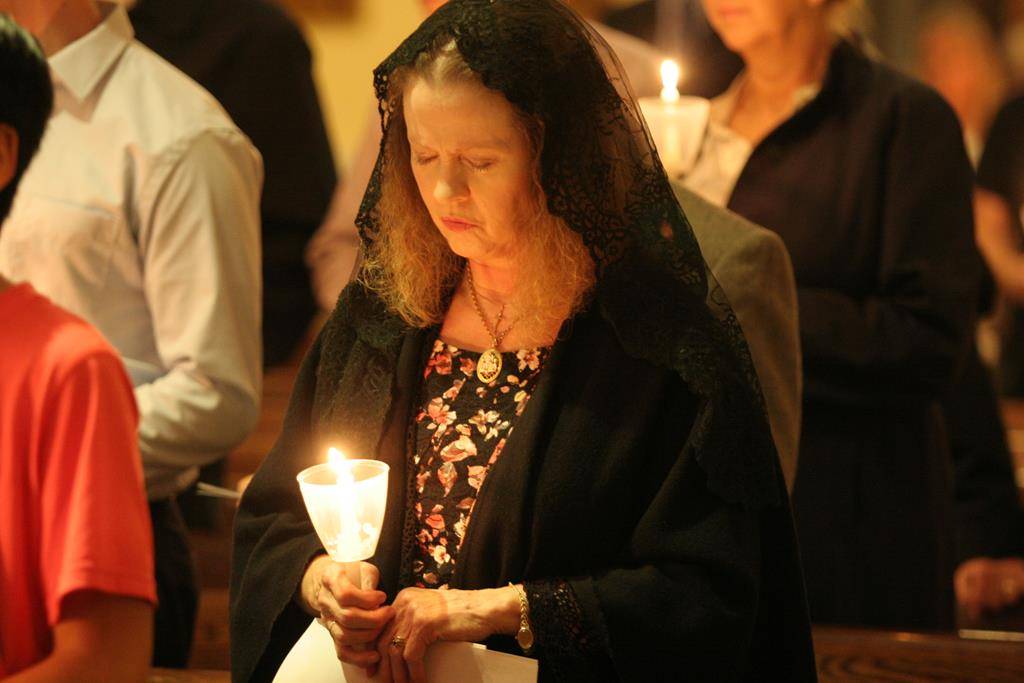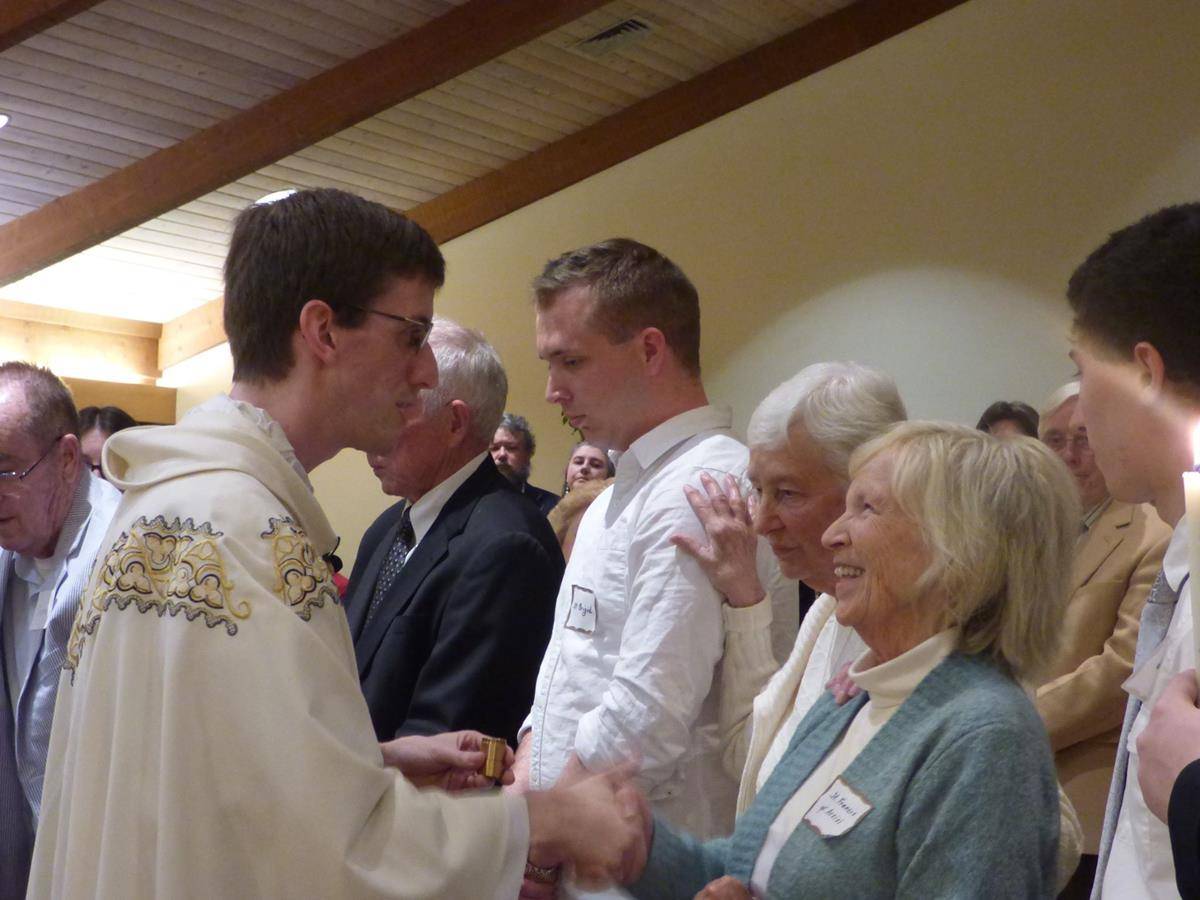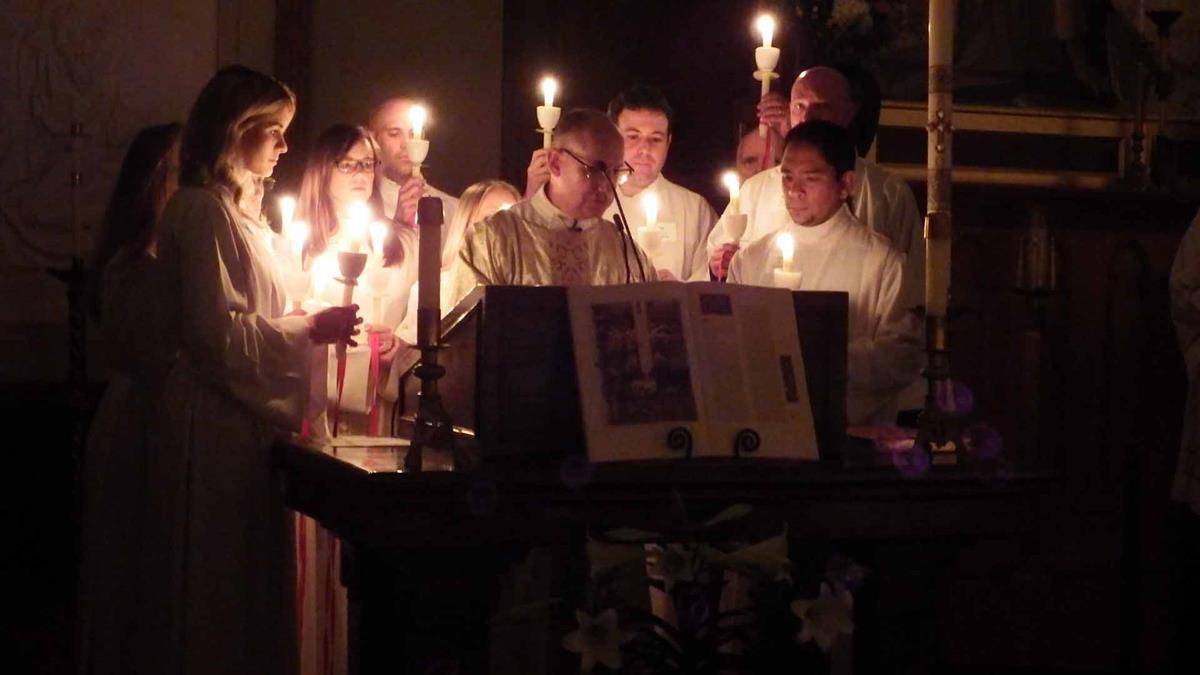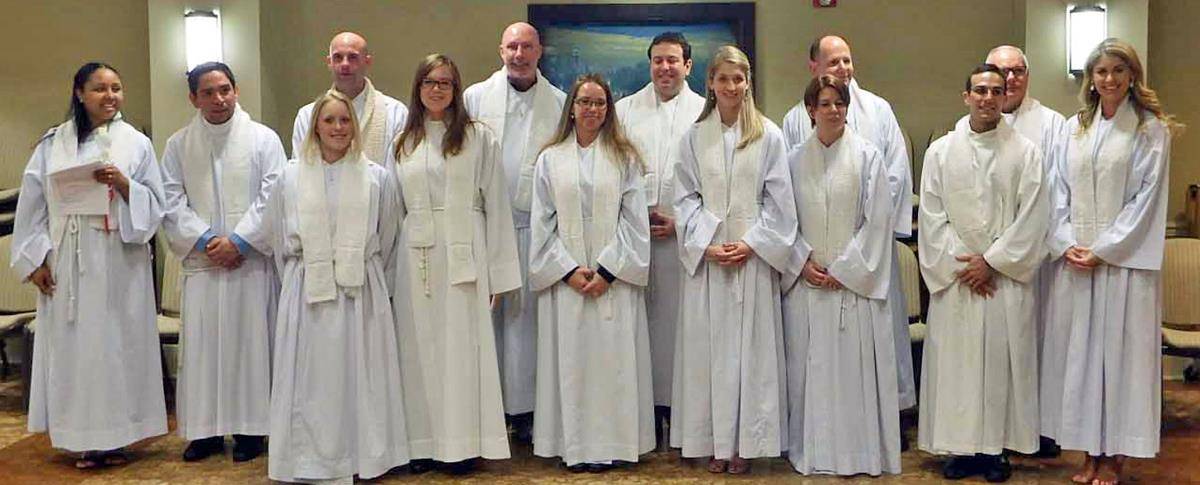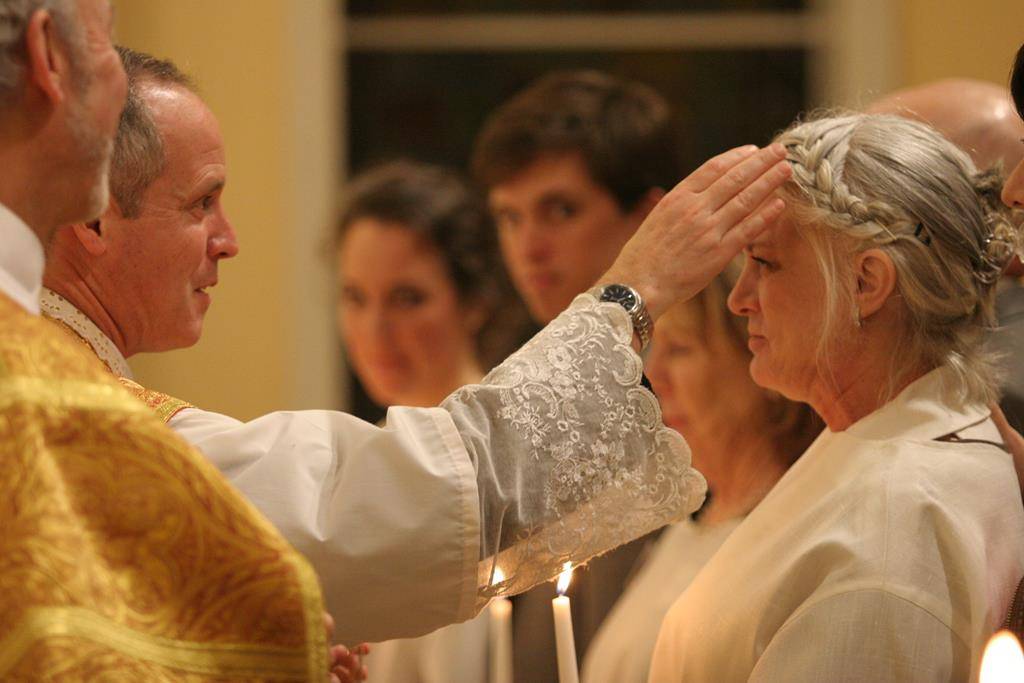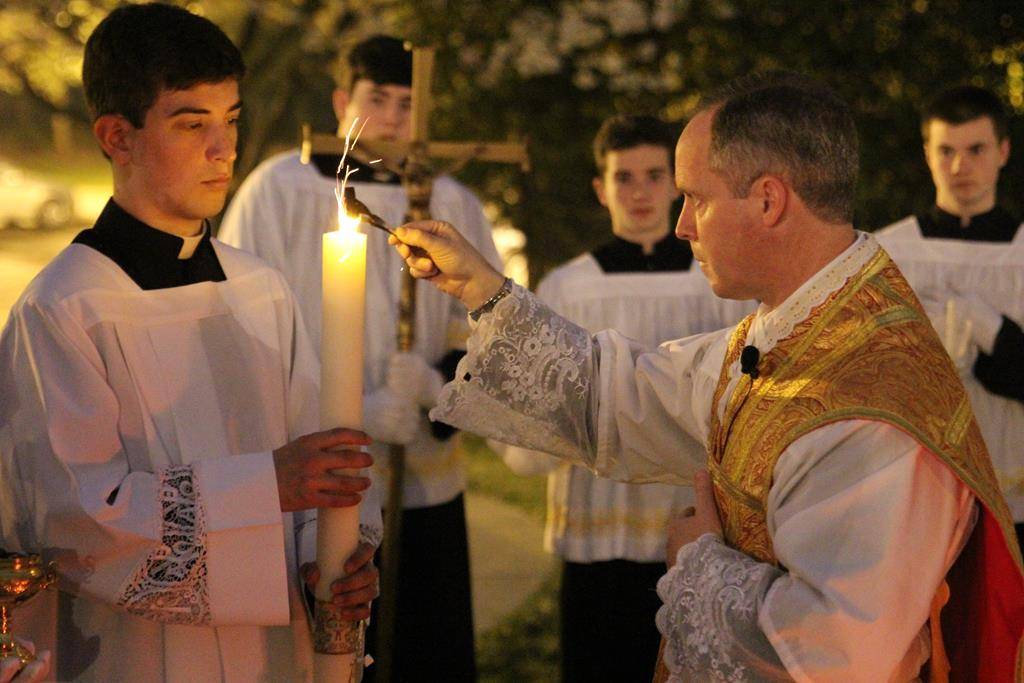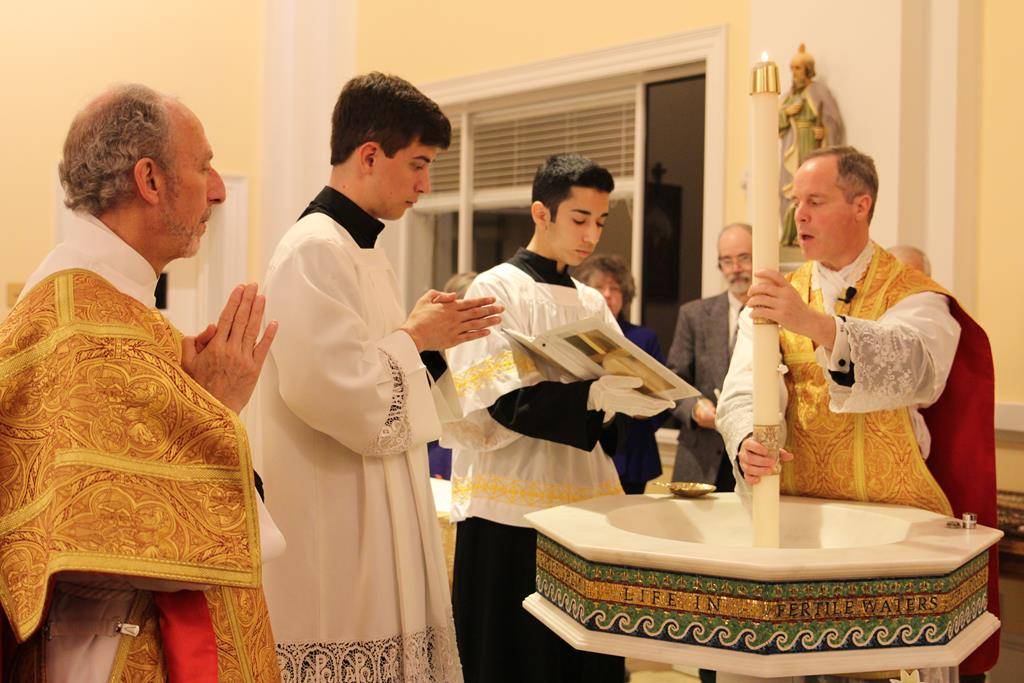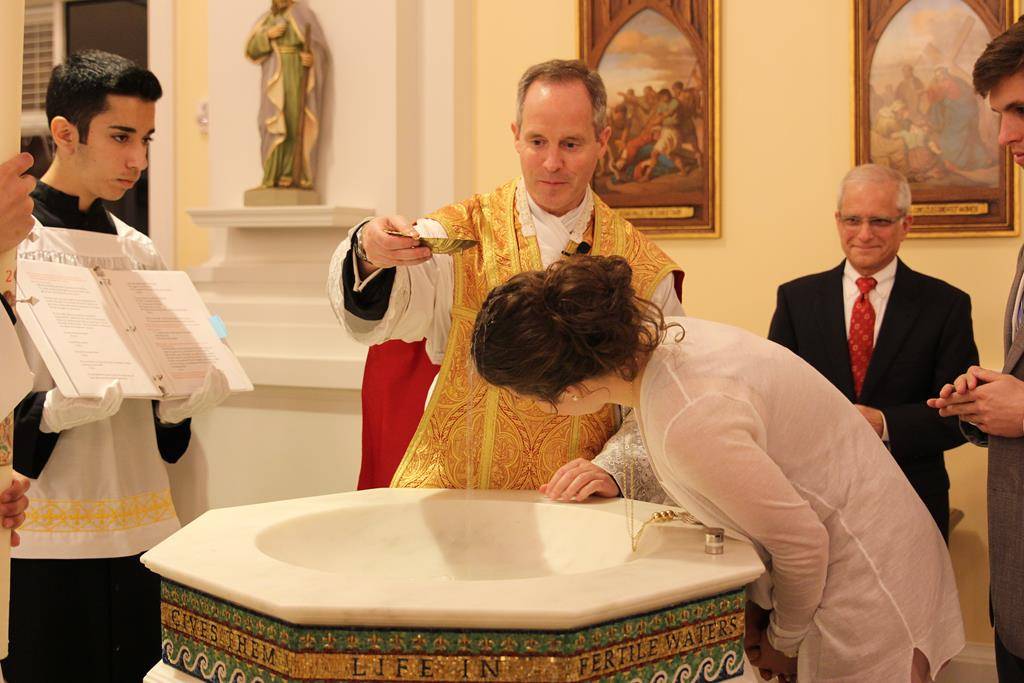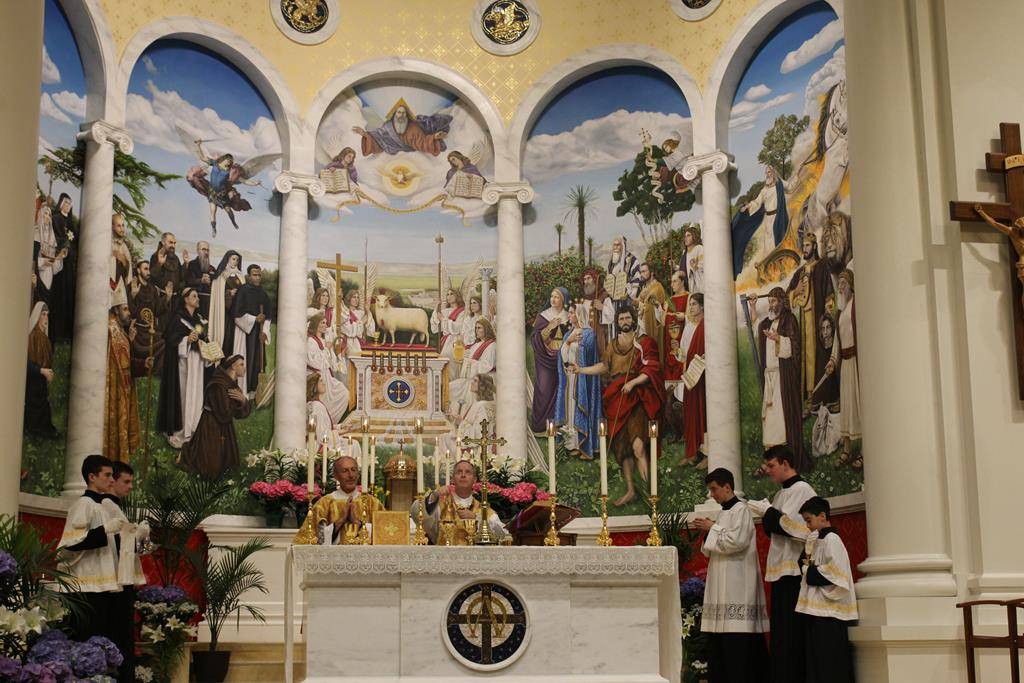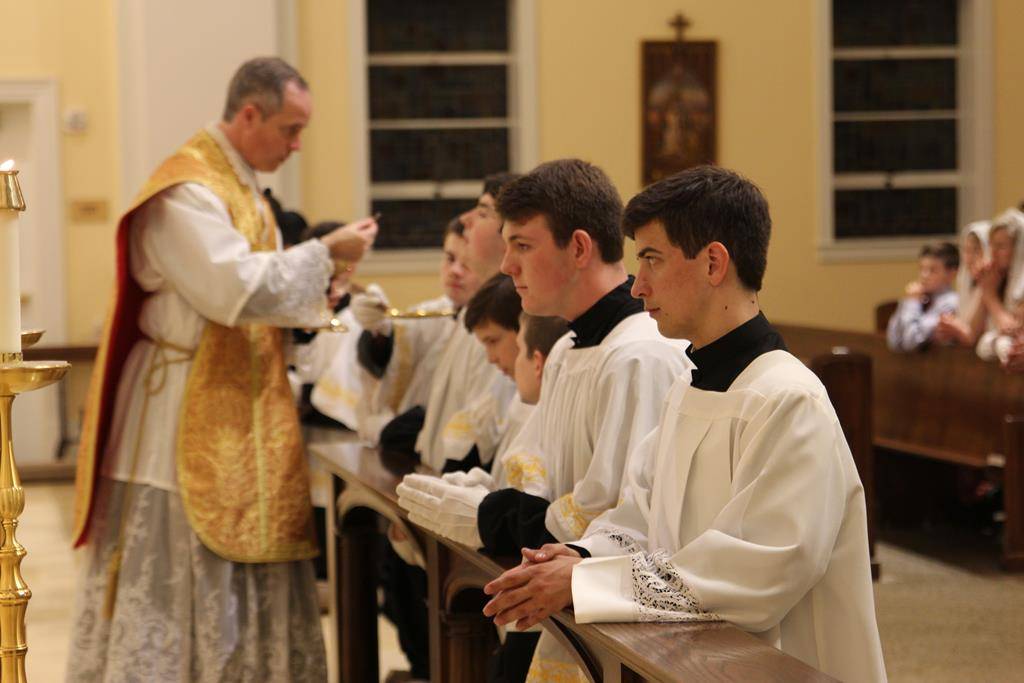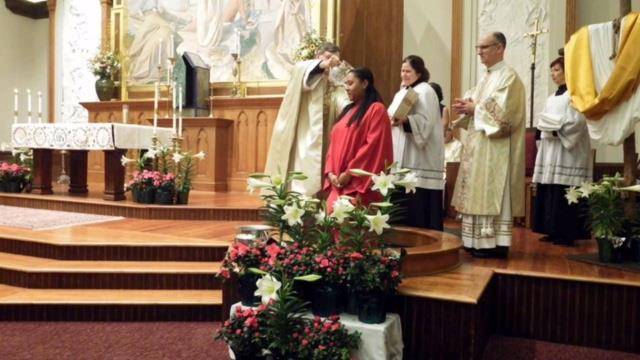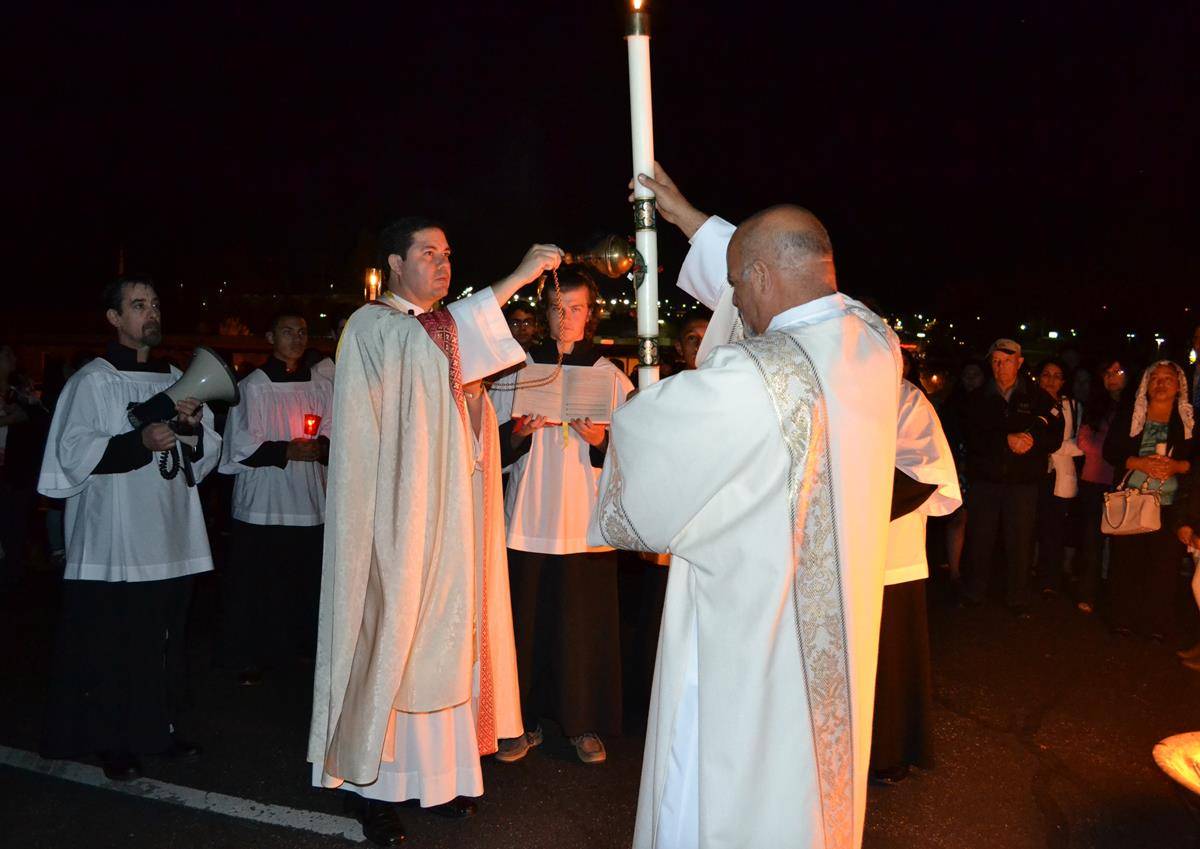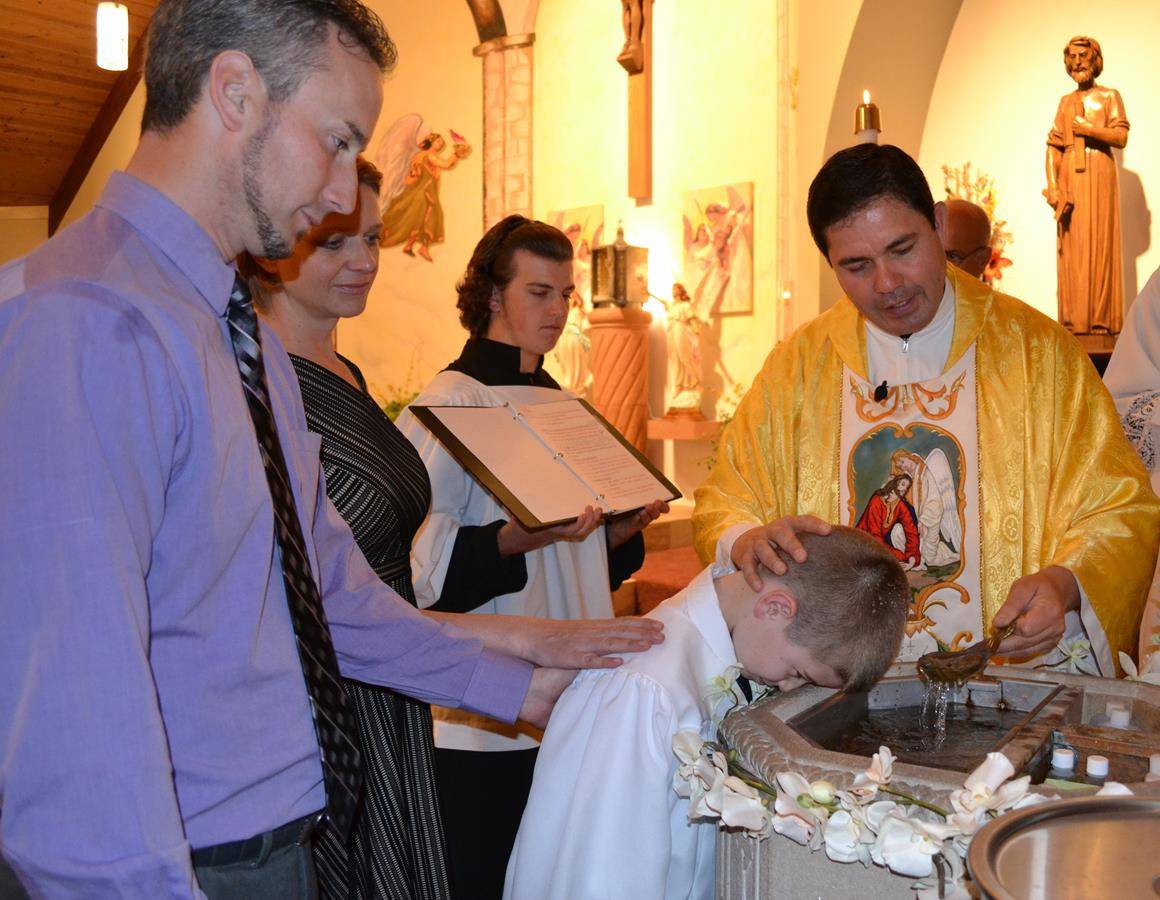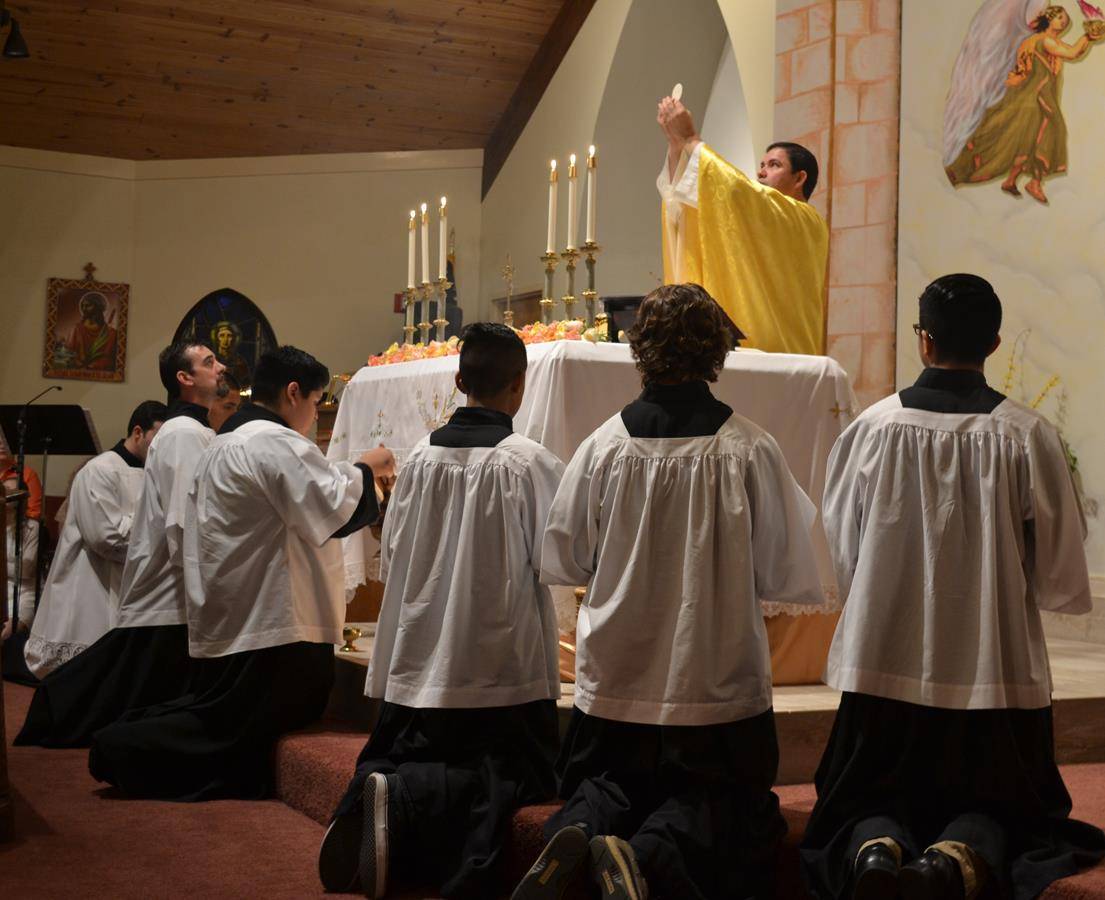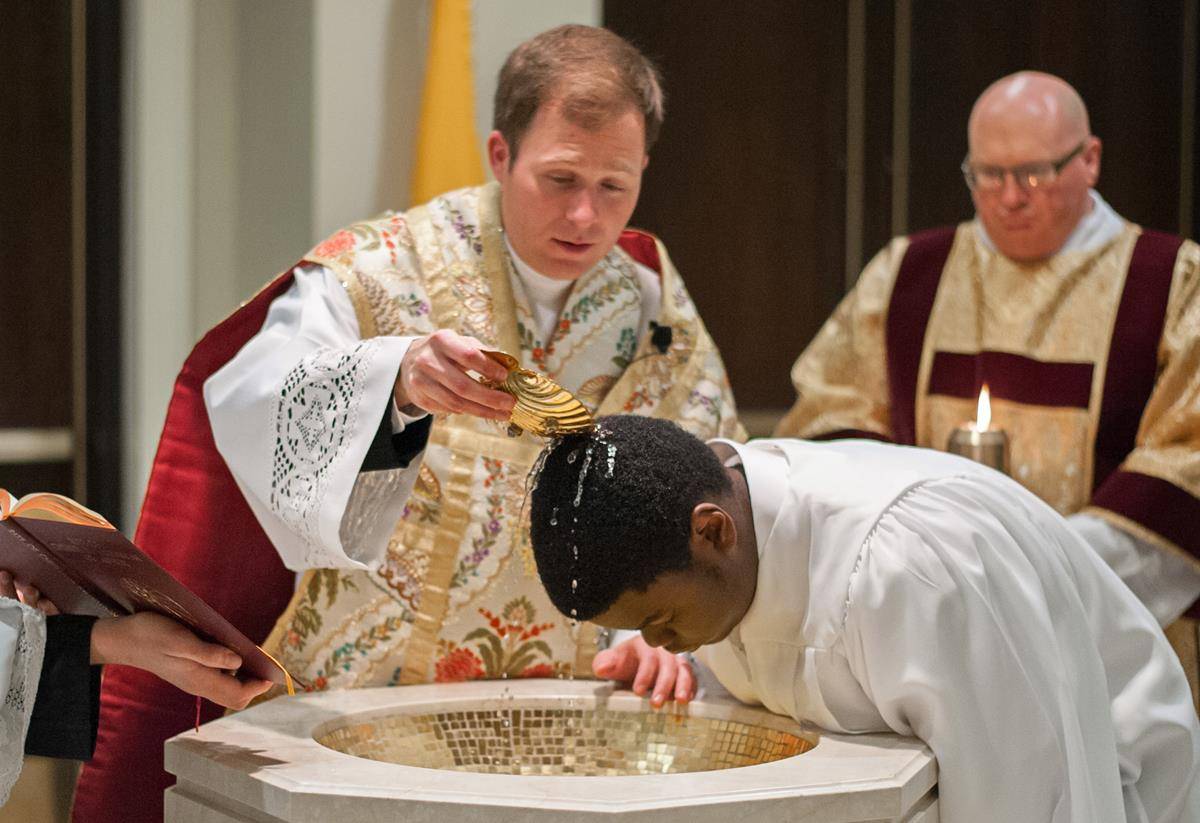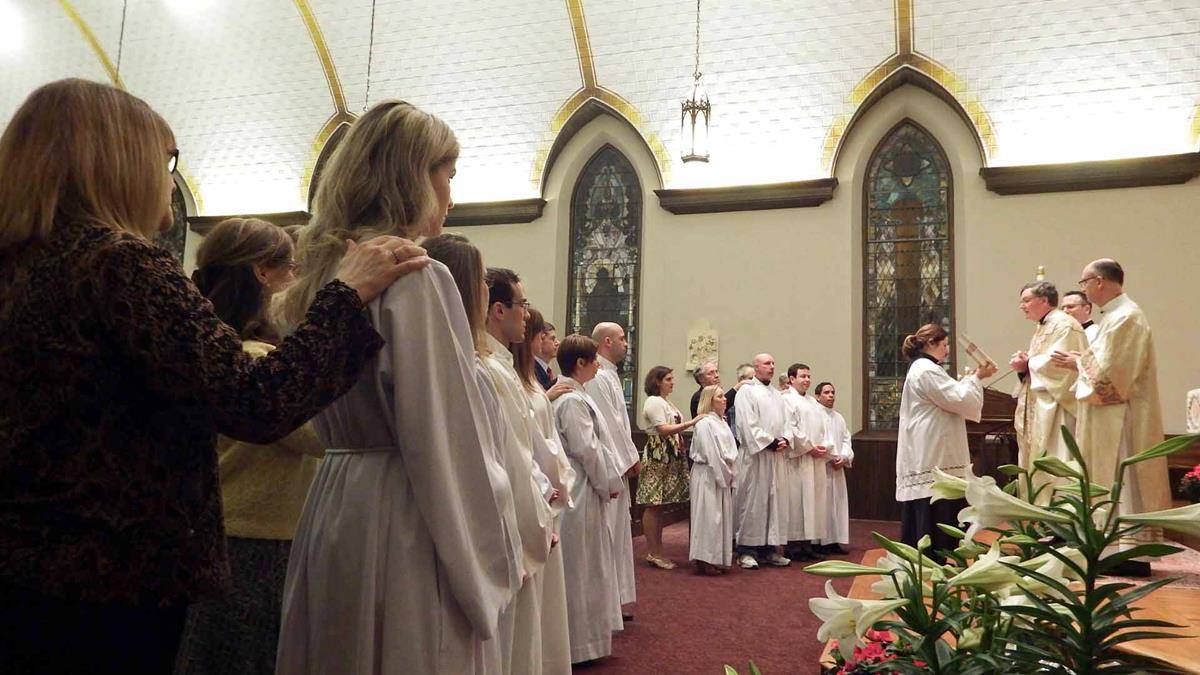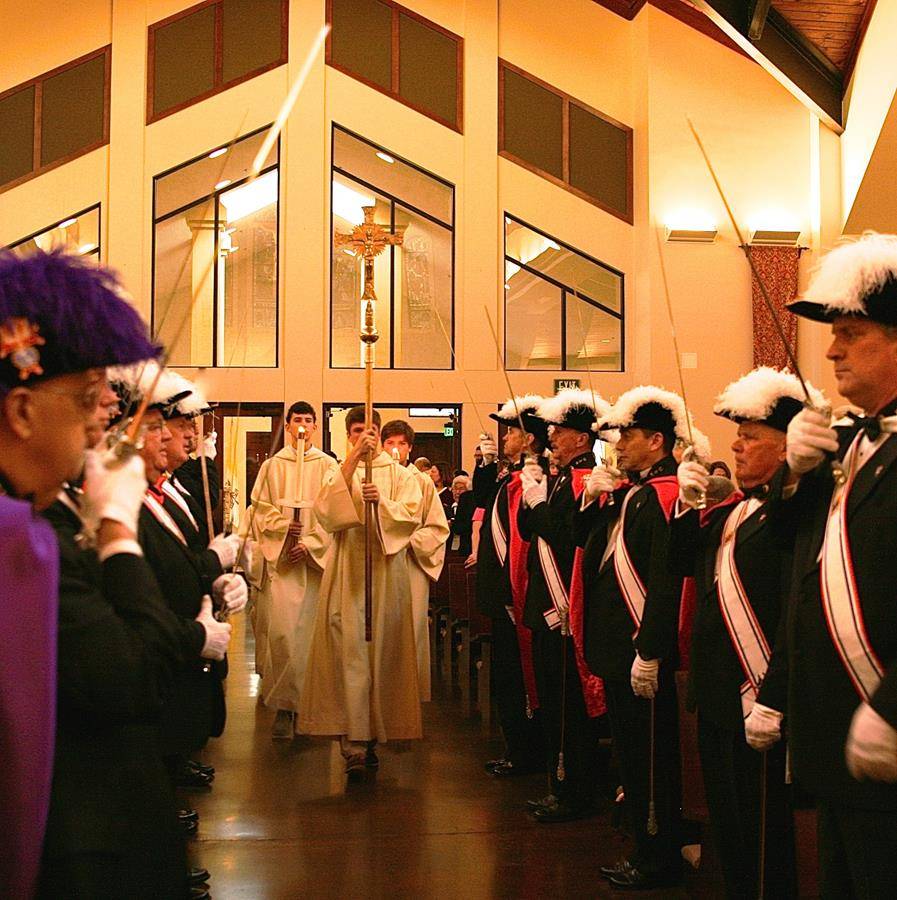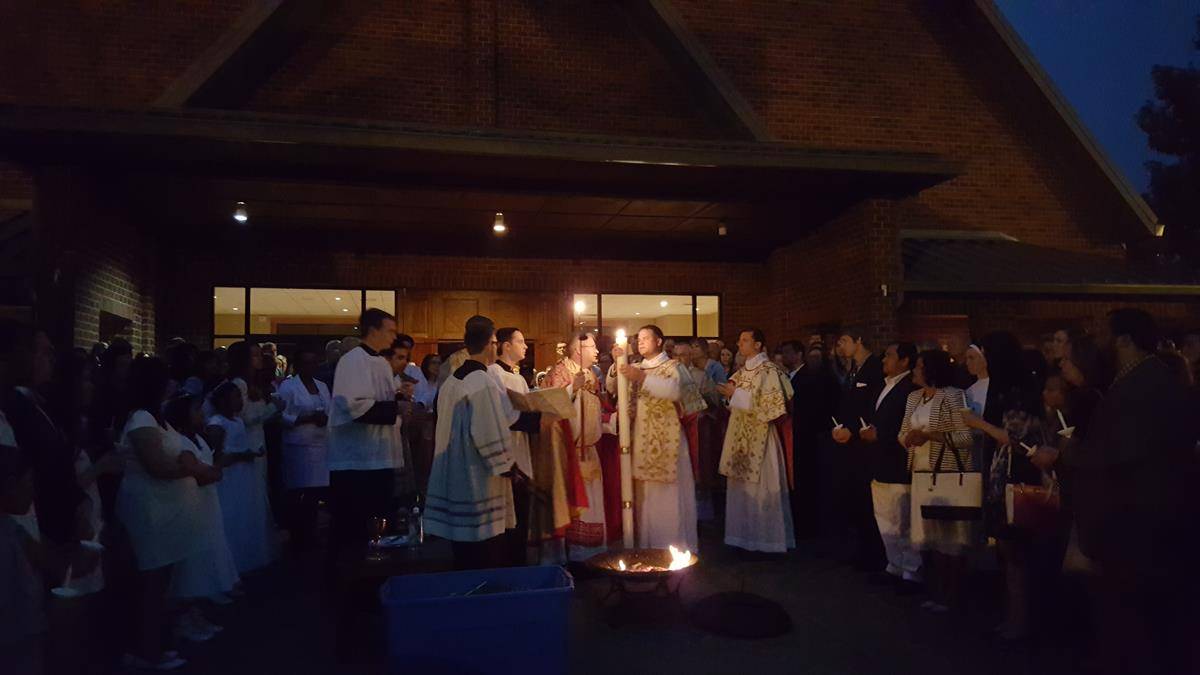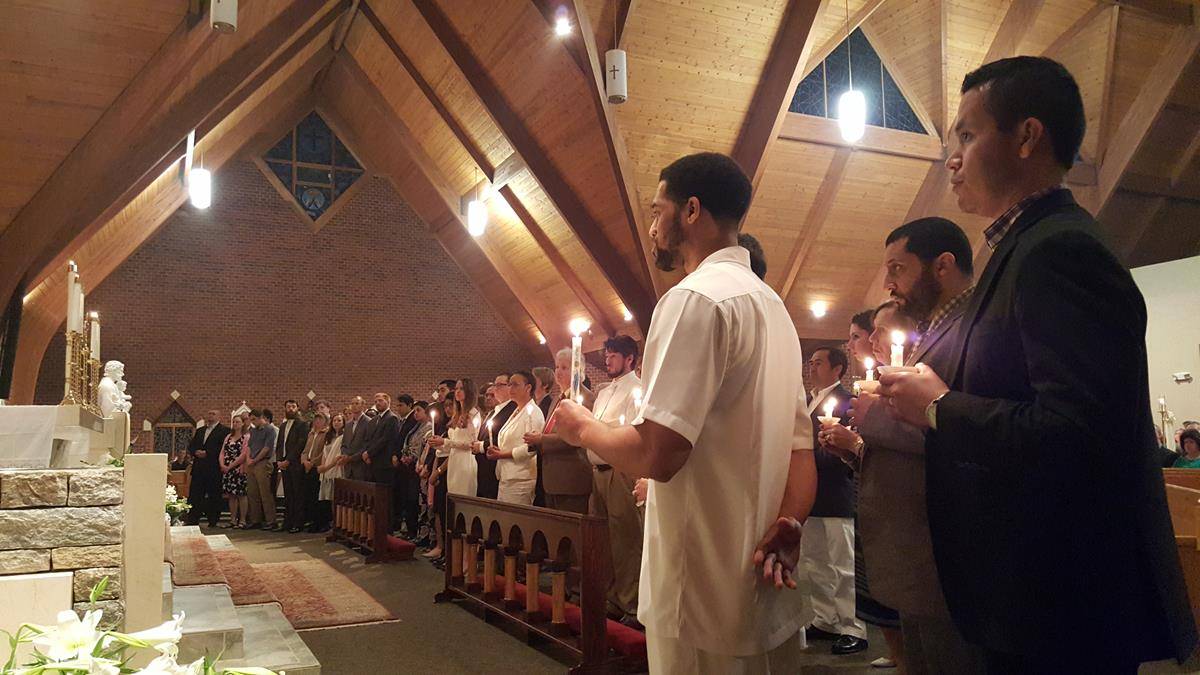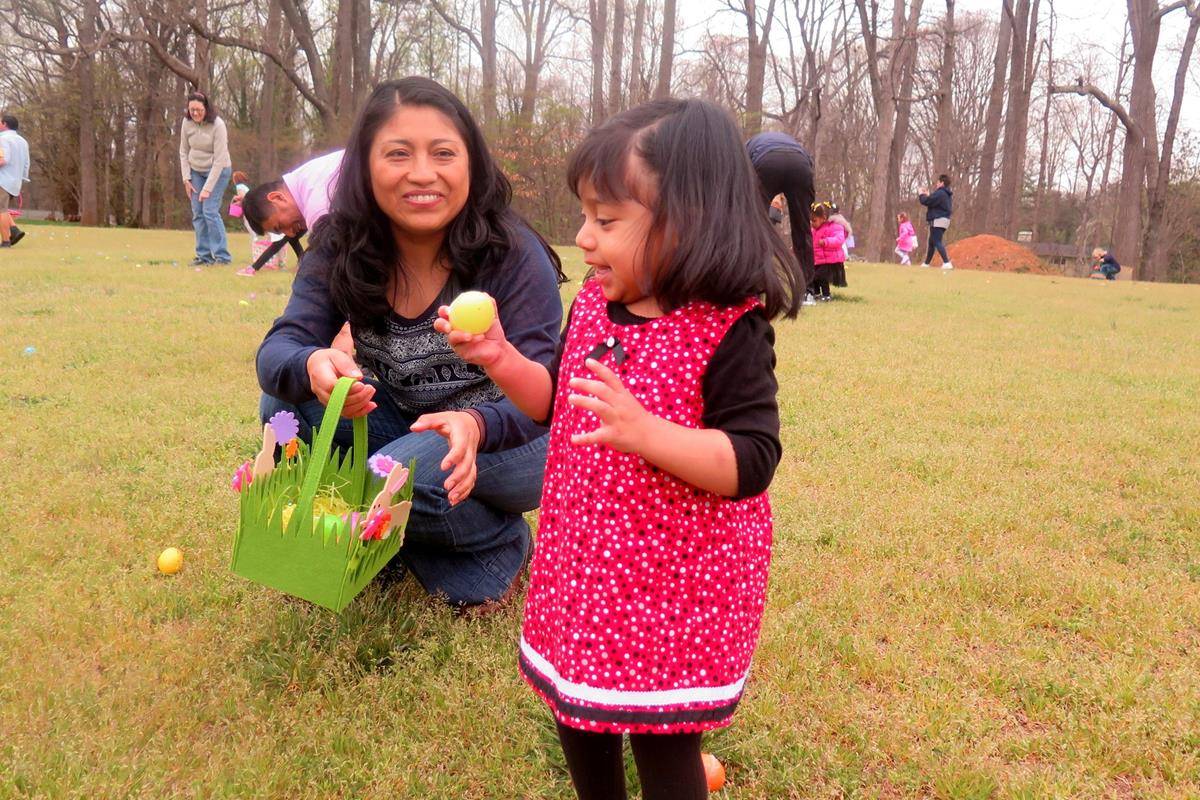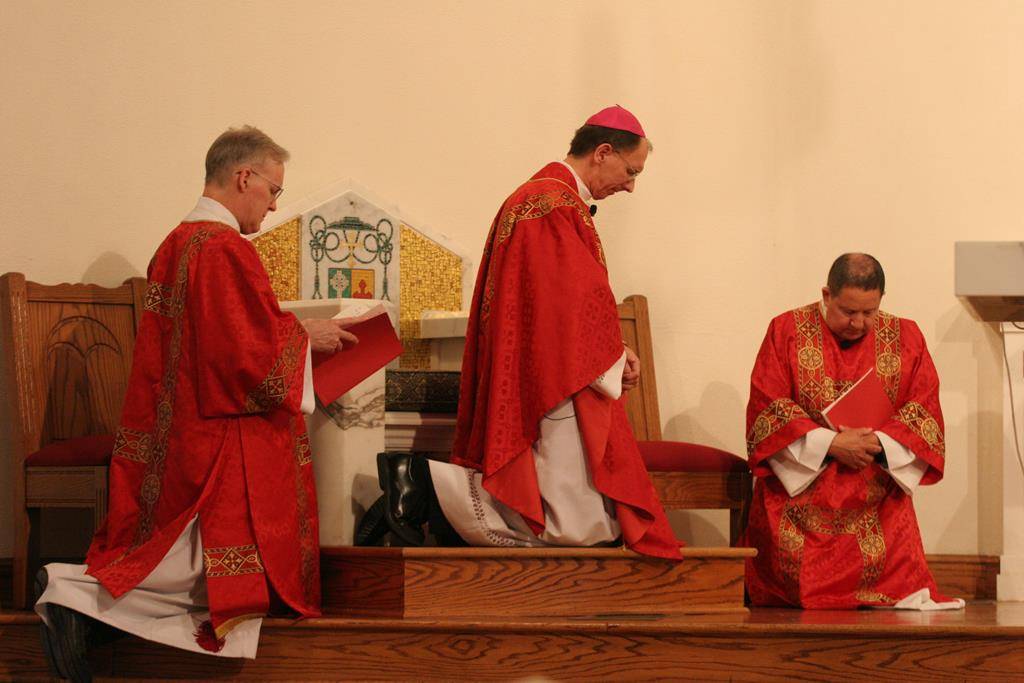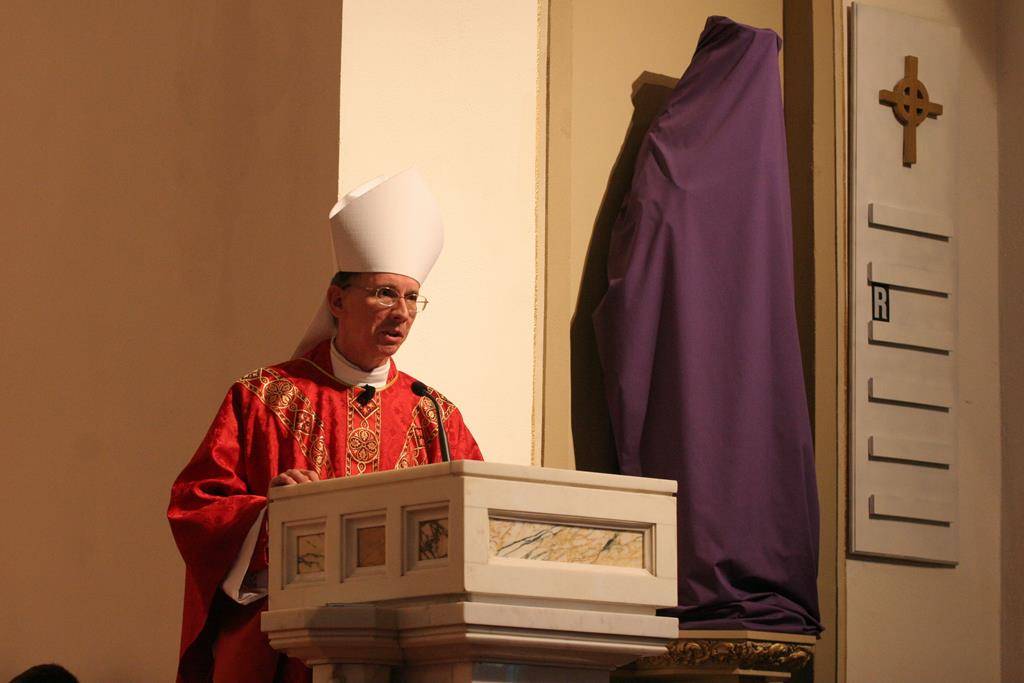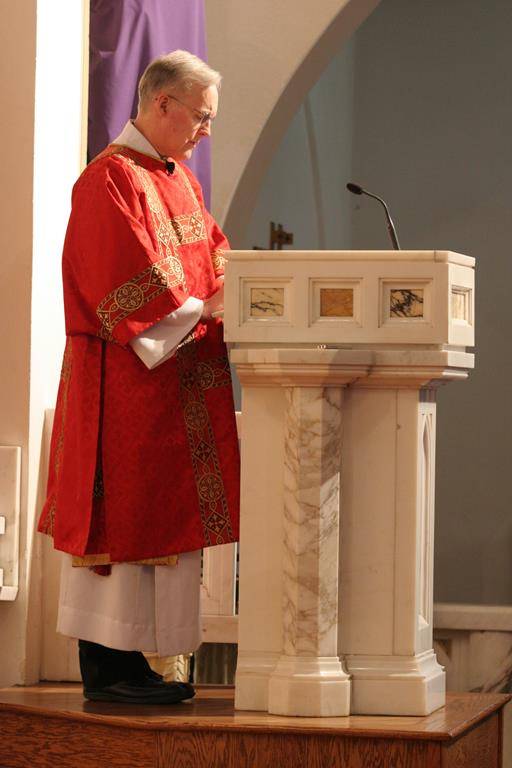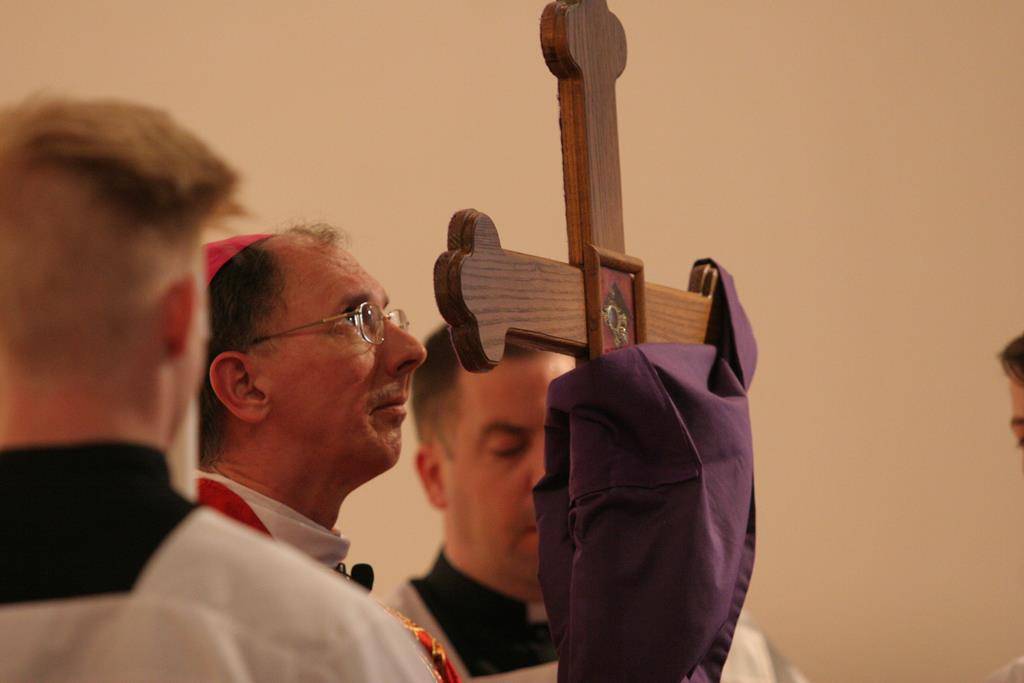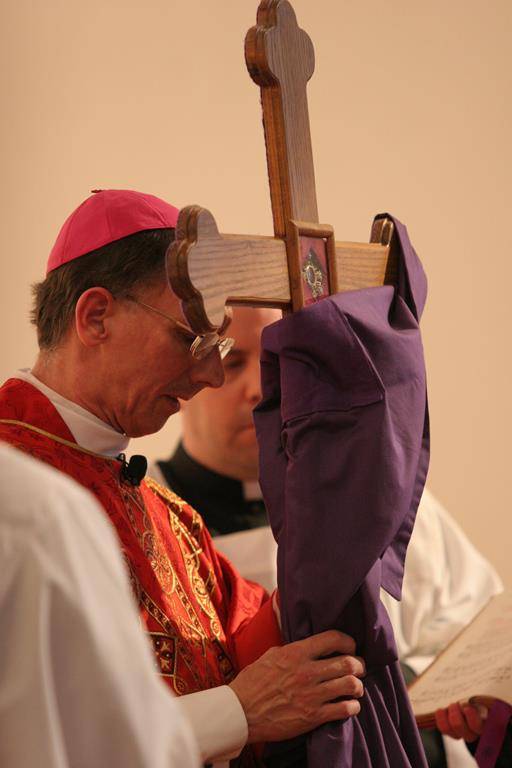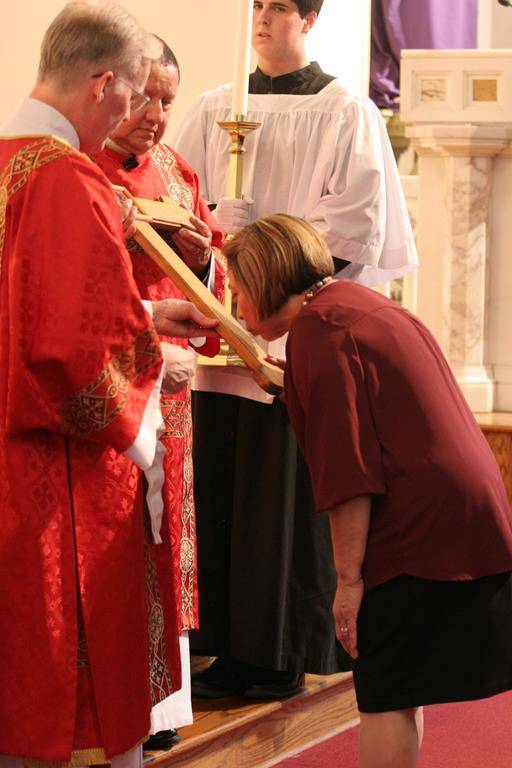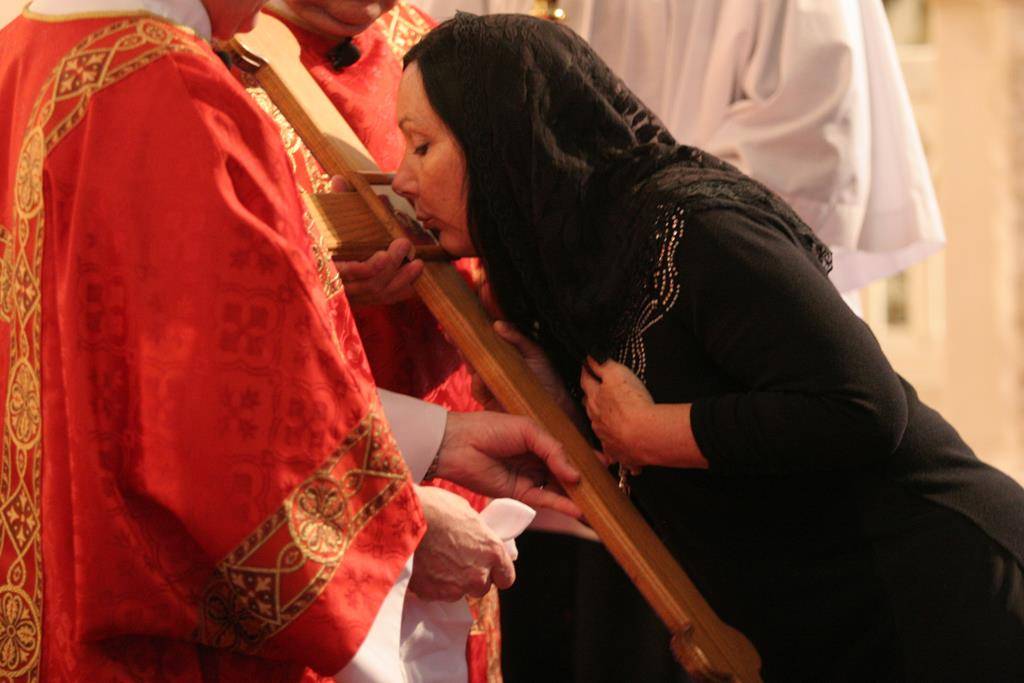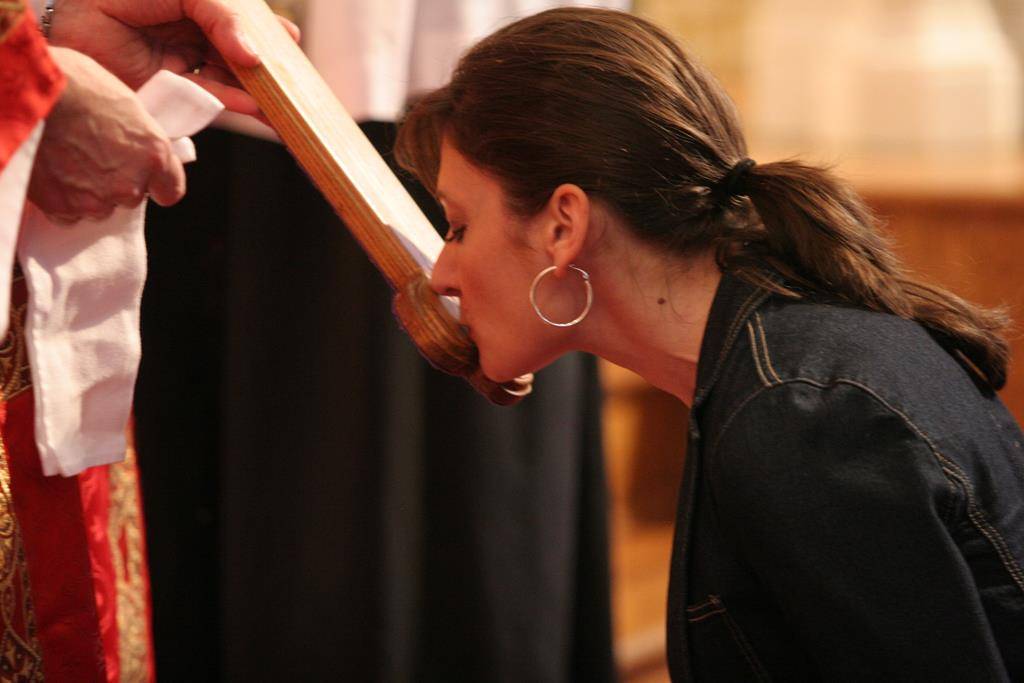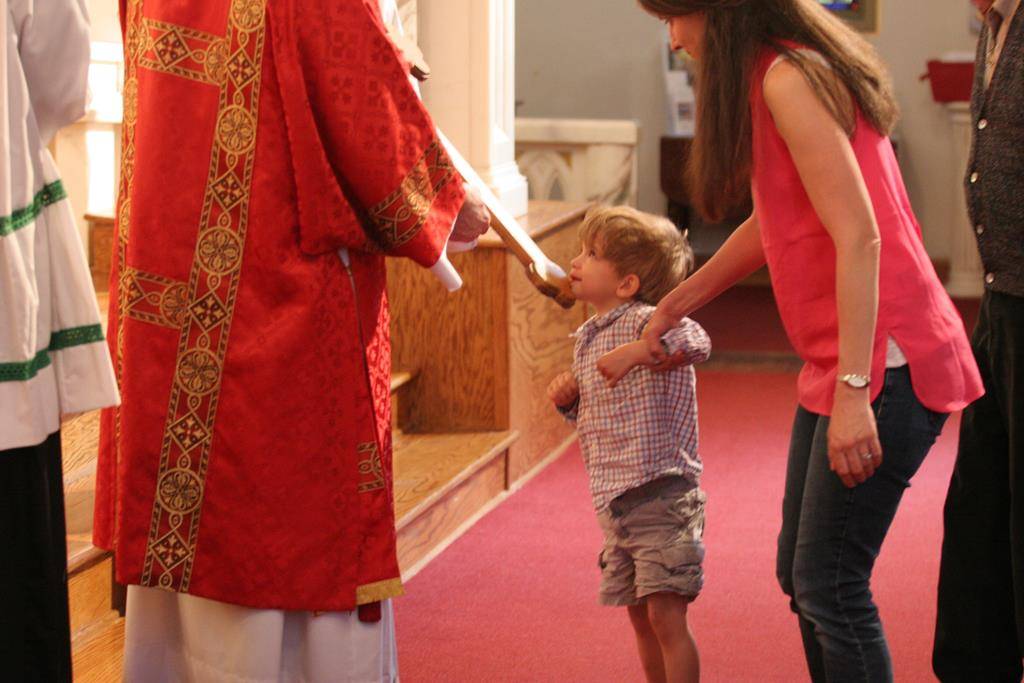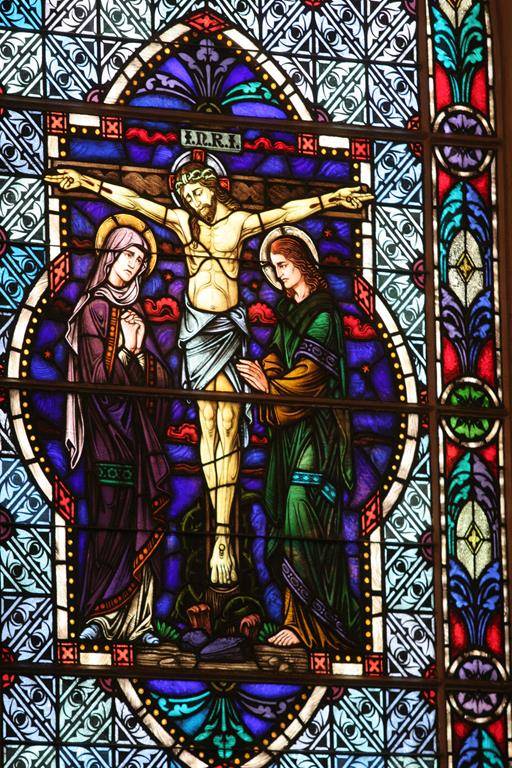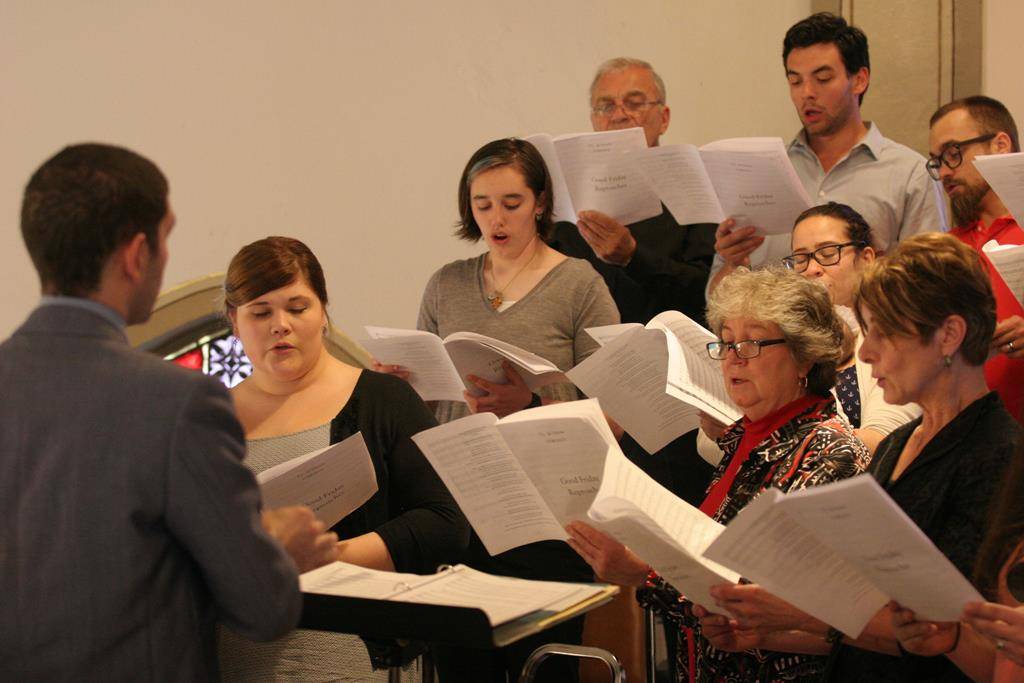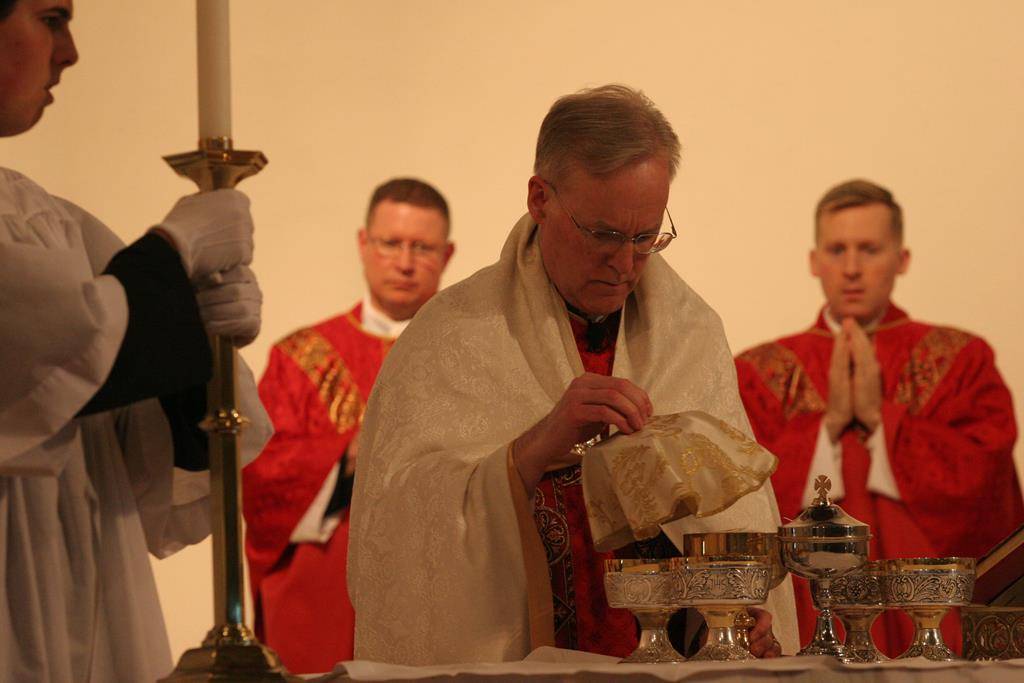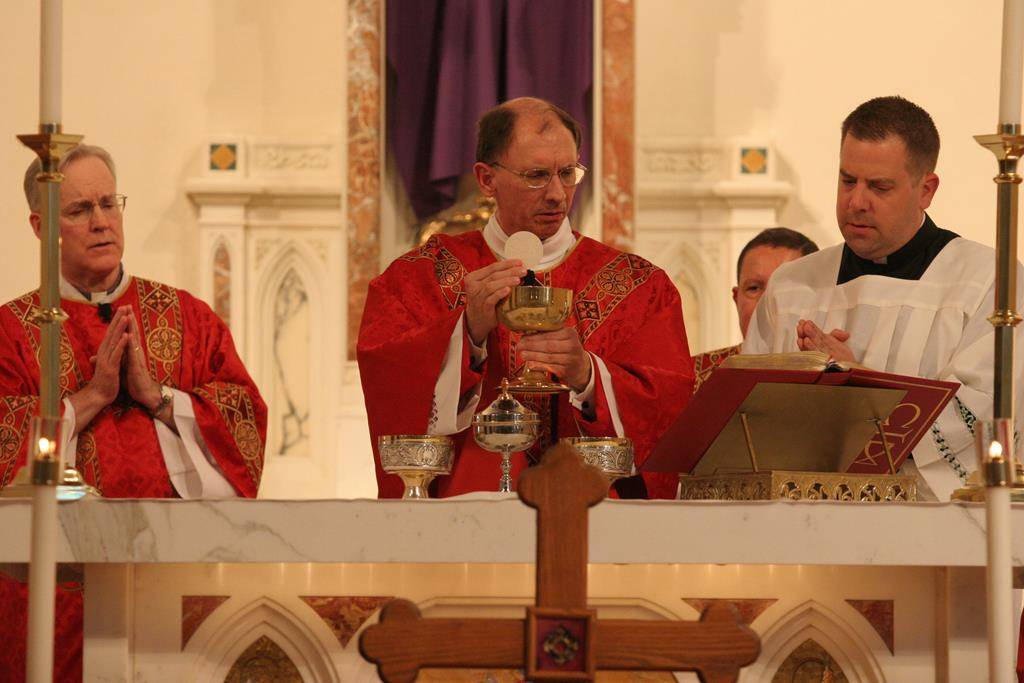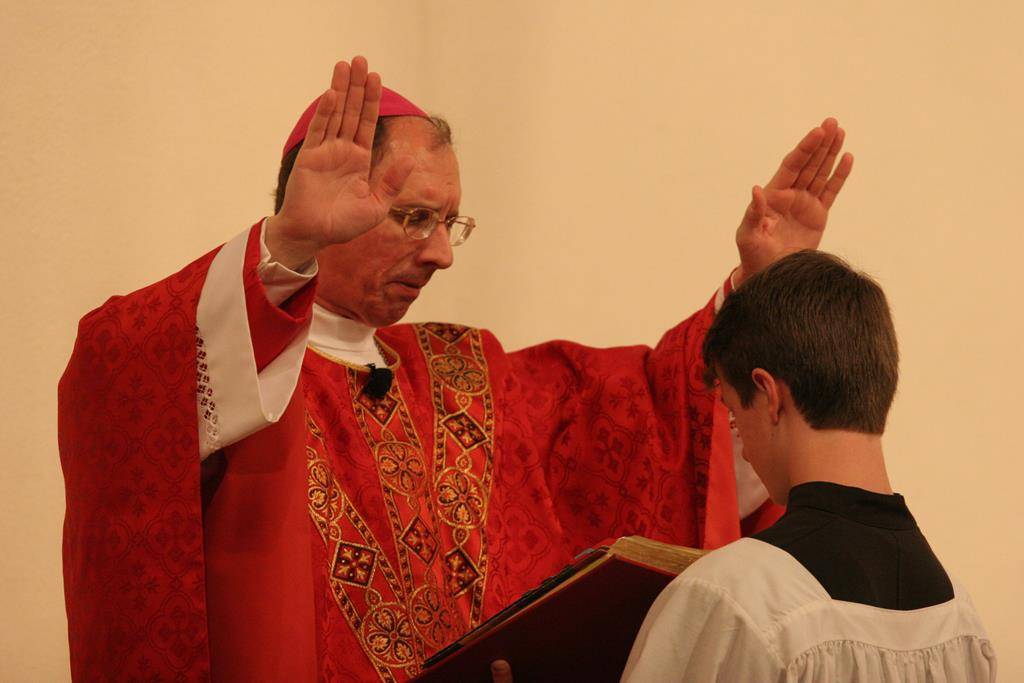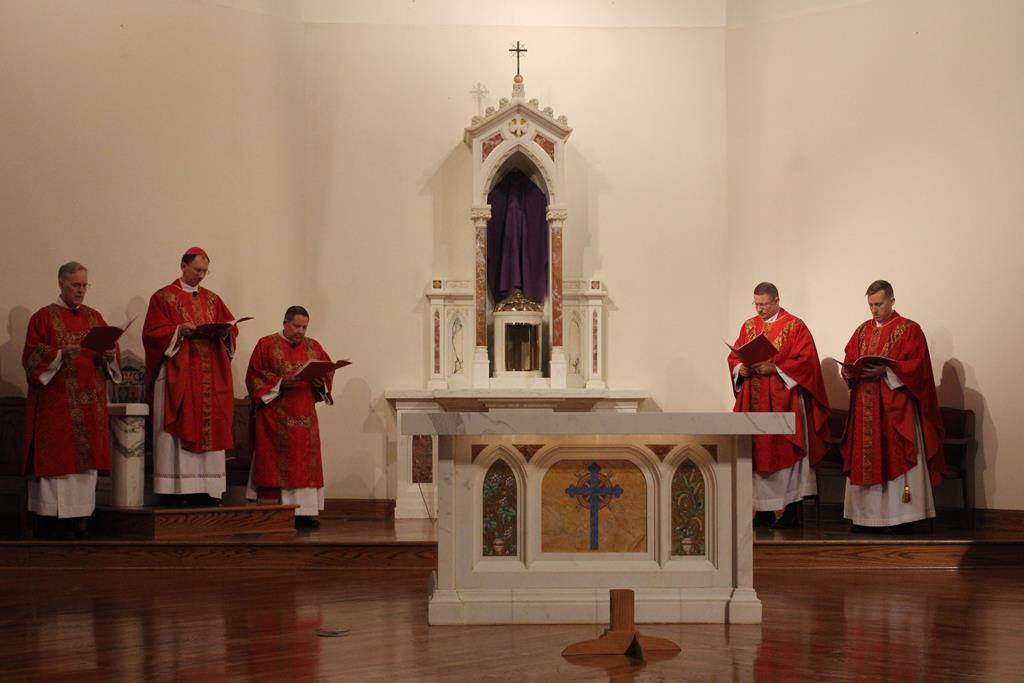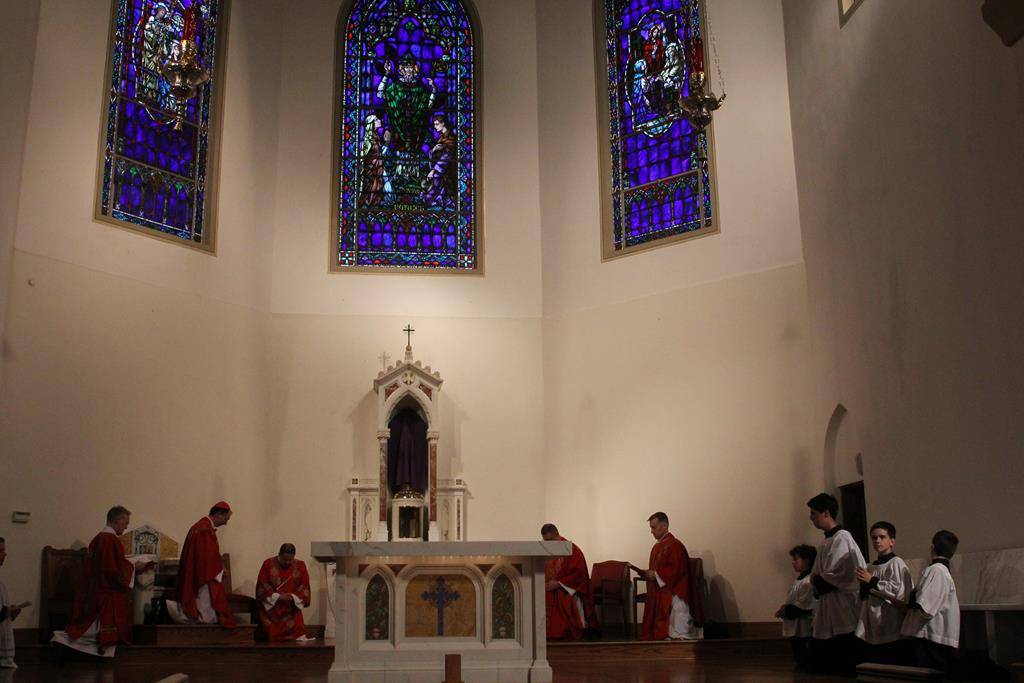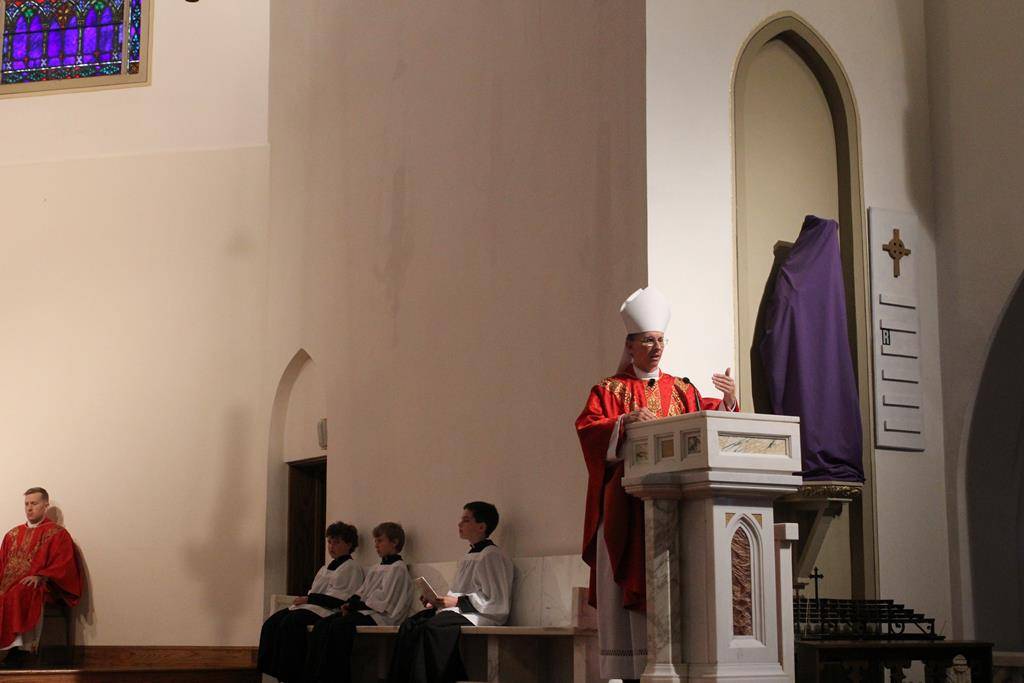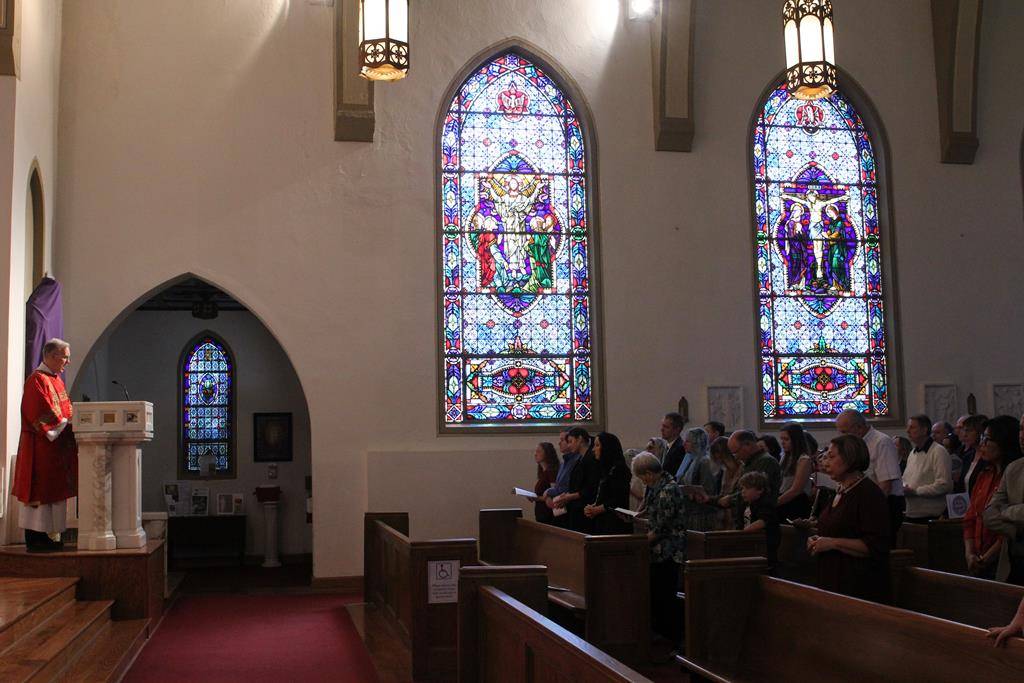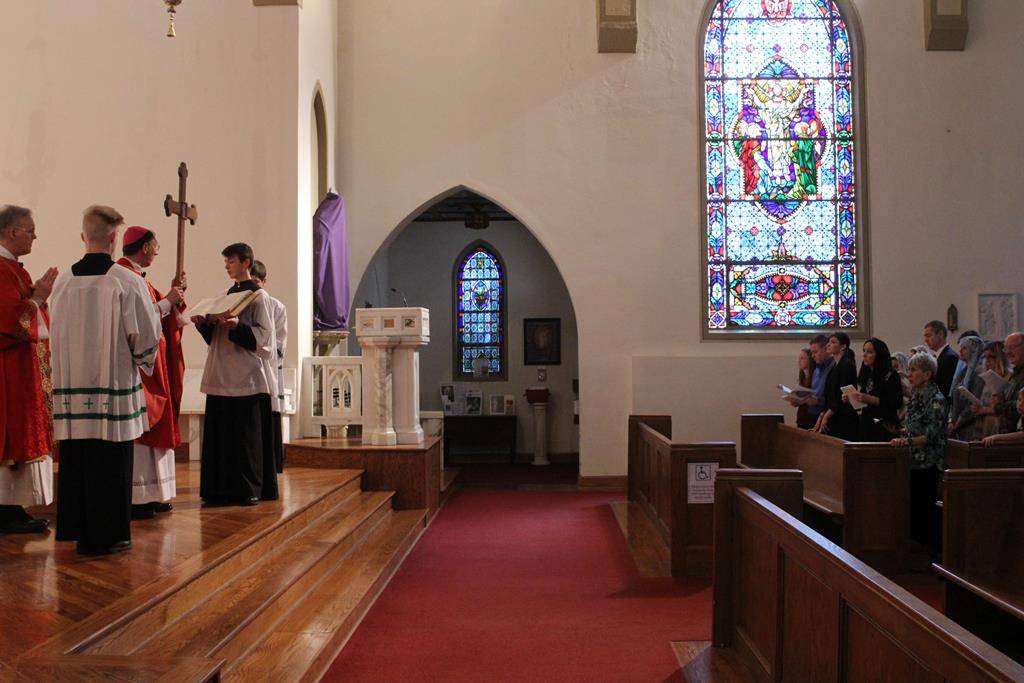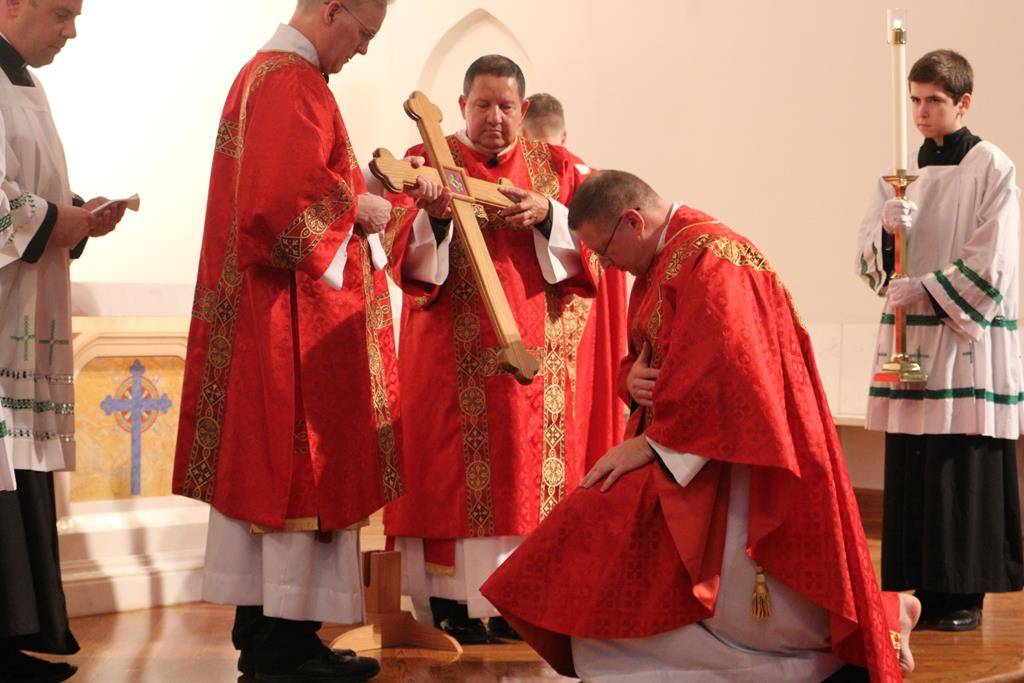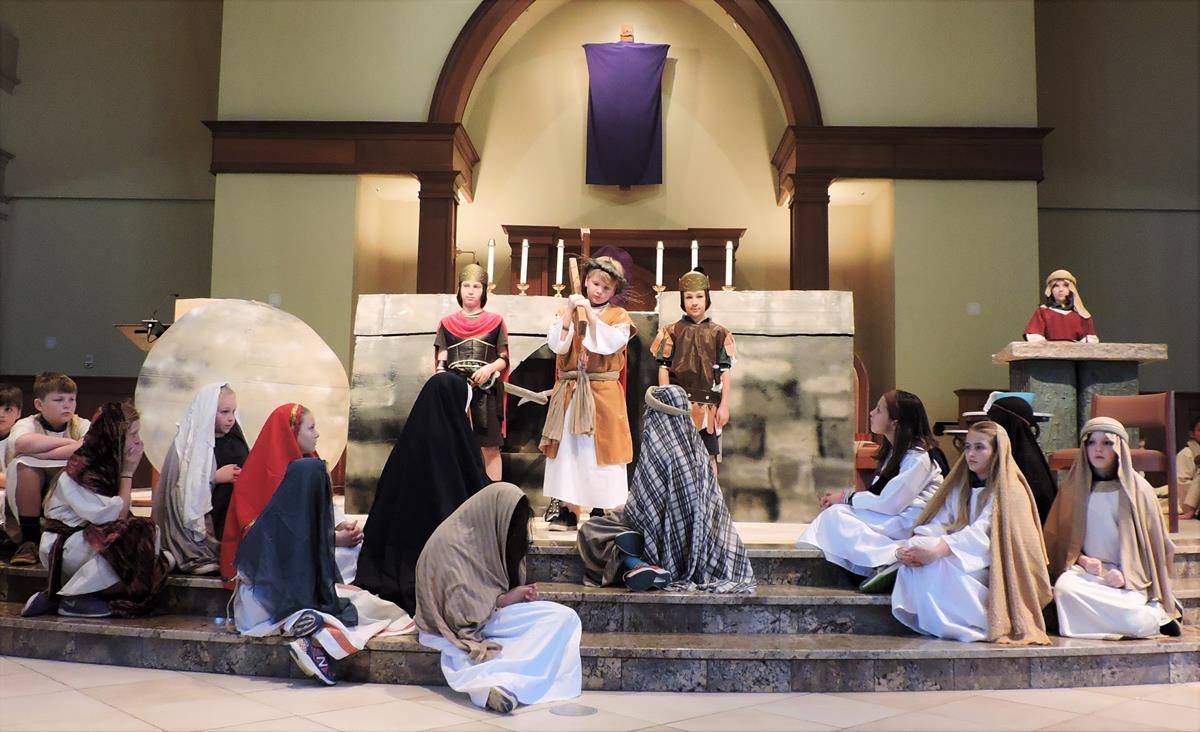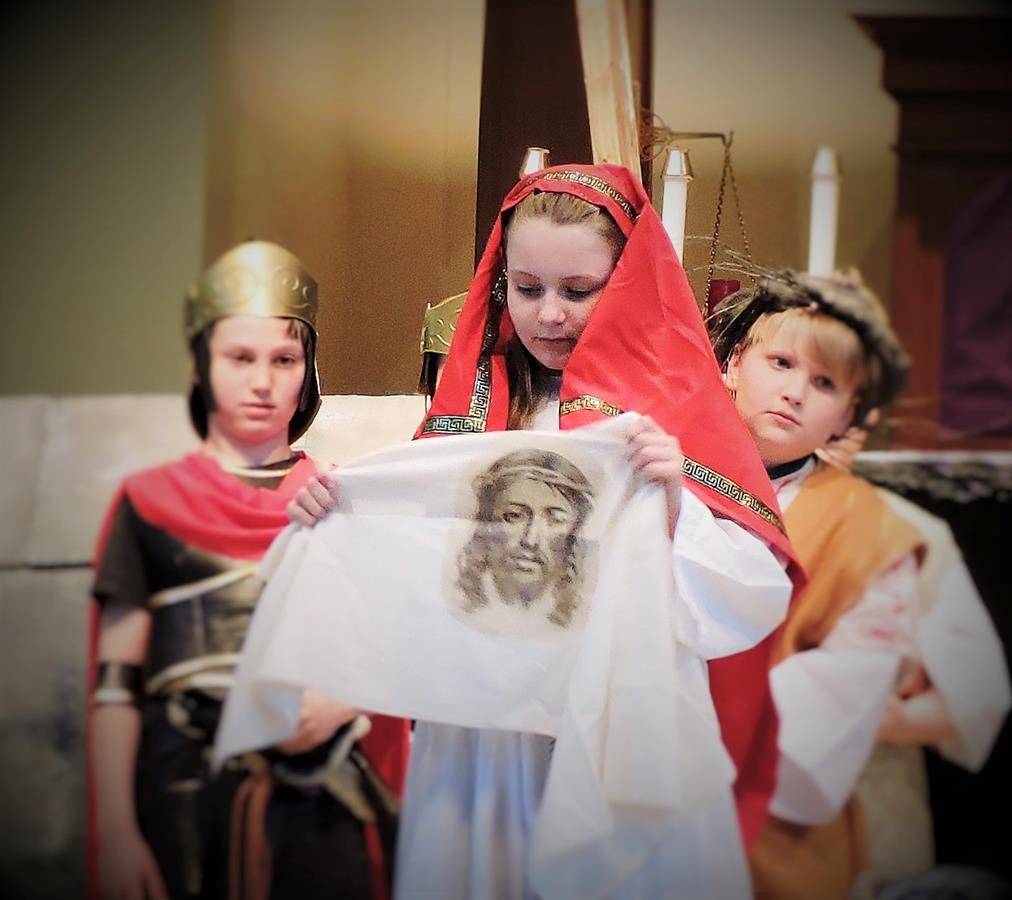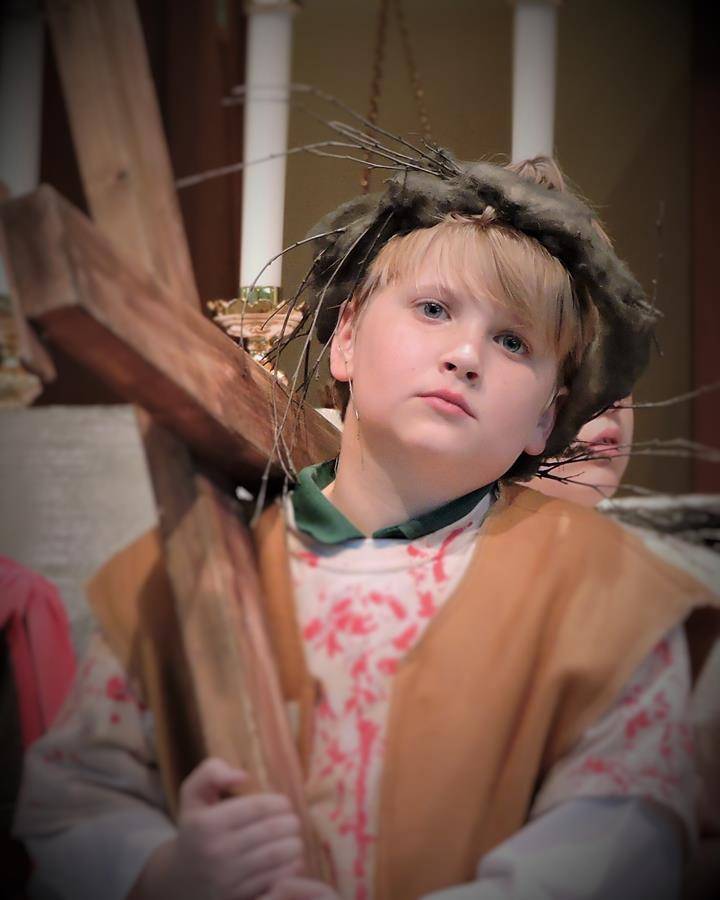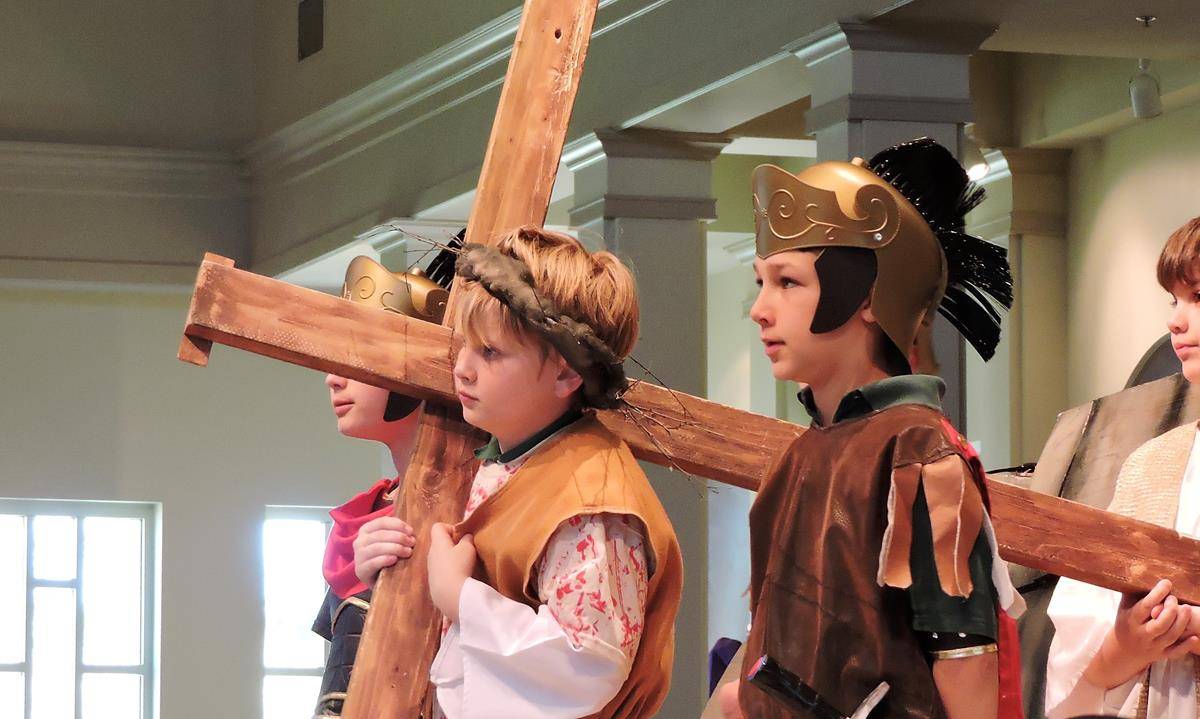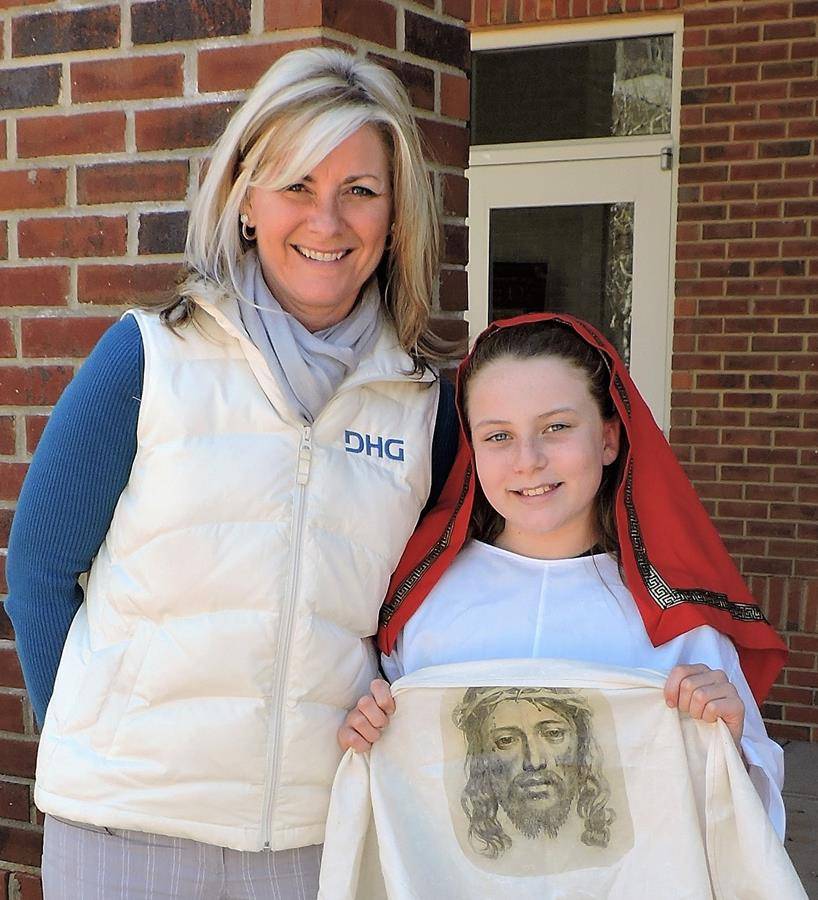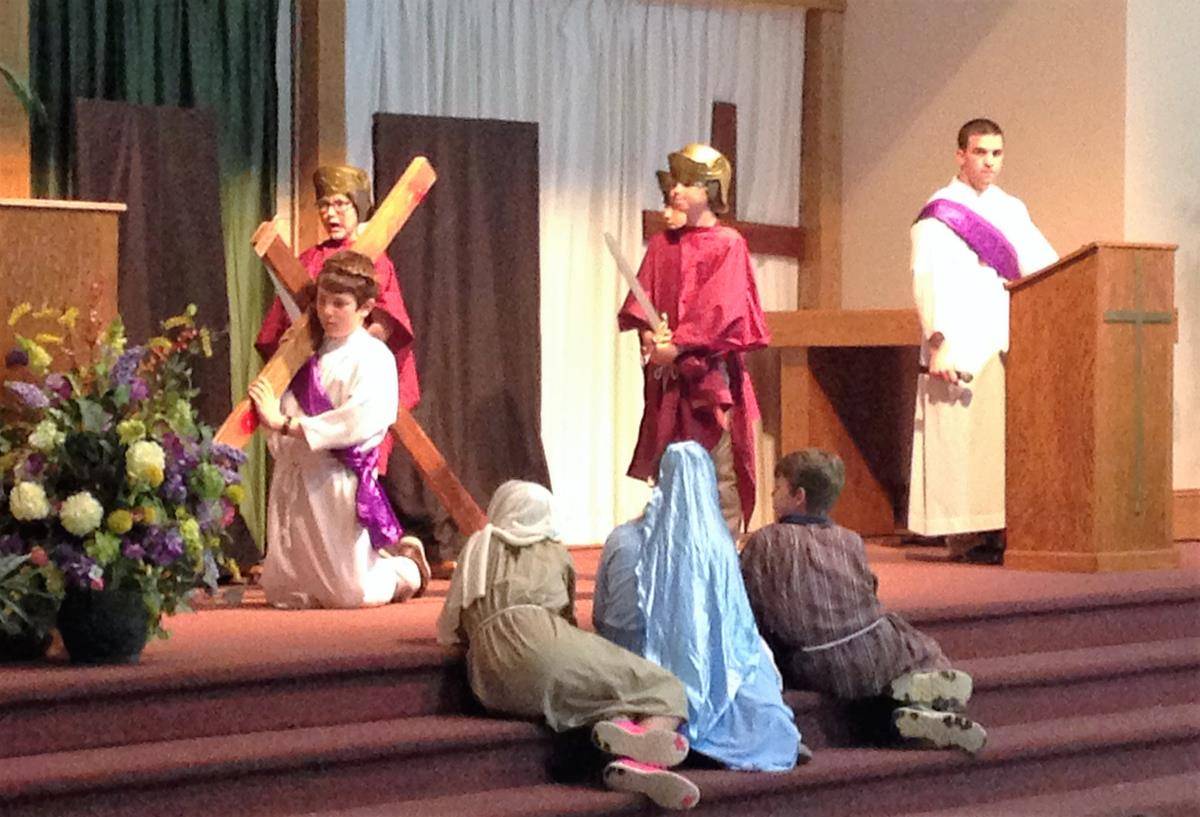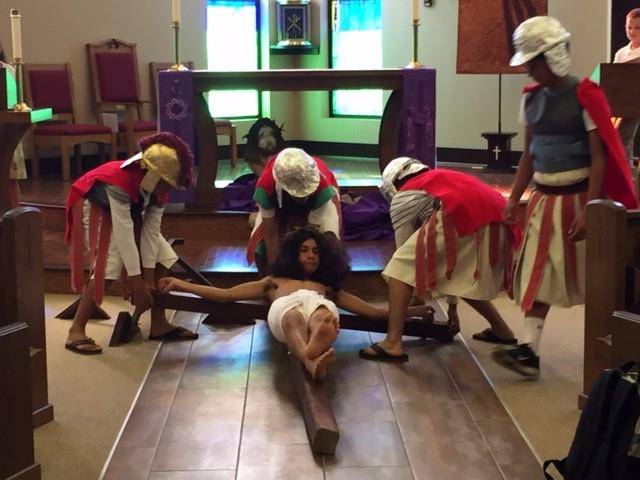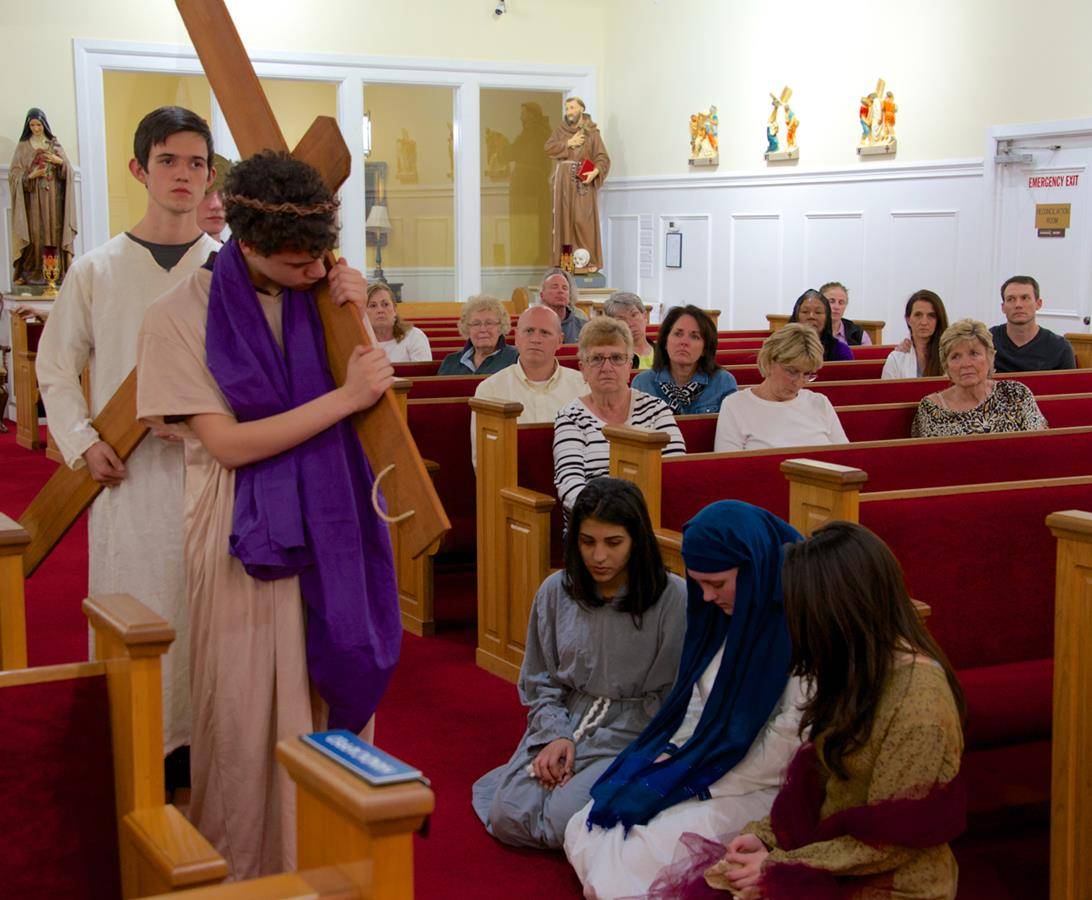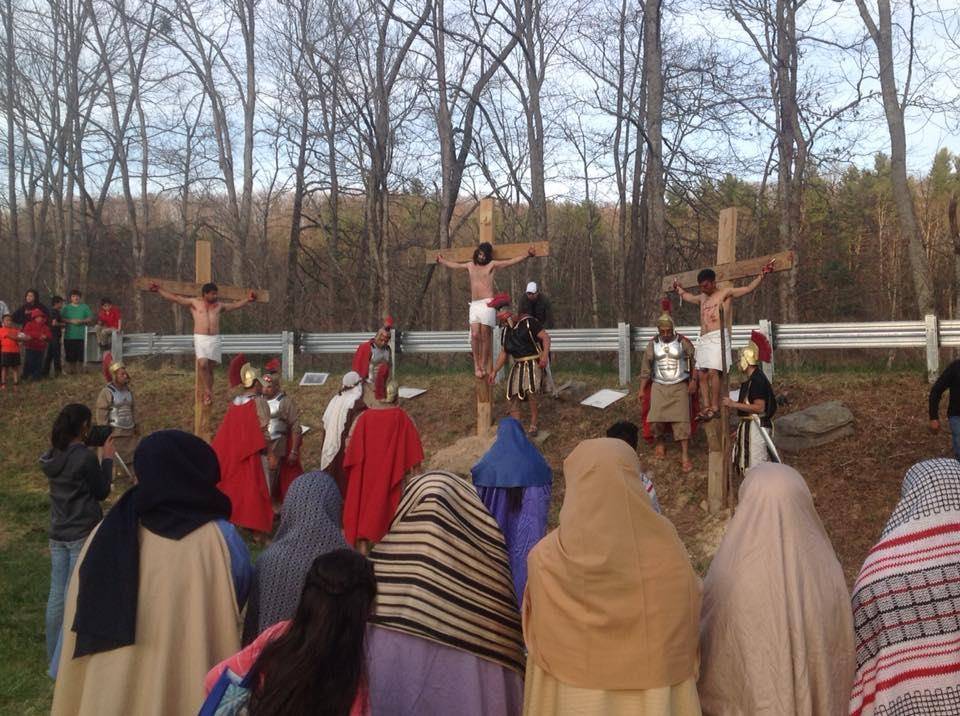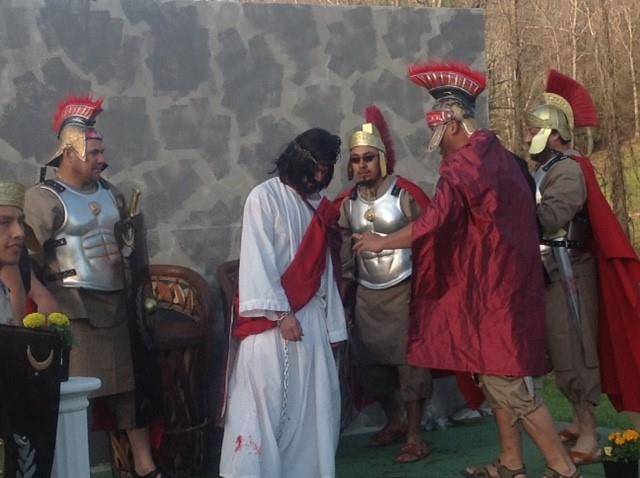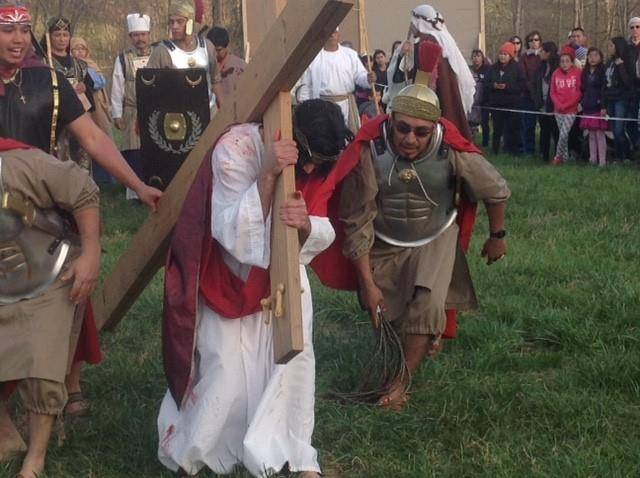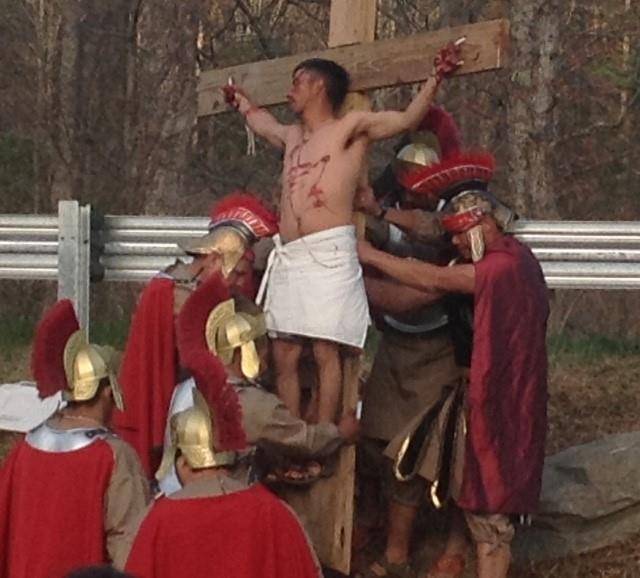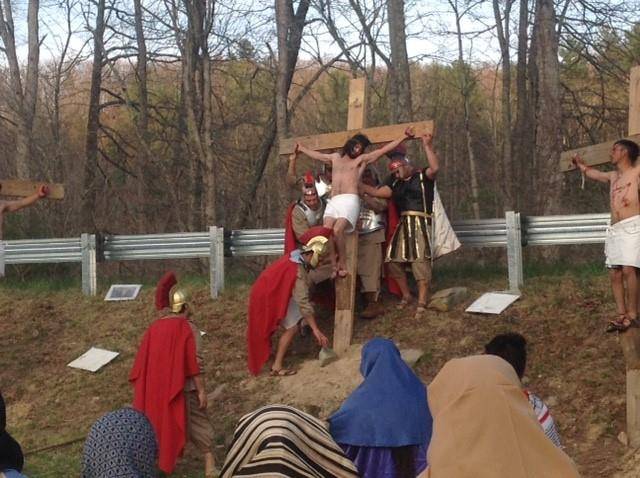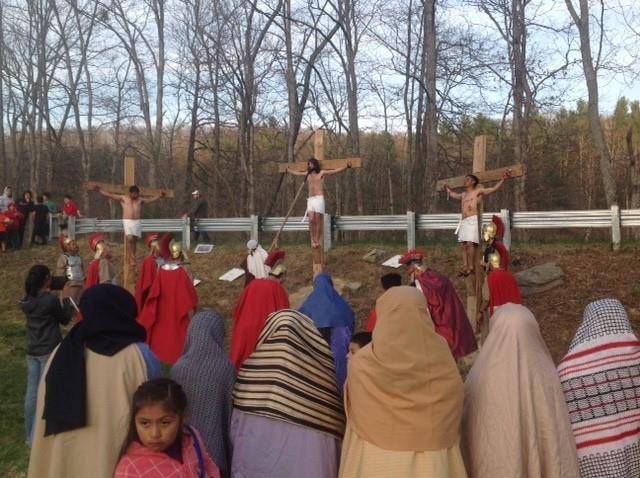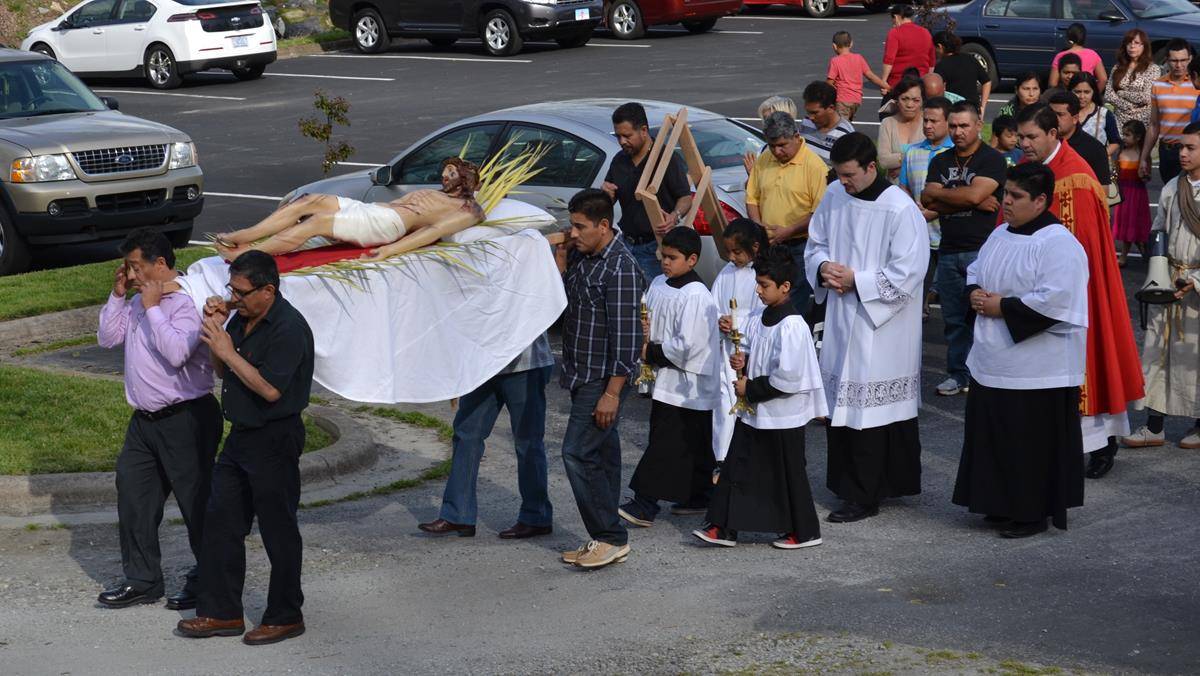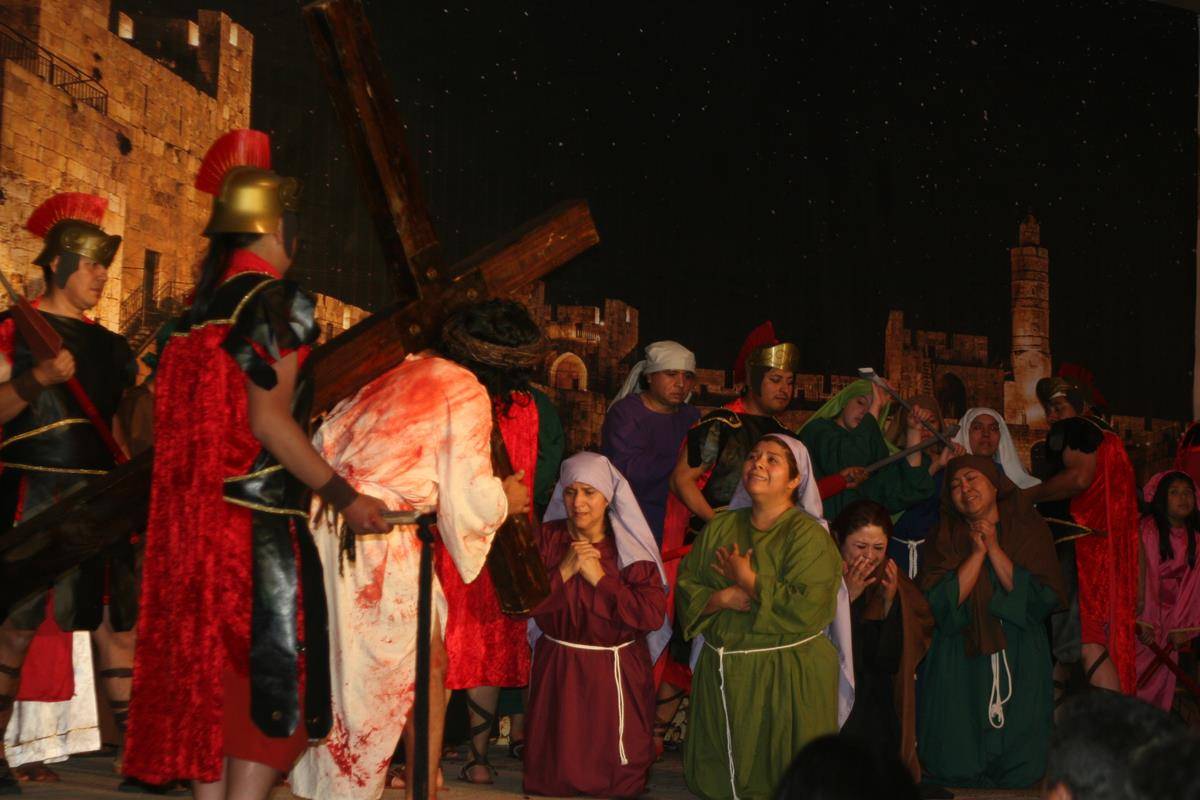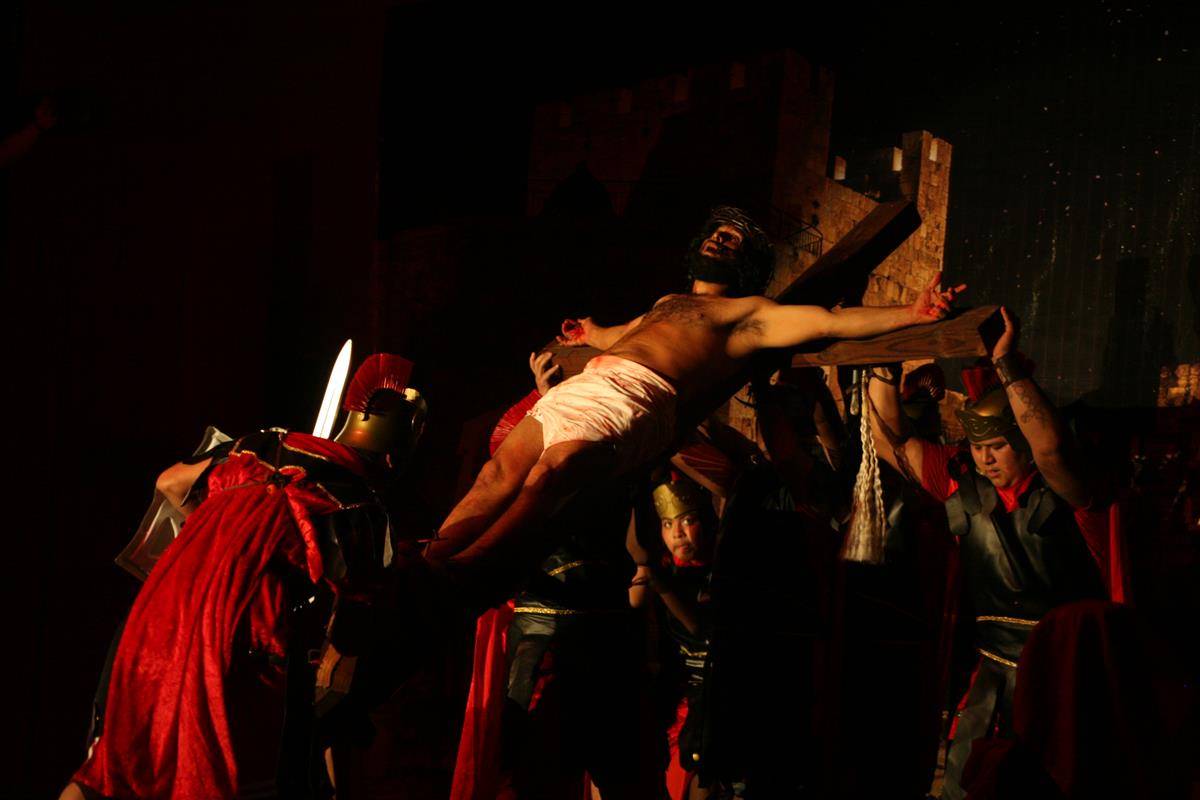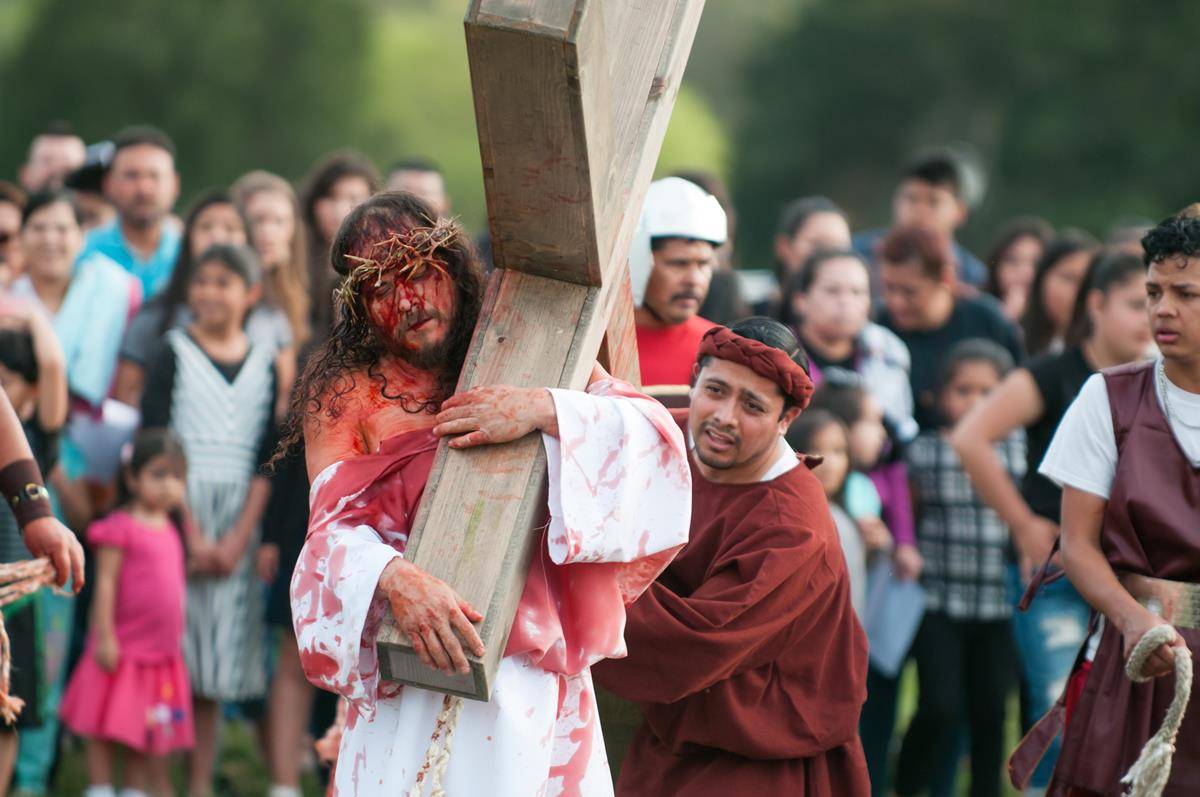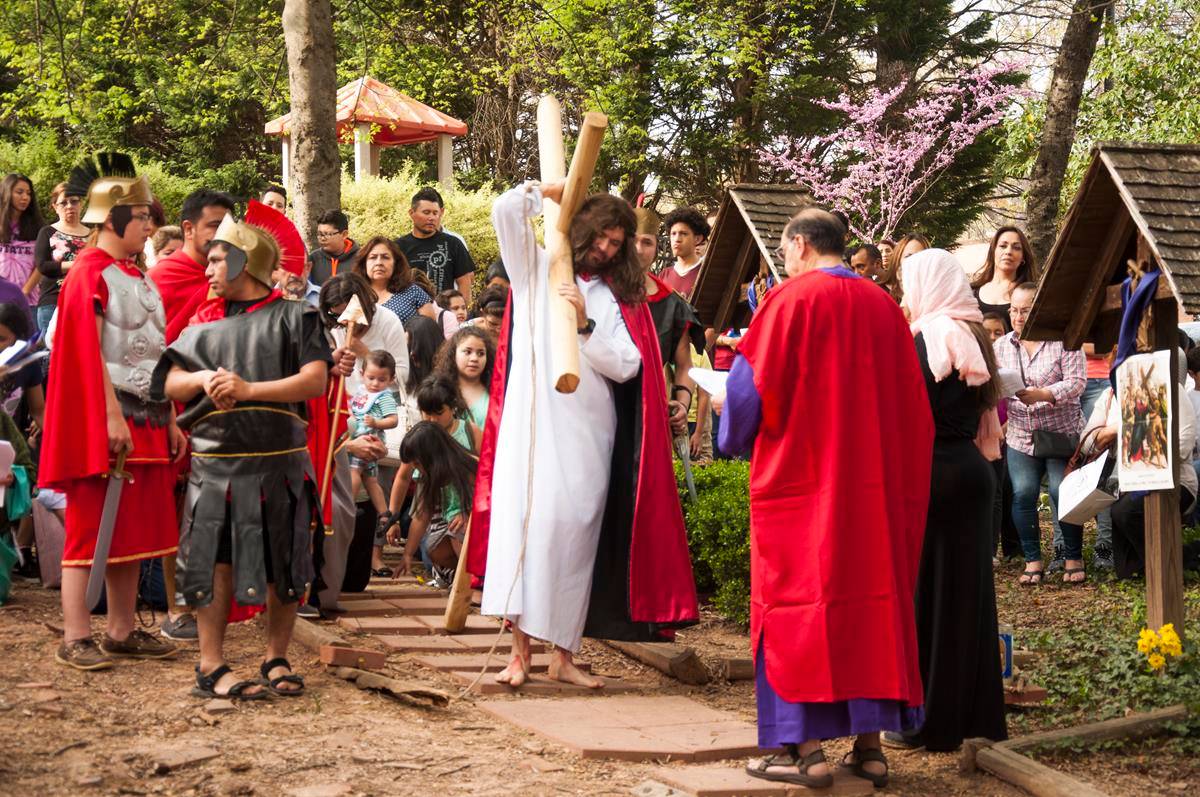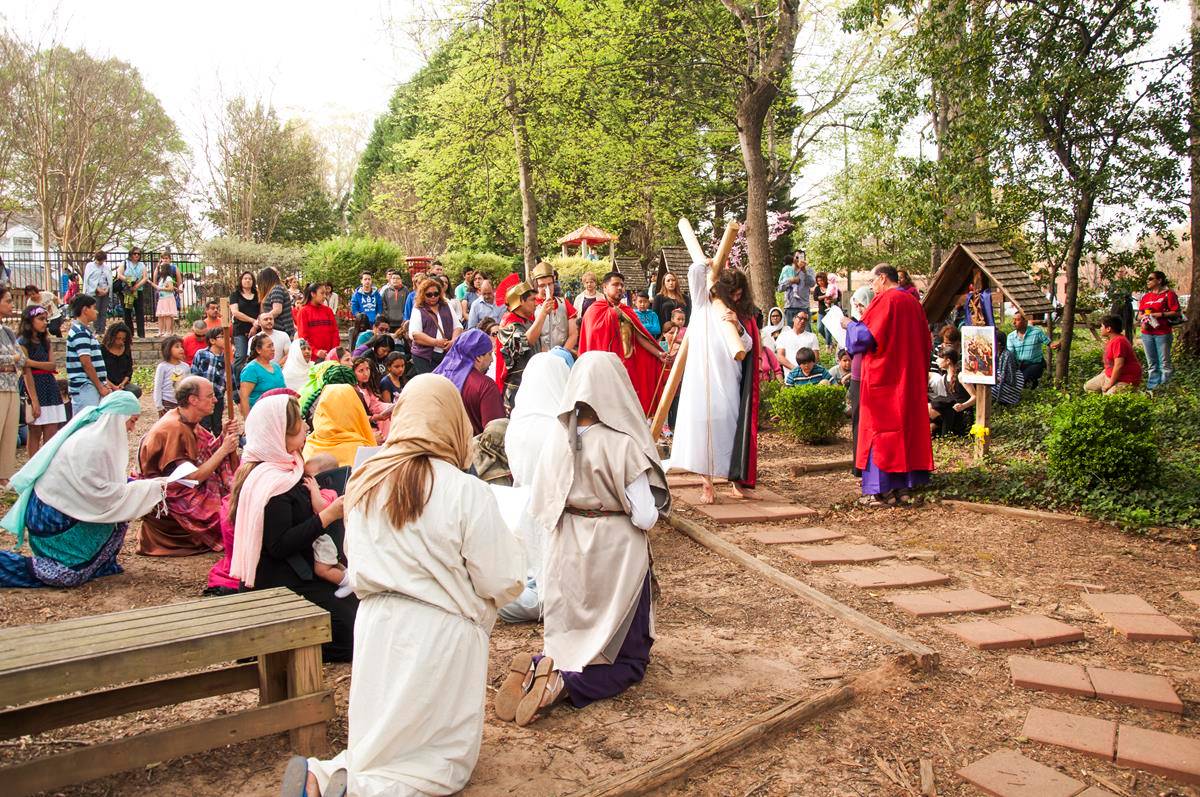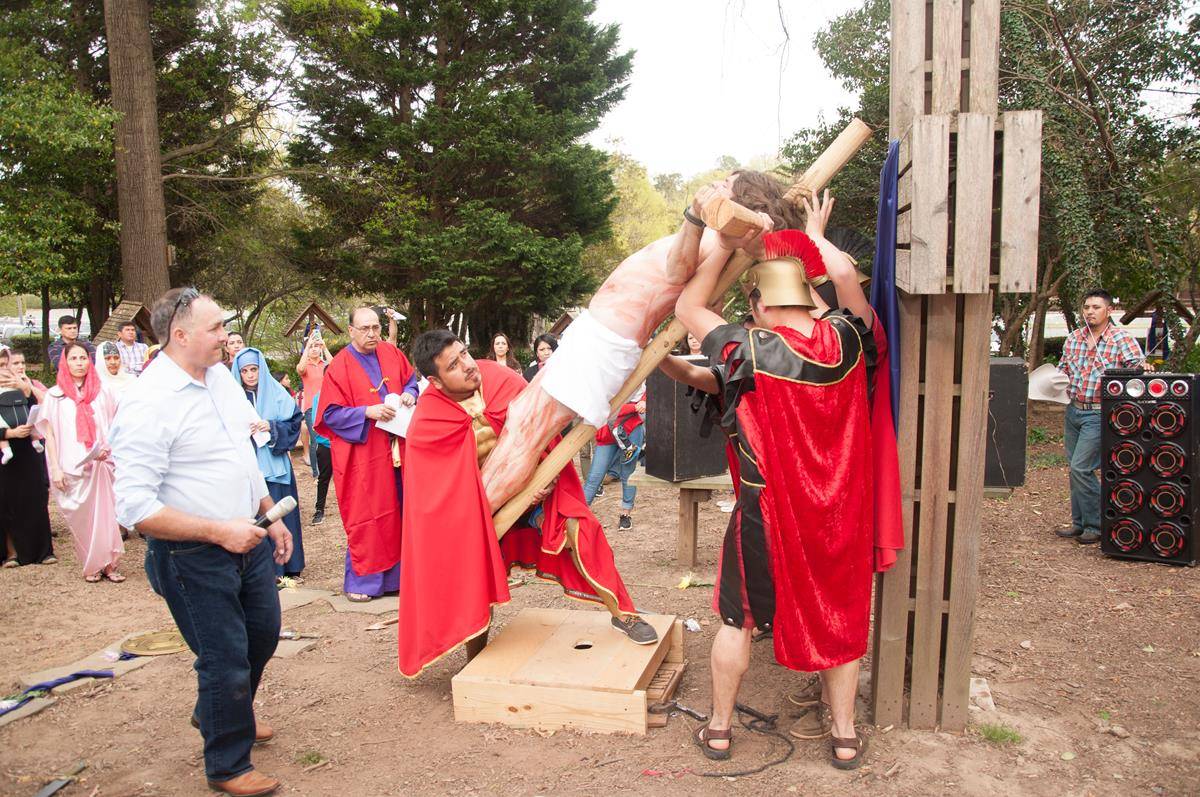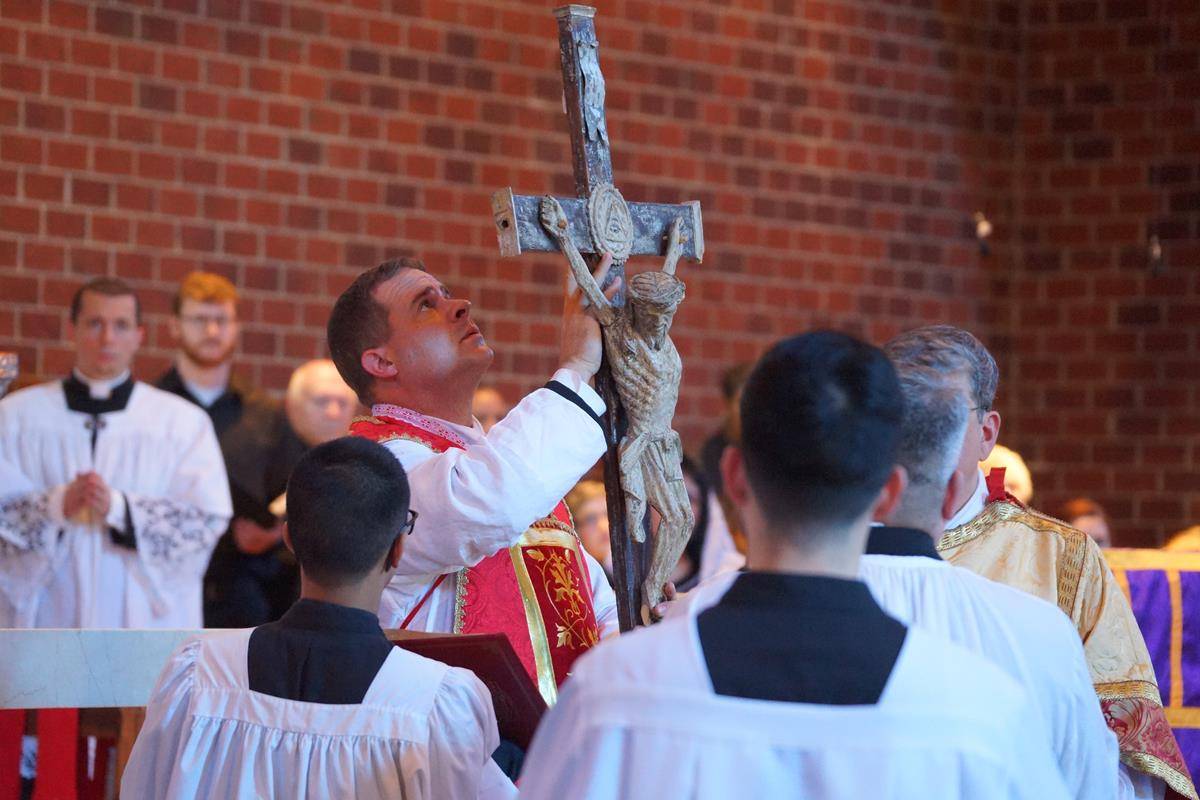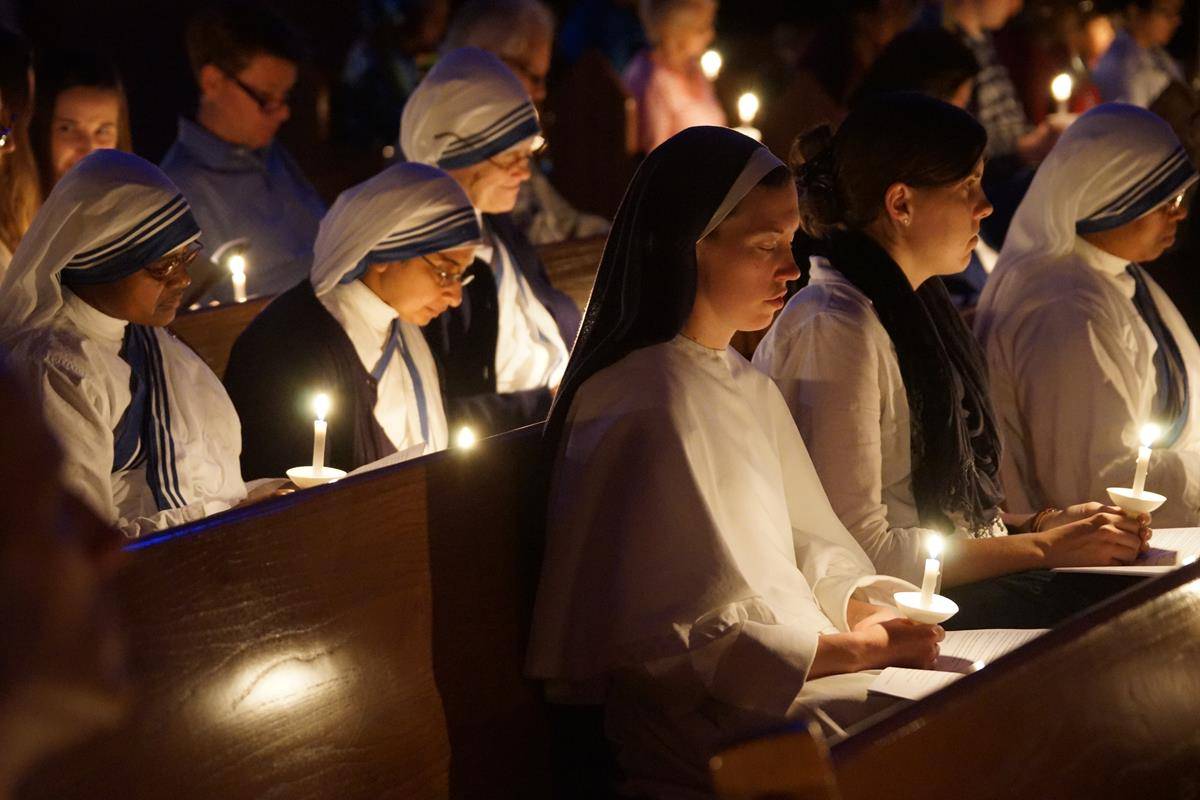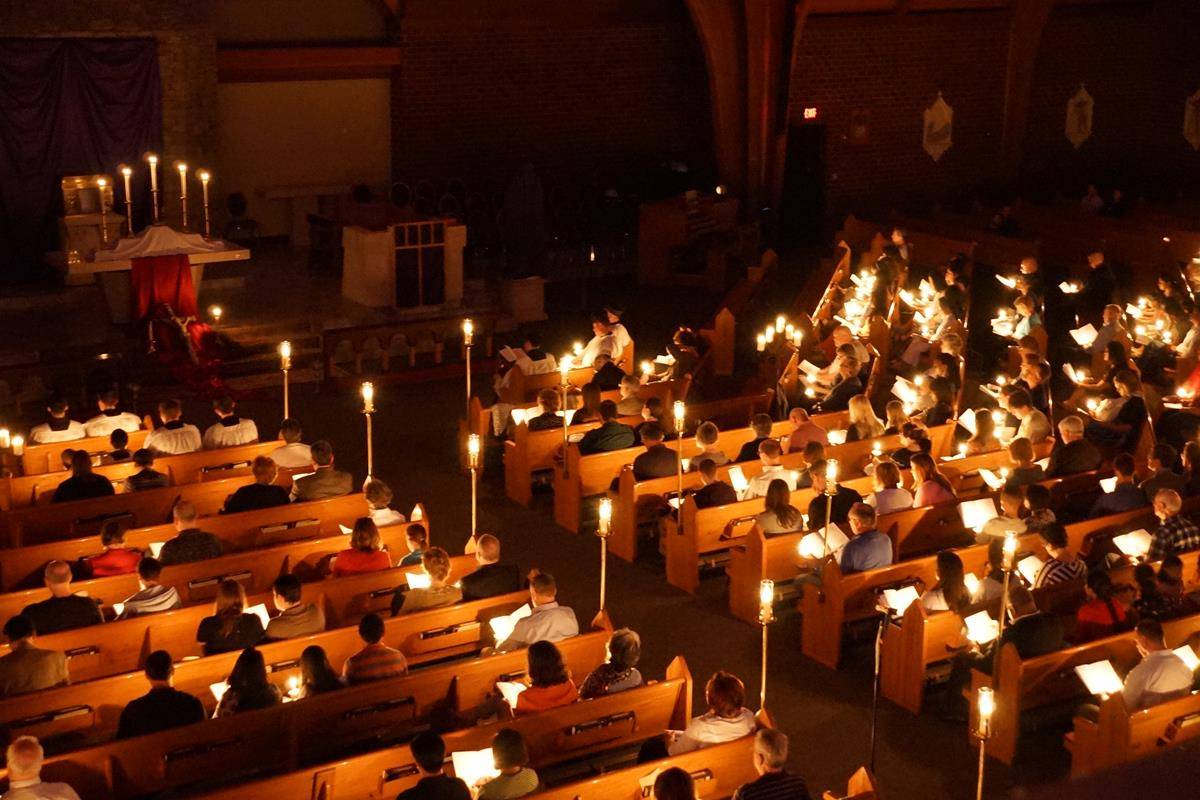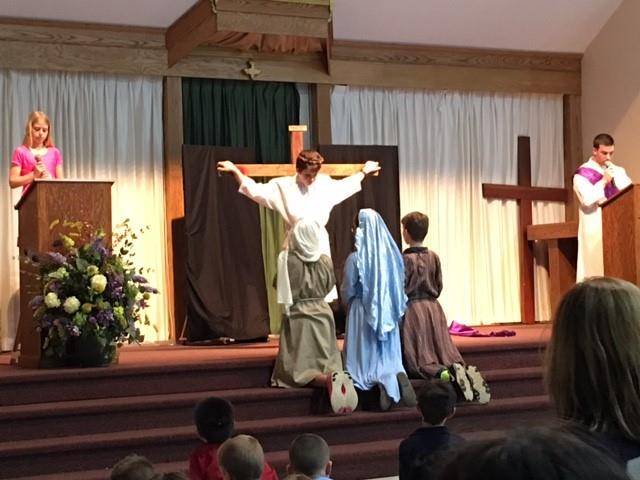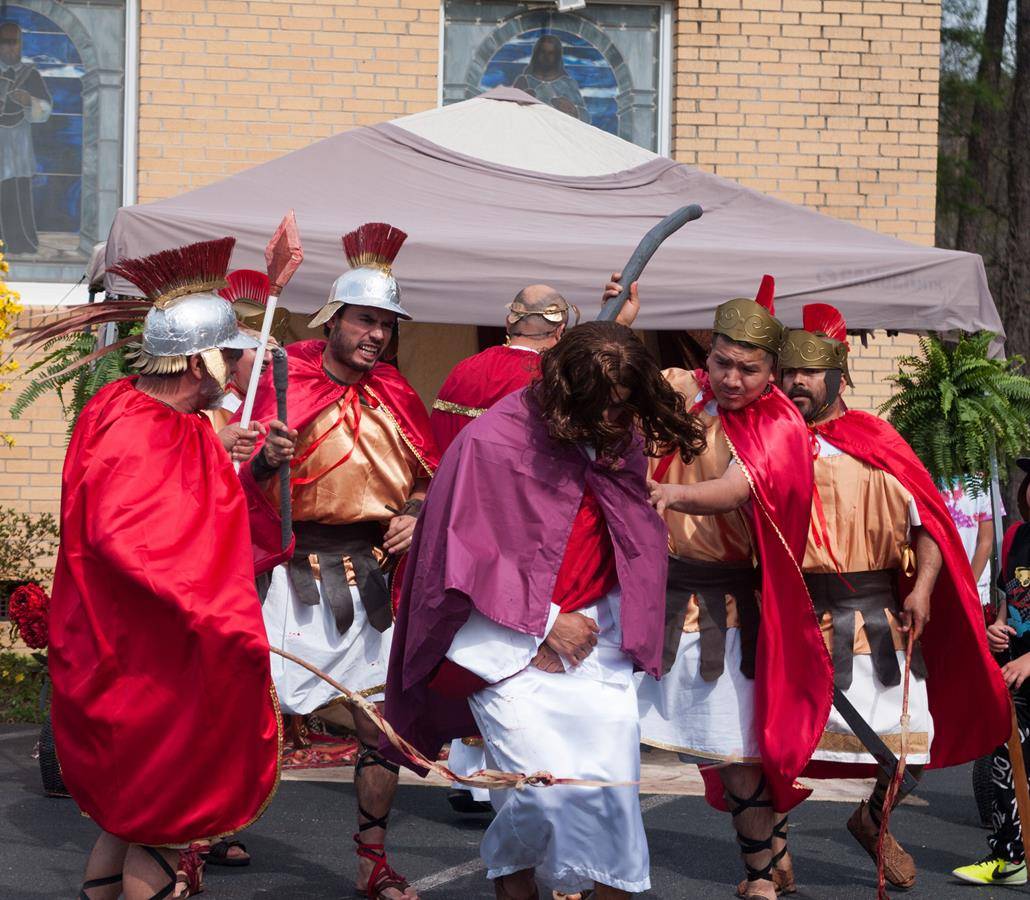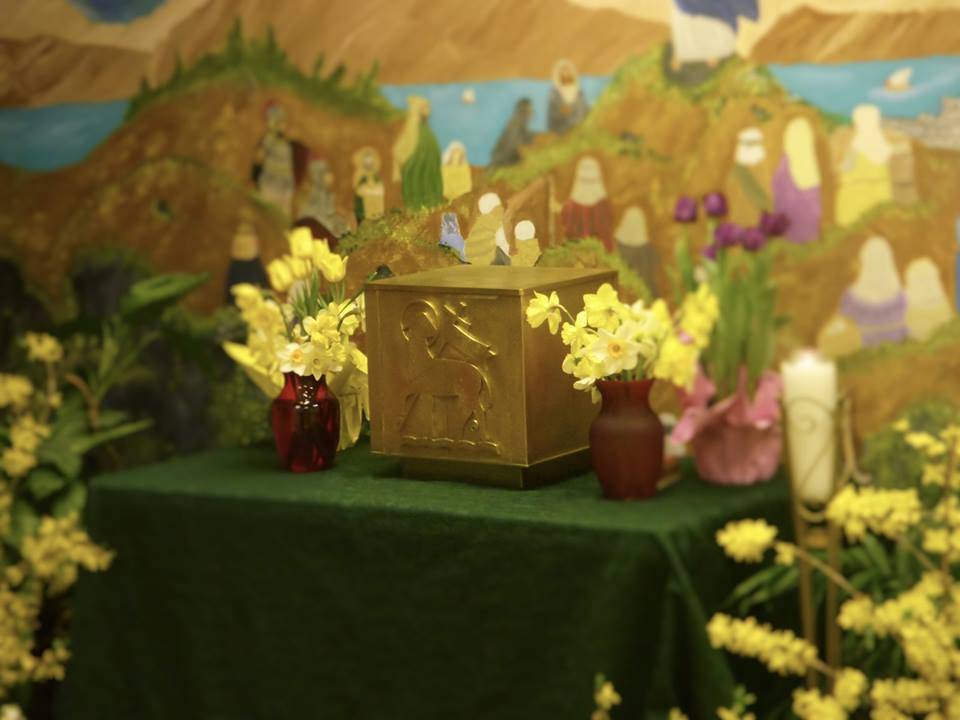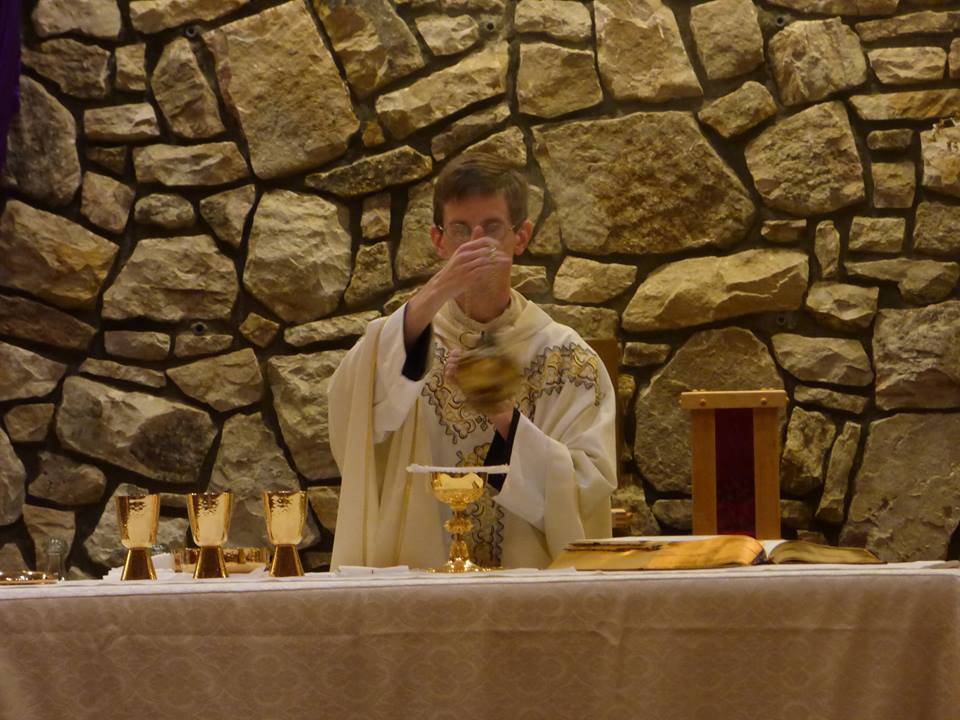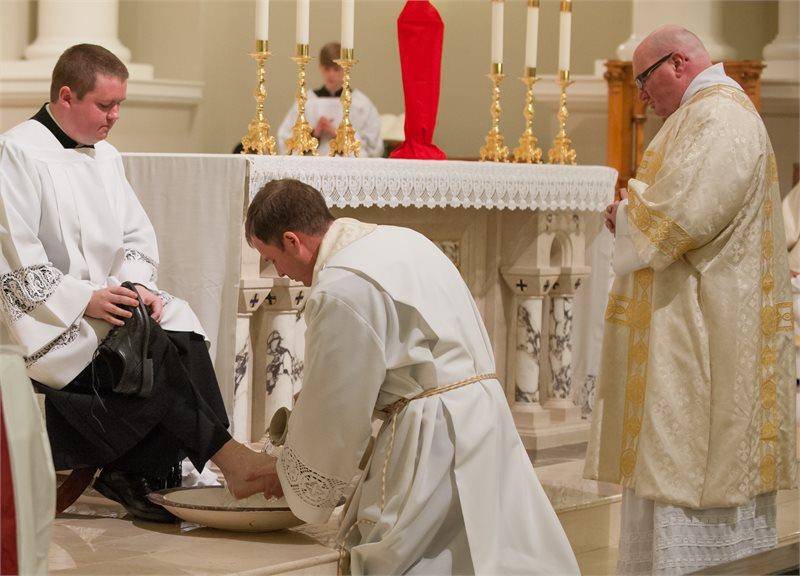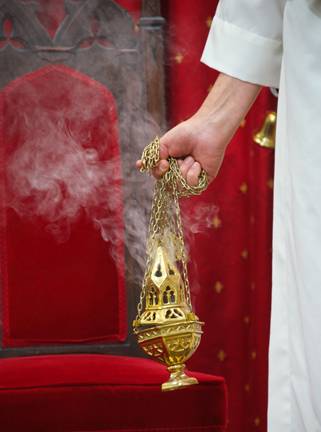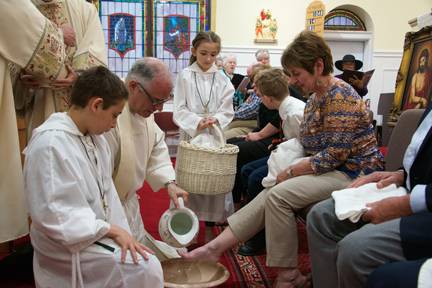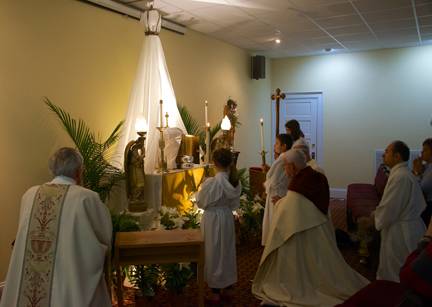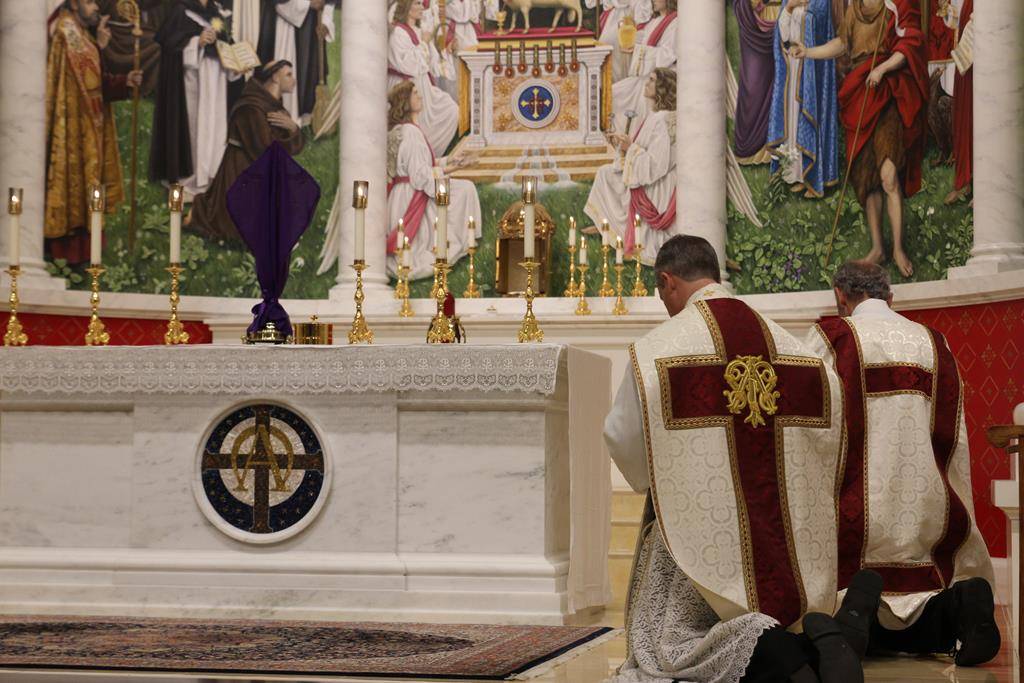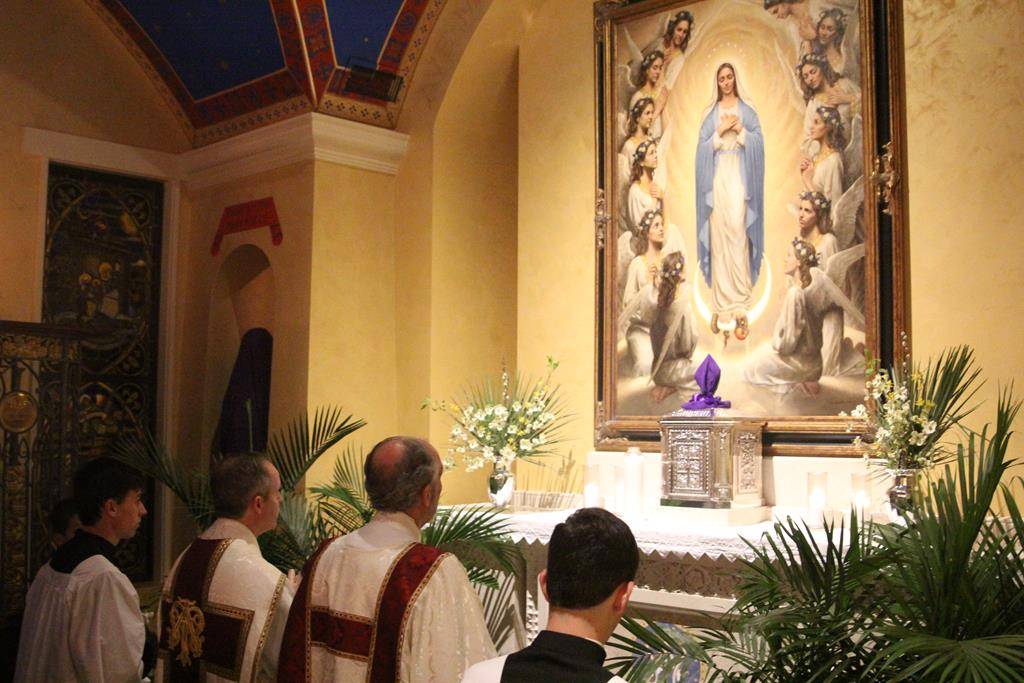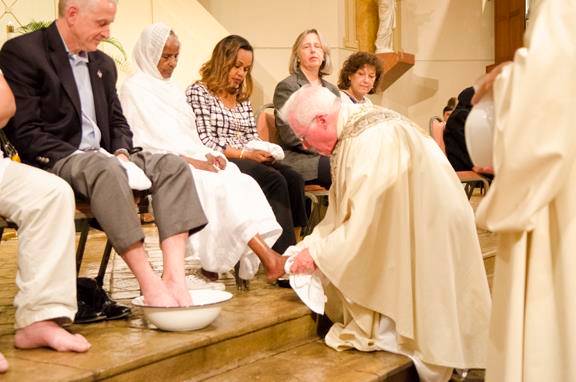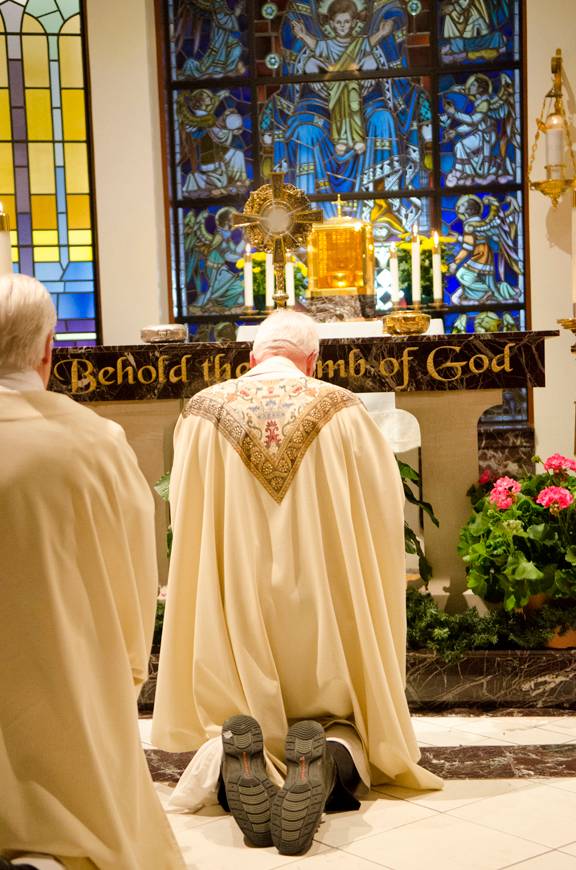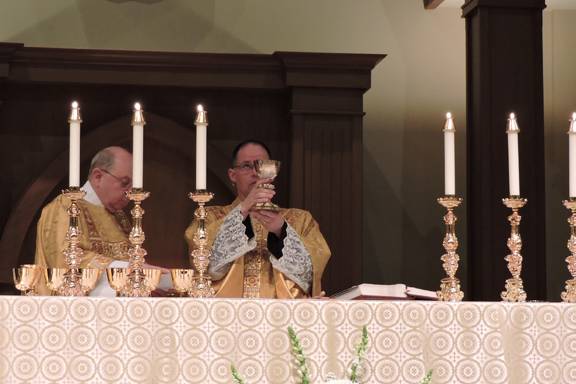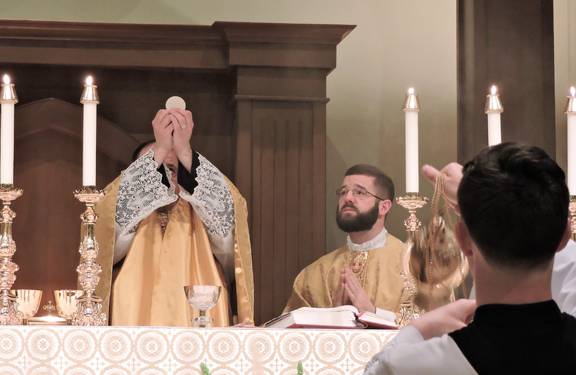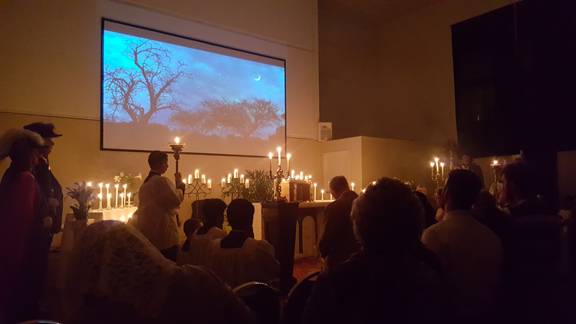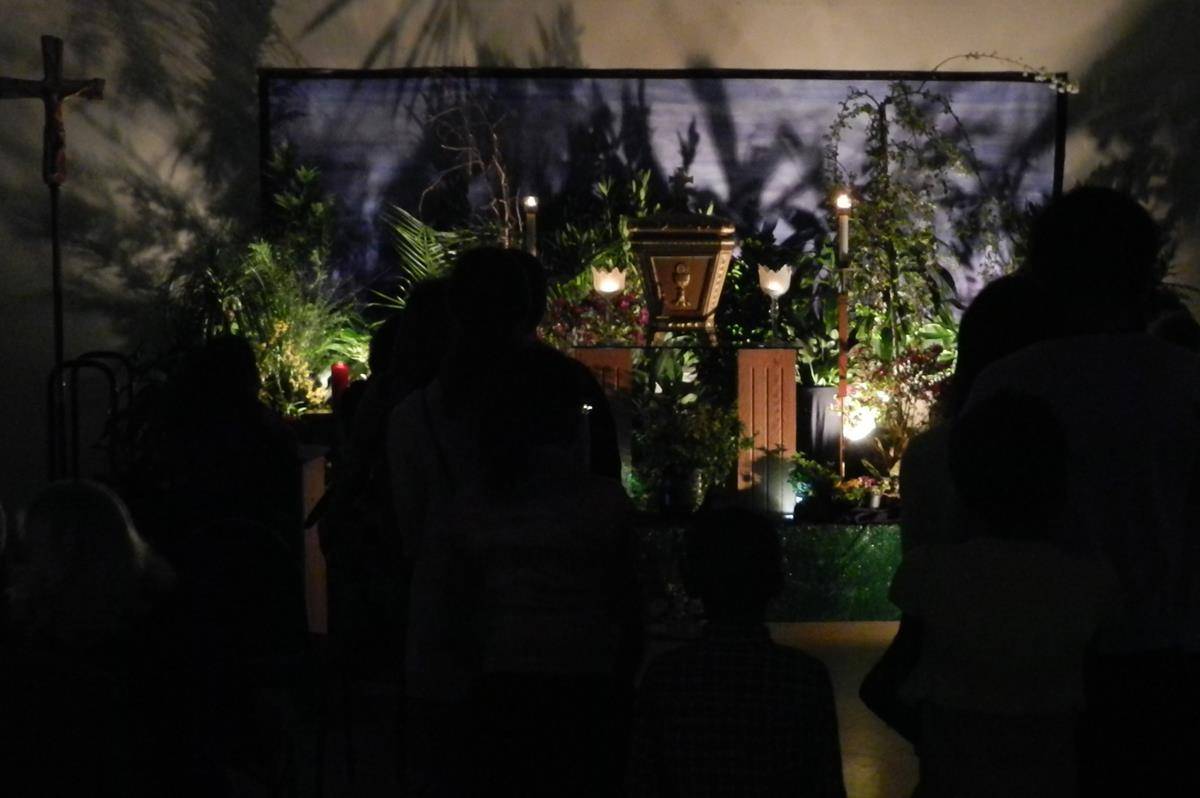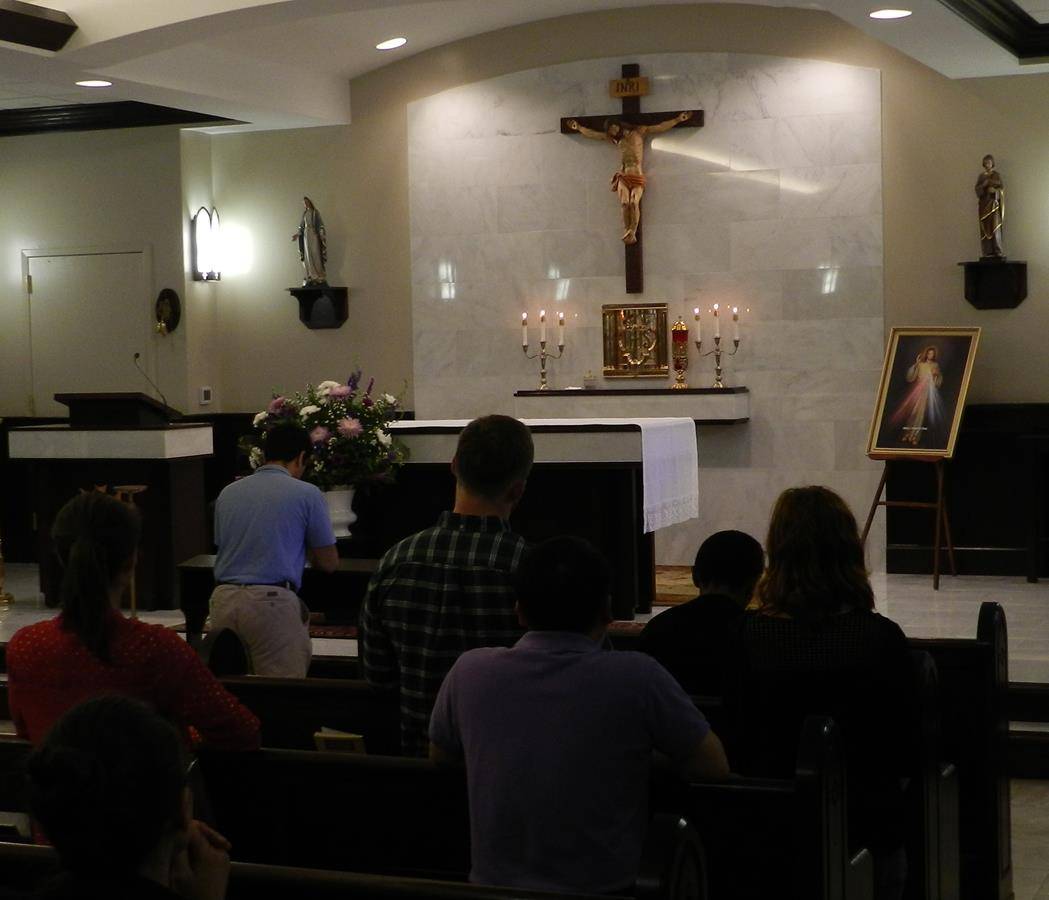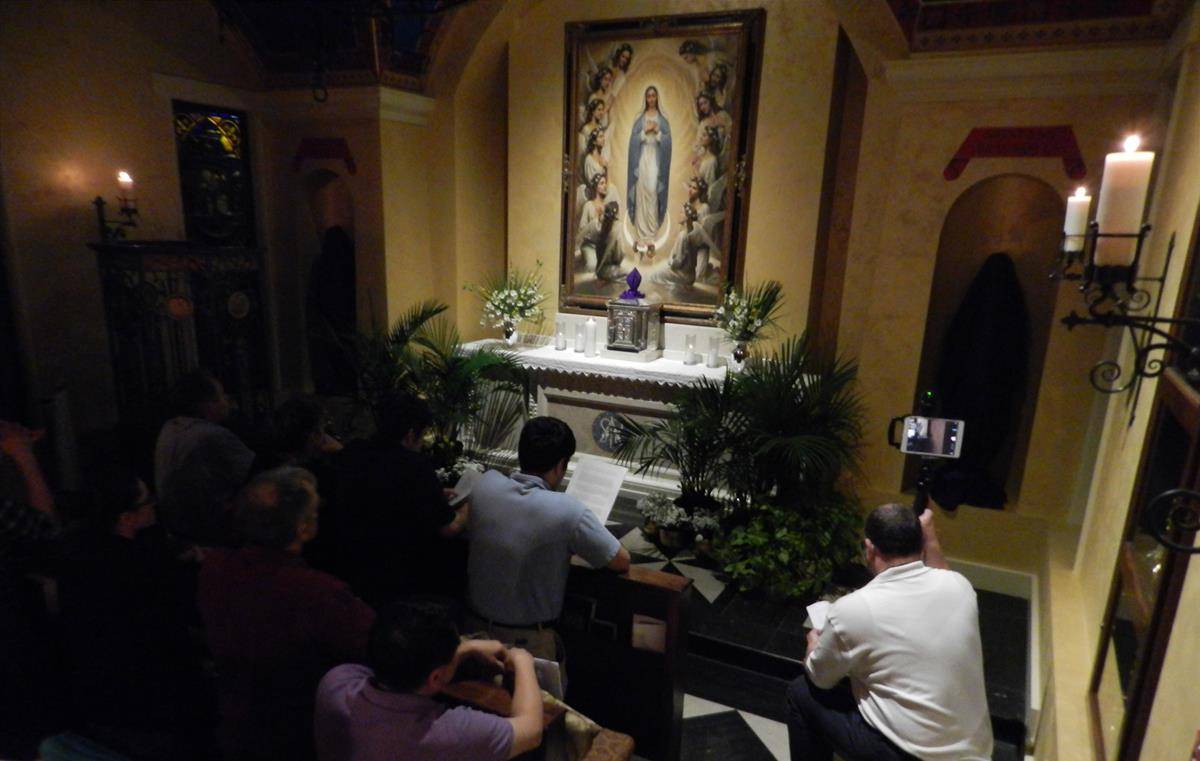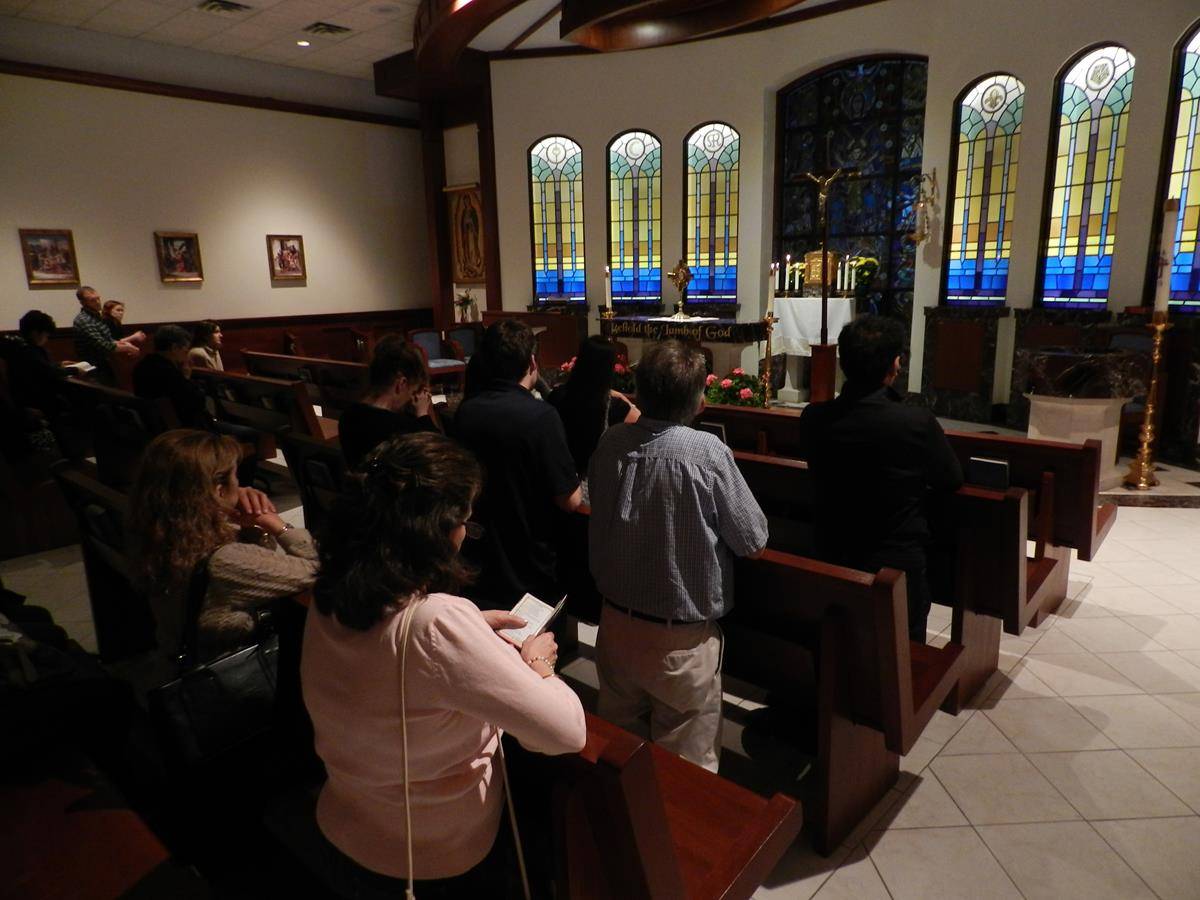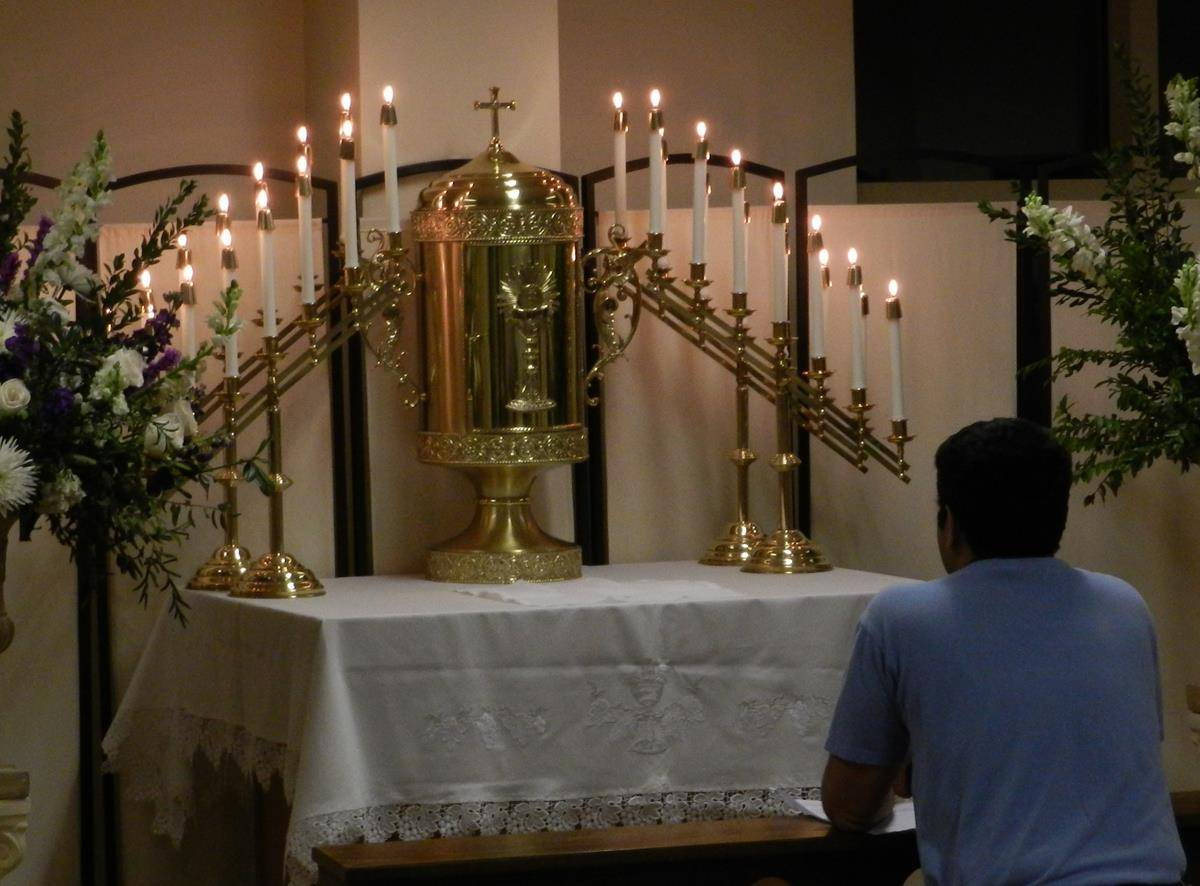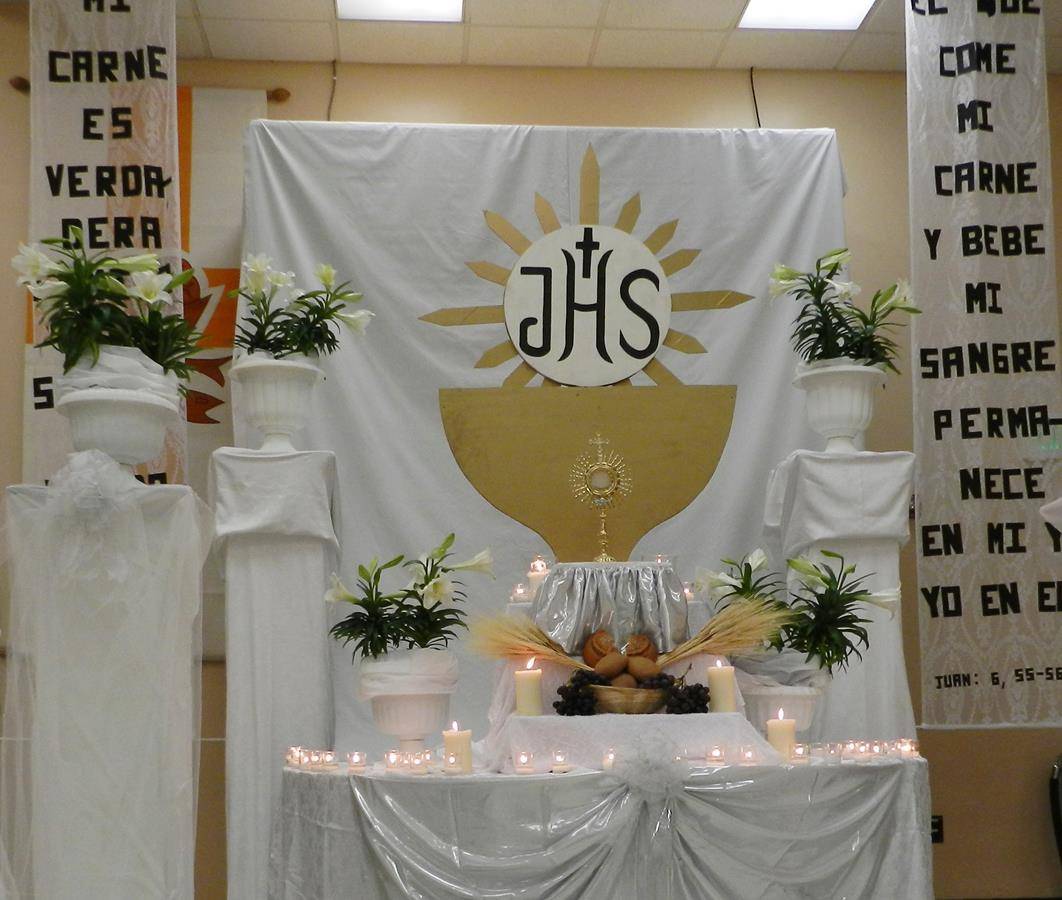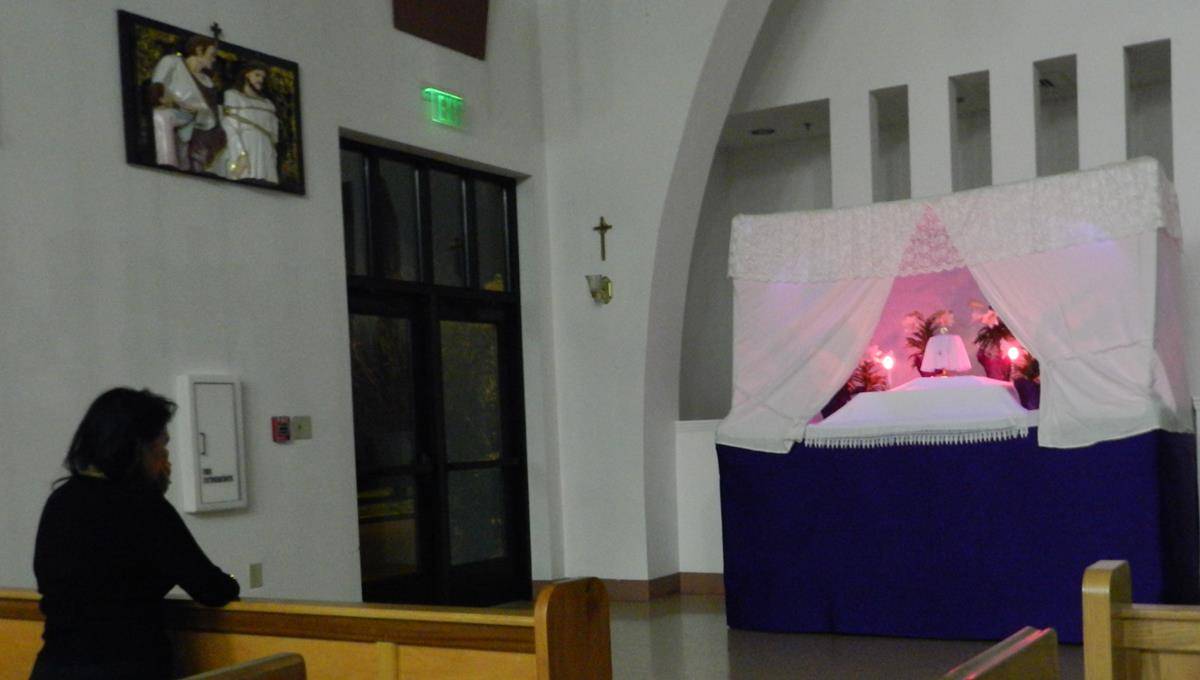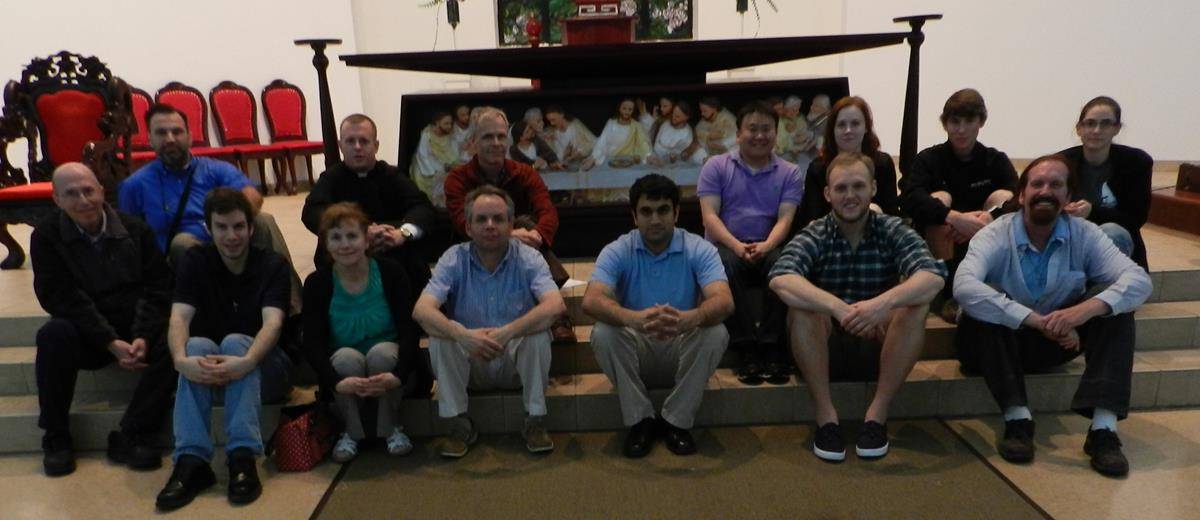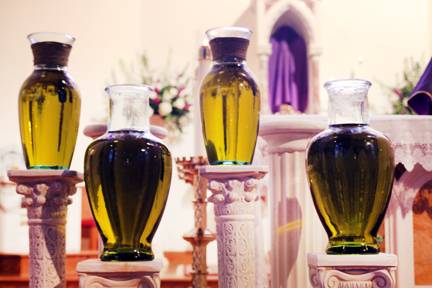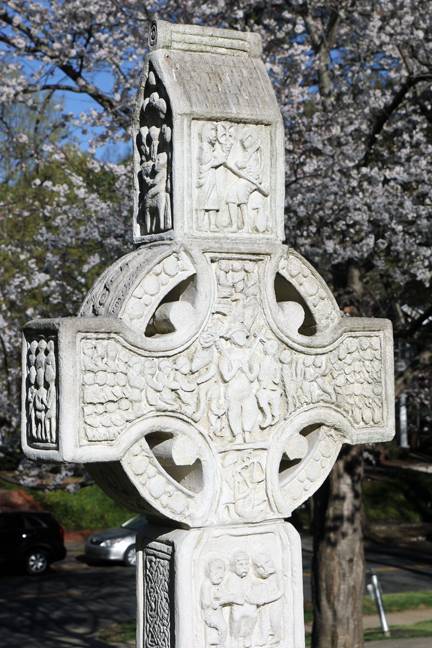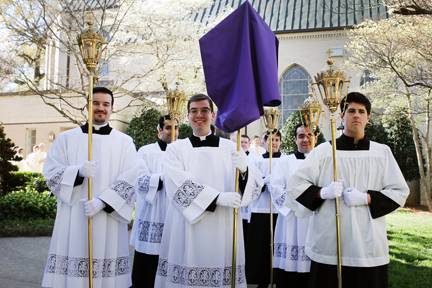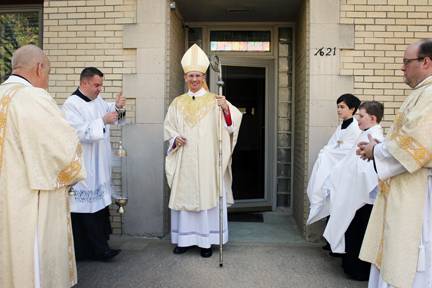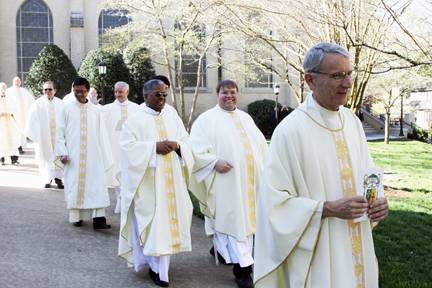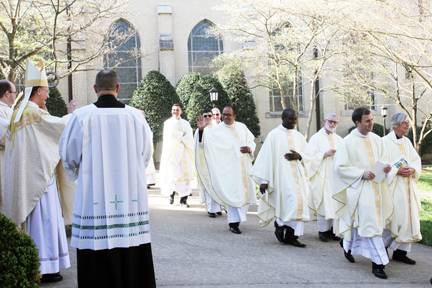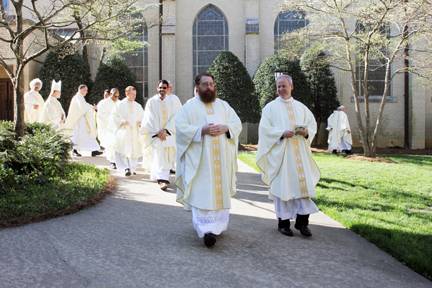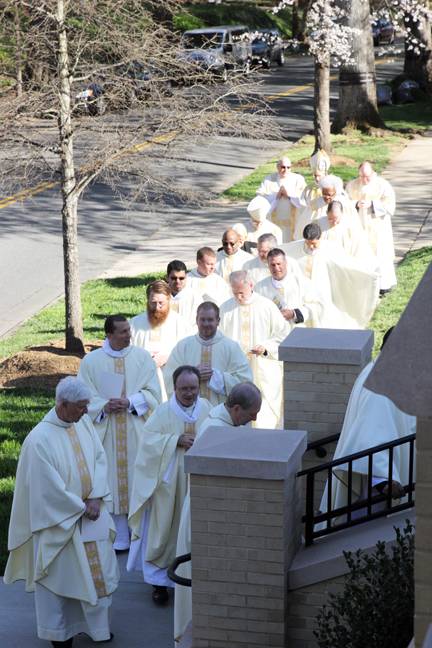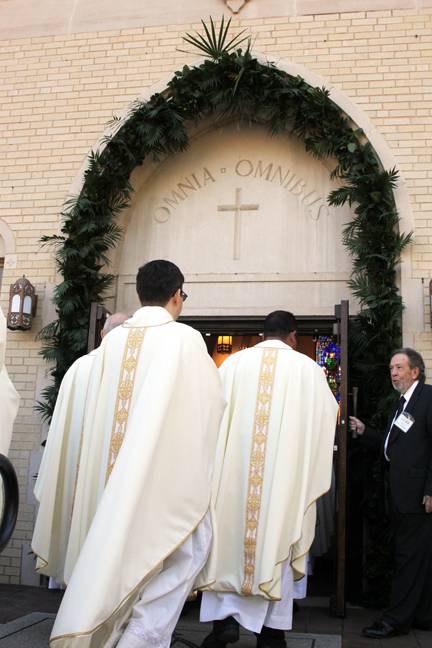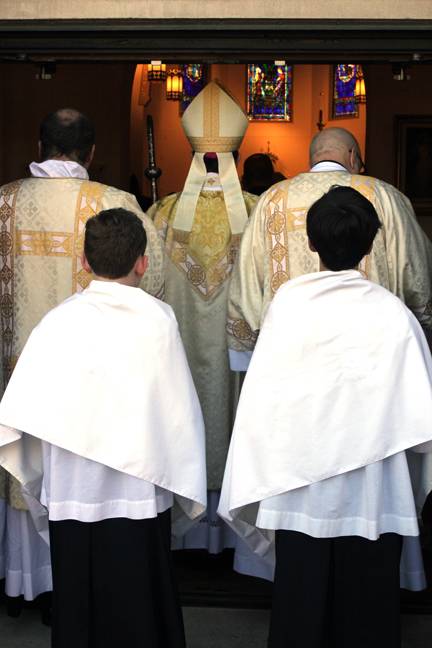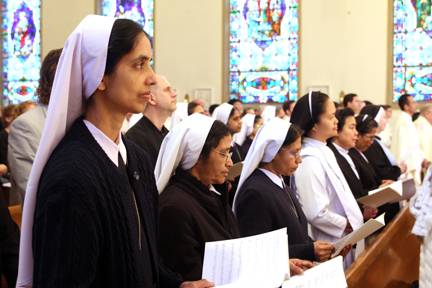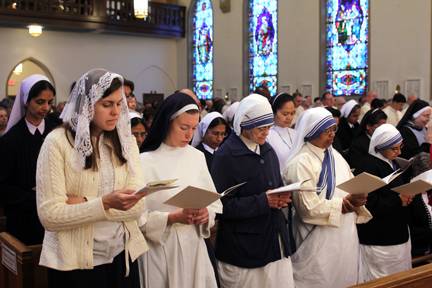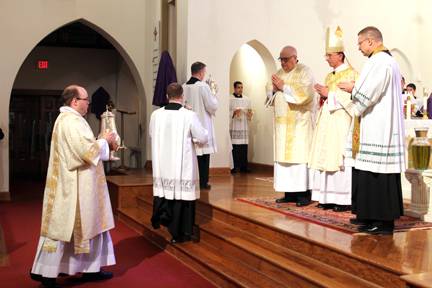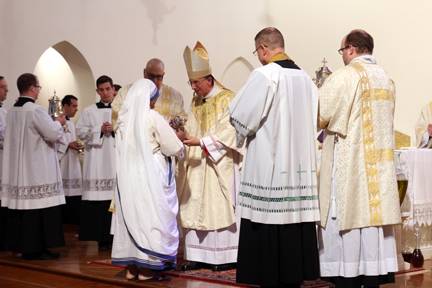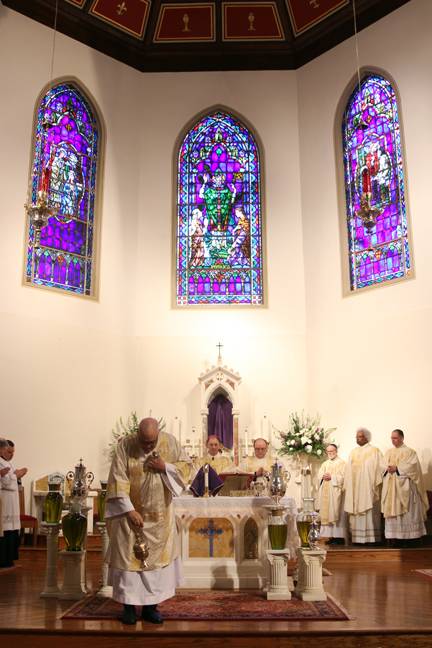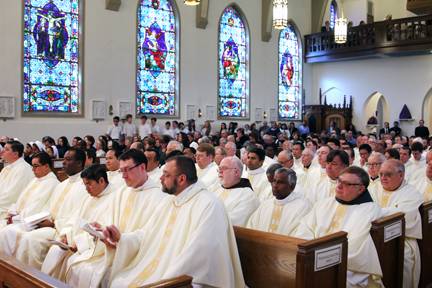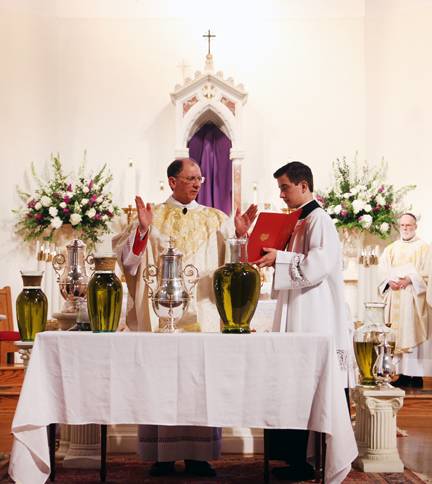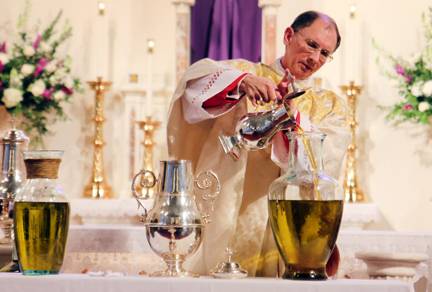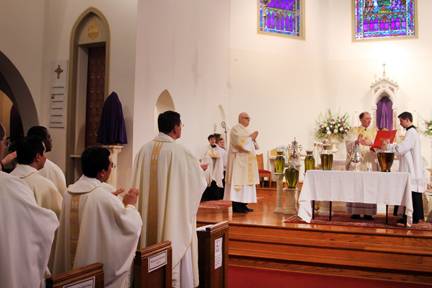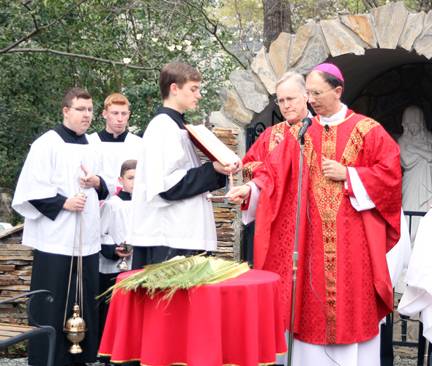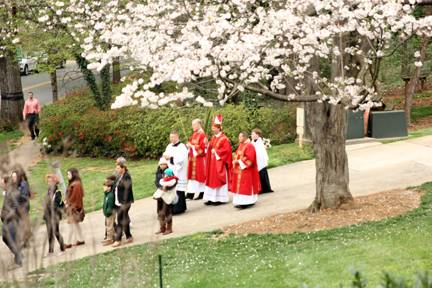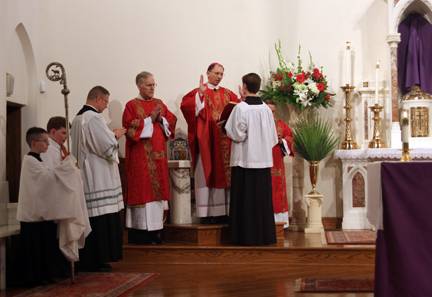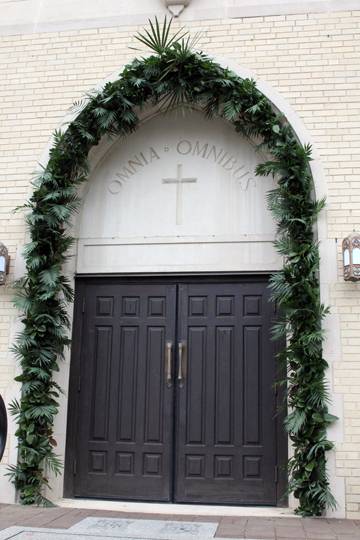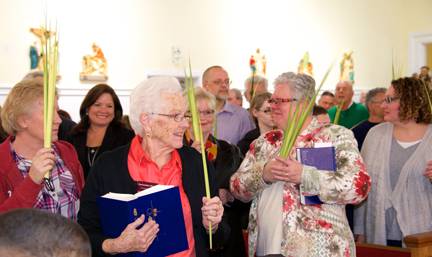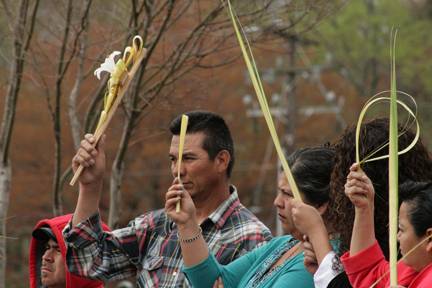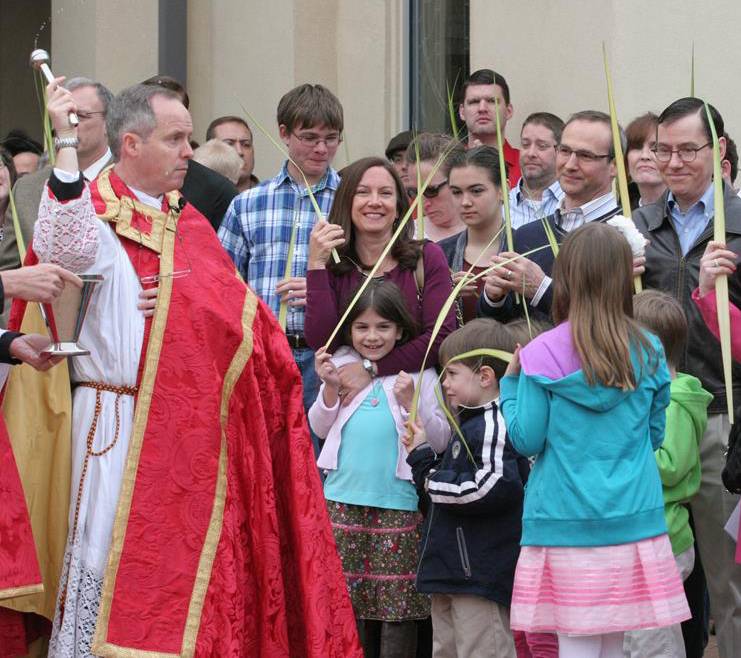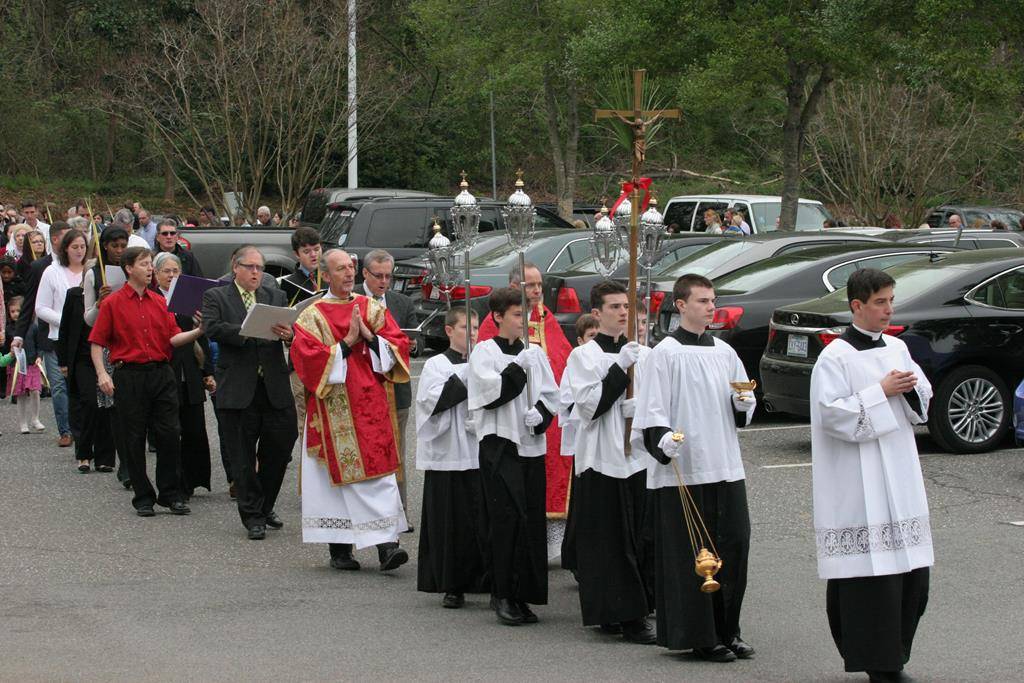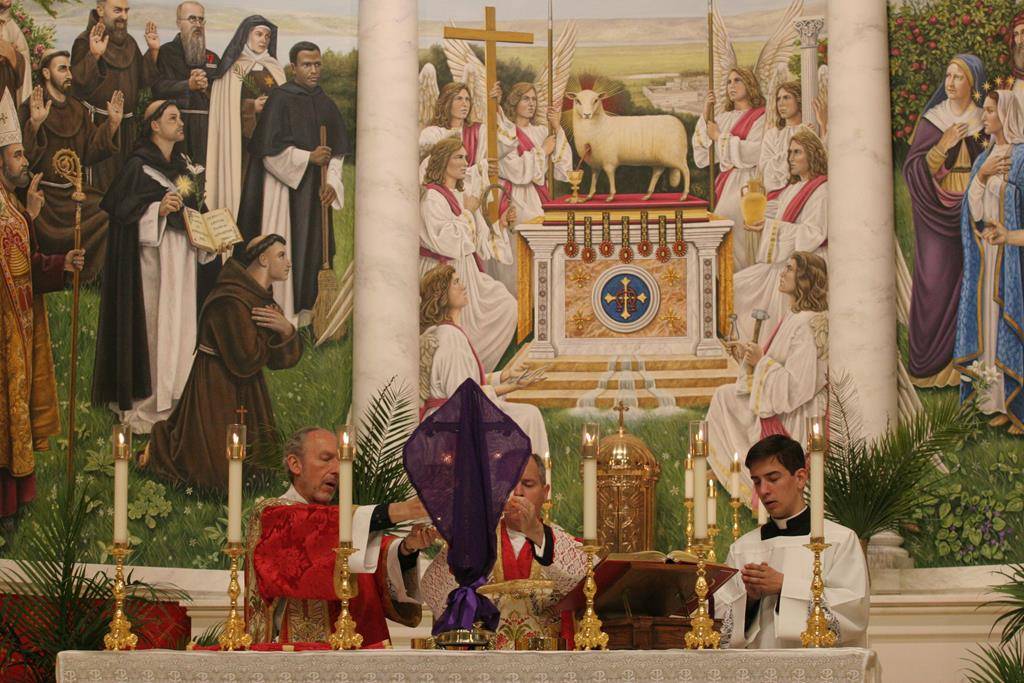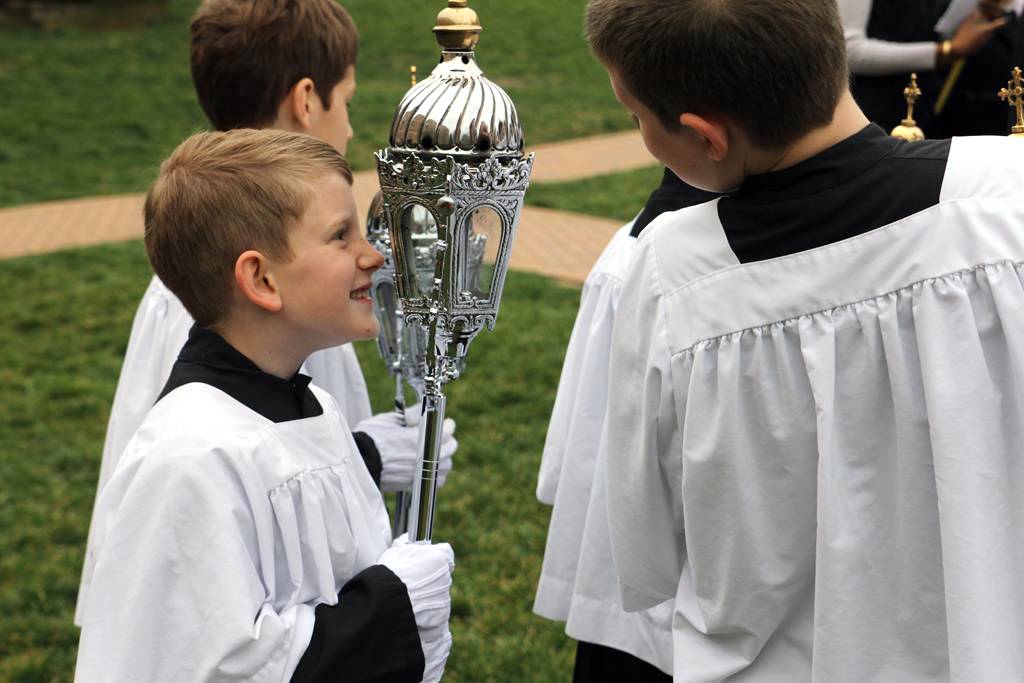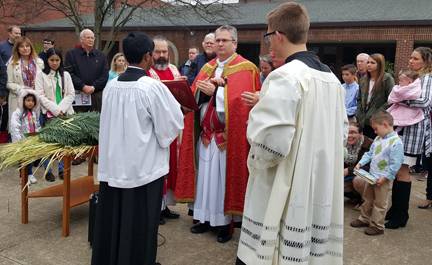WAXHAW — The Maronite Mission of Charlotte, an Eastern Rite Catholic Church, is now offering weekly Masses on Sundays at 12:30 p.m. at St. Matthew South Campus, 4116 Waxhaw-Marvin Road in Waxhaw.
The mission's pastor is Father Elie Mikhael, who can be reached at 704-543-7677, ext. 1043, or This email address is being protected from spambots. You need JavaScript enabled to view it..
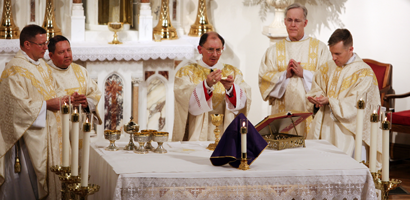 Holy Thursday: Jesus tells us to love one another because His love dwells in us
Holy Thursday: Jesus tells us to love one another because His love dwells in us
CHARLOTTE — St. Patrick Cathedral was filled nearly to capacity Thursday evening as Bishop Peter Jugis celebrated the Mass of the Lord’s Supper. The liturgy marked the start of the Triduum, the three holy days preceding the Resurrection of the Lord at Easter.
The Mass of the Lord's Supper recalls Jesus' institution of the Eucharist at the Last Supper, His washing the feet of His disciples, His agony in the Garden of Gethsemane, and His betrayal and arrest.
When Jesus washed the feet of the Apostles, it was more than a physical act of humble service, Bishop Jugis noted during his homily. “More importantly,” he said, it was “about an interior washing.”
His disciples were focused on the earthly act, but Jesus was speaking on a heavenly level, he explained.
When Jesus told His disciples that they had been washed, He meant that “they had been cleansed by Jesus’ grace and His love – through the three years that they had been spending with Him, listening to His teaching and observing His miracles. Their hearts were now filled with Christ’s grace and love, which has acted as a purification of them – (it) has washed them clean.
“He and His teaching have penetrated right into their hearts, and they have been transformed, become true disciples, through this interior washing.”
All of His disciples were graced except for Judas Iscariot, who was soon going to betray the Lord, Bishop Jugis noted. Jesus said as much with His words, “Not all are clean.”
Bishop Jugis also reflected on Jesus’ words to His disciples to “love one another as I have loved you.”
“Why does He say it’s a new commandment? What’s so new about it? After all, you can find that phrase even in the Old Testament law,” he said. “It’s new because you have been washed interiorly with Christ’s love and grace, and Christ is living within you. That’s what’s new!”
“It’s no longer just words: ‘love one another.’ But now, having been washed,” Bishop Jugis continued, Jesus is saying, “‘I am living within you.’ That makes it a new commandment, a new mandate.”
Jesus is instructing us to demonstrate Christian love, not simply human love, to others, he explained.
“That’s the essence of Christianity. It’s not just a religion of words. It’s a religion of a Person. A Person comes to live in your soul. You come to love a Person. You have a relationship with Him – not just with words or commandments, but with Jesus.
“That’s the newness of the new commandment: to love because He is within you.”
Bishop Jugis also reflected on the Holy Thursday liturgy as the institution of the Eucharist and of the priesthood.
Priests perpetuate Jesus’ ministry through the ages, he said, “to continue His interior cleansing of souls that takes place through the apostolic ministry of preaching His Word, teaching His commandments, celebrating the sacraments and shepherding the flock.”
“Where would we be without the ordained ministry?” especially in administering the sacraments of baptism, confession and Holy Communion, he said.
Baptism washes us clean, and the Eucharist continues to wash us with grace, nurturing us and enabling us to grow in holiness, he said.
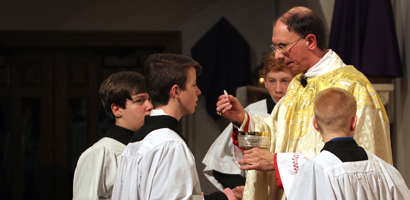 “You can’t have a Church without the priesthood and the Eucharist. They are two essential elements that Jesus instituted to make up His Church.”
“You can’t have a Church without the priesthood and the Eucharist. They are two essential elements that Jesus instituted to make up His Church.”
In conclusion, Bishop Jugis touched on the words of Jesus in the Gospel of John: “He loves them to the end.”
Jesus loves us even to the cross, the end, “because that is where the totality of Jesus’ self-giving love is going to be shown,” he said.
Jesus’ suffering and death on the cross is “the exclamation point” of His love for us, a love which was shown earlier at the Last Supper, when He instituted the priesthood and the Eucharist, Bishop Jugis said.
Those words encapsulate “a beautiful teaching in a few short lines from St. John’s Gospel, chapter 13, but so full of grace and meaning and love for each one of us now as we enter into the sacred Triduum.”
At the end of the Holy Thursday Mass, altars in every church were stripped bare, candles and lights were extinguished, and the Blessed Sacrament was transferred to a temporary altar of repose until Easter – outwardly demonstrating the sense of the Church's bereavement during the time of Christ's Passion and burial.
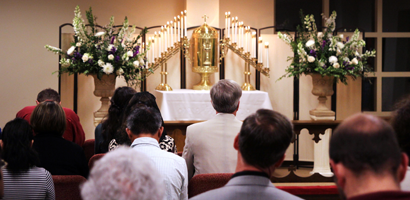
Catholics then spent time in Eucharistic Adoration, recalling Jesus' words to His sleepy disciples in the Garden of Gethsemane, "Could you not keep watch with Me for one hour?"
On Good Friday, no Mass is celebrated.
— Patricia L. Guilfoyle, editor
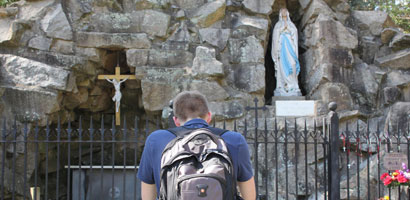 Men to study at Belmont Abbey College
Men to study at Belmont Abbey College
BELMONT — The Diocese of Charlotte is establishing a college seminary in response to growing interest in priestly vocations.
The St. Joseph College Seminary will be what the Church calls a "minor" seminary, as its focus is undergraduate men considering the priesthood, one step before enrolling in a "major" seminary where they receive more specific priestly formation. It will give these men the opportunity to live closer to home, continue their college studies while in community together, and interact regularly with diocesan vocations staff.
On March 19, the feast of St. Joseph, Bishop Peter J. Jugis will formally announce the creation of the college seminary during the Bishop's Lenten Youth Pilgrimage at Belmont Abbey College.
Starting this fall, the college seminary will be temporarily located on the campus of St. Ann Church in Charlotte, but there are plans to build a permanent home on or near the campus of Belmont Abbey College.
"I think the faithful of the diocese will be greatly encouraged to know that as we are growing as a diocese the Lord is answering their prayers and bringing forth vocations," Bishop Jugis said Tuesday.
In an earlier letter to priests, Bishop Jugis noted that the plan "for our college seminarians would have many advantages. It would allow men considering a priestly vocation to study closer to their home state of North Carolina and give them the opportunity of pastoral formation in the setting for which they are preparing to serve."
Bishop Jugis, a native of the Charlotte diocese, played an active role in selecting the name "St. Joseph College Seminary." Placed under the patronage of St. Joseph, foster father of Our Lord, the name also reflects the heritage of the diocese, which was first shepherded by Bishop Michael Joseph Begley when it was carved out of the Diocese of Raleigh in 1972.
FORMATION OF VIRTUE
Already, nine men are expected to enter the college seminary for the 2016-'17 academic year, attending classes at Belmont Abbey College while living temporarily in the former St. Joseph Monastery on the St. Ann campus. The building was the home of the Poor Clares of Perpetual Adoration, who moved to Our Lady of the Angels Monastery in Hanceville, Ala., last November.
Enrolled in the diocese's seminarian program, the men will work toward an undergraduate degree in philosophy at the top-ranked Benedictine college in Belmont. While attending classes, they will live in community, apart from the rest of the student body, and will follow a "rule of life" appropriate for this level of seminary, including daily Mass, the Liturgy of the Hours, the rosary, spiritual direction and conferences.
Father Matthew Kauth, chaplain of Charlotte Catholic High School and an instructor at Belmont Abbey College, will be the rector of the college seminary, living in community with the men.
The college seminary is designed as a place for the human, spiritual and pastoral formation of local, college-aged men, Father Kauth said.
"We're seeing a lot more college-aged men desiring to enter into formation for the priesthood – specifically, those who are in high school looking to enter into a college situation," he said.
Unlike a major or graduate seminary in which men study theology (earning a master's degree) and receive more specific pastoral formation for the priesthood, Father Kauth noted, college seminary is a time to equip the men with the undergraduate philosophy studies necessary before going to a major seminary. The program will also focus on the formation of the virtues necessary for a life of priestly service, he said.
The college seminary will also enable the men to be part of a lively Catholic college environment and engage with other young adults, as well as with the Benedictine monks of Belmont Abbey, he said. In turn, the men will offer a vibrant Catholic witness that could inspire others at Belmont Abbey College and elsewhere to consider a religious vocation.
He also hopes that the men's year-round presence would enable them to be more active in parishes and assist at major diocesan events such as the annual Eucharistic Congress.
FOLLOWING GOD'S CALL
One of the nine men who hopes to be in the inaugural class for the St. Joseph College Seminary is Aaron Huber of Cruso (near Asheville), a sophomore at Belmont Abbey College.
"I am very interested in the new college seminary at Belmont Abbey because when I look back on all the choices I have made, in the trust that God will lead me to Himself, I realize that everything I have done or have not done has led me to be open to the priesthood and then to desire it," Huber said.
Being able to continue studying at Belmont Abbey College while more intensely discerning God's will for his life is important to him, he added.
"If I am blessed with the privilege of attending this fall, my hope is that it will reveal itself to be a place that will form me and my future brothers into the virtuous and holy man that is necessary to become a virtuous and holy priest," he said.
PLANS FOR A PERMANENT HOME
The diocese hopes to invest in a permanent home for the St. Joseph College Seminary on or near the Belmont Abbey campus. The first phase of the project includes procuring the land and constructing a building of approximately 18,000 square feet to house at least 20 men. The building will also include a chapel and administrative and study areas.
Diocesan officials have been working with Michael G. Imber Architects of San Antonio, Texas, to design an American Gothic style building to mirror the architecture of Belmont Abbey College. Imber recently won a religious architecture award from Faith & Form for his design of the college seminary.
The cost for the first phase of the project is estimated at $7.5 million – comprised of $5 million for the building, $1 million for the site development, and $1.5 million for furnishings, equipment, design-related services and other project costs.
Donors from across the country have already committed more than $4 million, diocesan officials said.
Donor support for the college seminary has been enthusiastic, they noted, as word of the plan has spread through the Catholic community both locally and nationally.
Retired Army Lt. Col. John Spinetto, a member of St. Bernadette Parish in Linville, is one of the supporters of the college seminary and the diocese's seminarian program.
"We often refer to the Church as the Body of Christ with all of us as members of the Body," Spinetto said. "If I look at the 'members,' I see every possible occupation and vocation, but there is only one that is truly focused on helping me to stay on the path to heaven: the priesthood."
"Good priests help us stay on the path and focus on the reason we are here," said Spinetto, who has eight children and 13 grandchildren. "I want more good priests, and the seminary provides a cornerstone to make that happen."
Billie Mobley, founder and president of the Te Deum Foundation, is also enthused about the creation of the college seminary, which she sees as God's handiwork in the potential creation of a major seminary on land her foundation bought near Shelby in 2012.
"We're very excited about the college seminary!" Mobley said. "These are new beginnings. These are exciting times. God has blessed our diocese with such a wonderful project."
The Te Deum Foundation contributes to the spiritual and material support of seminarians in the Charlotte diocese. While the foundation is not directly involved with funding or developing the college seminary, Mobley said she does see it fitting in with the larger goal of possibly building a major seminary here at some point in the future.
GROWING VOCATIONS
The St. Joseph College Seminary reflects a renewed effort by U.S. bishops to nurture religious vocations at an earlier age, with the aim of reversing a decades-long decline in the number of ordinations. The call to religious life is like the planting of a seed, vocations leaders say, but that seed must be cultivated and given space and nourishment to grow.
According to a 2014 survey by the Georgetown University-based Center for Applied Research in the Apostolate, 53 percent of respondents said they first considered a religious vocation in their teenage years, another 19 percent in their early 20s. Furthermore, CARA has found that Catholic college environments foster greater interest in religious vocations, as students learn from the examples of the priests, brothers or sisters serving there.
Minor seminaries, which practically disappeared in the wake of the Second Vatican Council, are sprouting up again to meet this need for young men in high school and college.
The St. Joseph College Seminary would be among just a few of its kind in the Southeast, besides Saint John Paul II Seminary in Washington, D.C., St. Joseph Seminary College in Louisiana, and St. John Vianney College Seminary in Miami.
The new college seminary is part of Bishop Jugis' persistent efforts to foster interest in religious vocations, particularly as the Catholic population in the diocese has skyrocketed to an estimated 400,000 from the 35,000 who were here when the diocese was established in 1972.
Most recently, Bishop Jugis named Father Jason Barone as vocations promoter for the diocese, widening the vocation ministry under the leadership of the Director of Vocations, Father Christopher Gober. Father Barone also assists Father Kauth in ministering to students at Charlotte Catholic High School.
Young men have responded to these vocation outreach efforts. The diocese's annual Quo Vadis Days retreat for young men nearly doubled from 55 participants in 2014 to 90 last year, for example.
The diocese's seminarian program also continues to flourish, with men currently studying for the priesthood at two major seminaries: Pontifical College Josephinum in Columbus, Ohio, or at the North American Pontifical College in Rome.
"Our growth is explosive, not just in terms of the faithful," noted Father Kauth. "The faithful are here and they have been praying for priests, and the Lord is answering their prayers. We have so many men who are applying for the priesthood – good men, very fine men. We could never create that on our own. What we are trying to create is the place to take care of them."
— SueAnn Howell, senior reporter. David Hains, diocesan director of communication, and Patricia L. Guilfoyle, editor, contributed.
Editor's note: A published report (not the Catholic News Herald) has indicated that Father Matthew Kauth will be leaving the post of chaplain at Charlotte Catholic High School to assume his duties as rector at the St. Joseph College Seminary. However, priest assignments are made by the bishop and while Father Kauth has been named rector of the seminary no decision regarding his service to Charlotte Catholic as chaplain has been announced.
Learn more and contribute to St. Joseph College Seminary at http://www.charlotteseminaryproject.org/
St. Joseph College Seminary: What's in a shield?
The shield, or coat of arms, of St. Joseph College Seminary has been carefully designed to echo the history of the local Church.
The shield depicts a lion, reflecting the role of Abbot Leo Haid, who founded Belmont Abbey Monastery in 1876. The lion also represents St. Joseph, who was from the tribe of Judah, whose symbol is also the lion. The lion is "sejant," or seated, in a position of vigilance – just as St. Joseph guarded over the Blessed Virgin Mary and the Child Jesus.
The lion looks across to a field of lozenges, or diamond-shaped patterns. The white lozenges symbolize purity and appear to be planted in a green field. That field of green lozenges, also known as a semi, or seed, is an image of the seminary: seeds that are planted in fertile ground to be nurtured and grown in holy purity, under St. Joseph's watchful eye. The Church specifically describes a college seminary as a seed bed for priestly vocations, from which comes the word "seminary."
The motto "Noli timere" translates as "Do not be afraid." These are the words that the angel spoke to St. Joseph: "Do not be afraid, Joseph, to take Mary as your wife." The motto conveys the prayer that the young men of the college seminary will not be afraid to give themselves totally to Jesus Christ and His Church.
— SueAnn Howell, senior reporter
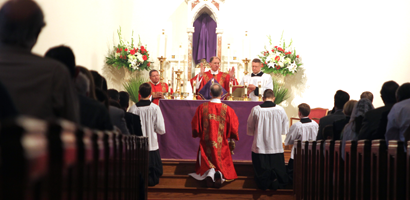
CHARLOTTE — Holy Week gives us the opportunity to draw nearer to Jesus Christ and His love for us, Bishop Peter Jugis preached at Palm Sunday Mass March 20.
The Palm, or Passion, Sunday Mass, with its palm-waving procession into church and the proclamation of the Passion gospel, is like “a retreat which the Church gives to us – an opportunity for a time away, to draw closer to Jesus,” Bishop Jugis said in his homily. “He wants us spiritually to be with Him, participating with Him as He is undergoing this ordeal – an ordeal, by the way, which He freely chooses. He wants us to go along with Him, because He wants us to be with Him,” he said.
Several hundred of people attended the Palm Sunday liturgy at St. Patrick Cathedral with the bishop, processing through the main door at the start of Mass. The main door of the cathedral, one of three pilgrimage sites in the Diocese of Charlotte for the Extraordinary Jubilee Year of Mercy, was decorated with palm fronds for the start of Holy Week.
In his homily, Bishop Jugis also explained why we kneel during the gospel reading on Palm Sunday. “At no other gospel, during the entire course of the year, do we kneel,” he noted.
We kneel at the moment recounting Jesus’ death on the cross, he explained, “to imagine that we ourselves are there, at His crucifixion … kneeling at the foot of the cross.
“We are begging for forgiveness of our sins, and maybe weeping interiorly for the ways we have so often offended the Lord, who has just suffered and died for us.”
Bishop Jugis continued, “Remember, all of this takes place because Jesus loves you.
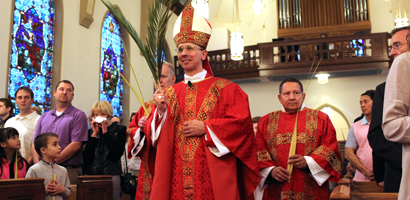 “In His betrayal and arrest in the Garden of Gethsemane, He allowed all that to happen because of His love for you. At His scourging, and then being mocked at the high priest’s house, He allowed all of that to happen because He loves you. At His trial before the Sanhedrin and then being yanked and sent over to Pontius Pilate, and then yanked from there by Pontius Pilate and sent over to King Herod, and then sent back to Pontius Pilate – back and forth, all of that humiliation – He underwent for love of you. His way of the cross and then crucifixion, with three hours of agony upon the cross, and finally His death, He chose as His own special way of showing His love for you.”
“In His betrayal and arrest in the Garden of Gethsemane, He allowed all that to happen because of His love for you. At His scourging, and then being mocked at the high priest’s house, He allowed all of that to happen because He loves you. At His trial before the Sanhedrin and then being yanked and sent over to Pontius Pilate, and then yanked from there by Pontius Pilate and sent over to King Herod, and then sent back to Pontius Pilate – back and forth, all of that humiliation – He underwent for love of you. His way of the cross and then crucifixion, with three hours of agony upon the cross, and finally His death, He chose as His own special way of showing His love for you.”
Jesus Himself said it with His dying words, “Father, forgive them, for they do not know what they do.” His suffering and death is all for the forgiveness of our sins, Bishop Jugis explained.
“As we enter now into this celebration of Holy Week, let us open our hearts to Jesus, and let us live in His love,” he prayed in conclusion, and let that love continue to transform us, so that we become more like Christ.
— Patricia L. Guilfoyle, editor
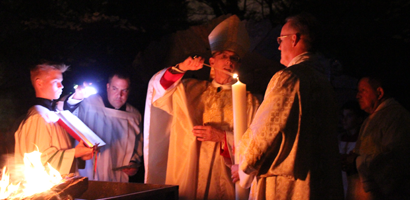
Jesus' resurrection is the source of our joy, Bishop Jugis preaches at Easter vigil
CHARLOTTE — “Let us all resolve to live joyfully our Easter faith in the Church.”
This was the message proclaimed by Bishop Peter Jugis March 26 as he celebrated the Easter vigil Mass at St. Patrick Cathedral, which was filled with young and old there at dusk to greet the Light of the World.
The liturgy began with the blessing of the Paschal fire and lighting of the Paschal candle at the Marian grotto outside the cathedral. Then the hundreds of faithful processed behind Bishop Jugis – candles in hand – through the cathedral’s flower-festooned Door of Mercy into the darkened cathedral to hear the Exsultet chanted by Deacon Brian McNulty.
After the Scripture readings and psalms, the cathedral’s lights were turned on and bells were rung as the faithful sang the Gloria.
“I wish each of you God’s blessings and peace, and especially that you will have Easter joy this day as we celebrate the resurrection of Jesus,” Bishop Jugis said in his homily, “and that this Easter joy, I pray, remain with you always.”
The fact that Jesus rose from the dead is the essential point of Christian joyfulness, he noted.
“Christianity is a joyful religion, because Jesus is risen from the dead. He is the source of our joy. He is our joy – by defeating sin, by defeating death, and rising from the dead.” Not only that, he said, but Christ “is our joy because we have a relationship with Him.”
Repeating a point from his Holy Thursday homily, Bishop Jugis reminded those present that Christianity is not about a concept or an idea.
“It’s that we have a relationship, through the family of the Church, with a living Person, the living Son of God, Jesus Christ, our Risen Savior,” he emphasized.
That gives us reason to be joyful, not only at Easter but always, he said.
Easter joy is particularly evident among the Church’s newest Catholics during this Easter season, Bishop Jugis noted, who “are beginning their new life in Christ.”
He welcomed four catechumens at the vigil Mass, giving them the sacraments of initiation – baptism, confirmation and Holy Communion.
Smiles among the four people and their sponsors and families, as well as among all of the parishioners, were evident as the Mass ended with everyone jubilantly singing the traditional Easter hymn: “Jesus Christ is risen today, Alleluia!”
— Patricia L. Guilfoyle, editor. Photos by John Cosmas, correspondent.
Bishop Jugis venerates cross, offers Good Friday liturgy March 25
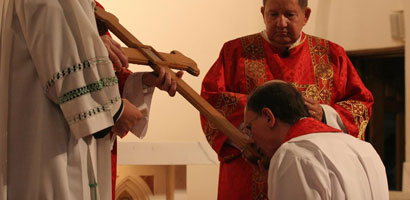 'Here we are at the foot of the cross'
'Here we are at the foot of the cross'
CHARLOTTE — In a somber, reflective Good Friday liturgy, Bishop Peter Jugis entered St. Patrick Cathedral and lay prostrate before the sanctuary steps, humbling himself before God and in the presence of the faithful. This annual service held at 3 p.m., the hour Jesus Christ expired on the cross, recalls the sacrifice of God's only begotten Son for the salvation of souls.
The liturgy began with the reading of The Passion narrated by Deacon Brian McNulty, with Deacon Carlos Medina as the voice, Bishop Jugis as Jesus and the congregation responding as the crowd. They took those gathered on the tortuous journey Christ suffered from the Garden of Gethsemane through His crucifixion on Golgatha.
"The reading of The Passion stirs up mixed emotions in our hearts," Bishop Jugis said during his homily. "For one thing our hearts are filled with sorrow as we participate in the reading of The Passion of Jesus, because we realize it is our sins which Jesus is taking upon Himself; taking upon Himself also all of the sorrow and all of the suffering that our sins cause.
Bishop Jugis explained that Our Lord does that in order to redeem us -- in order to remove the obstacle which stands between our relationship with us and almighty God.
"He is there in His passion, His suffering, His crucifixion -- He's there standing in our place. Standing there for us, taking upon Himself what really should be happening to us, because we, by our own sinfulness, really are the ones who should be suffering all of this.
"But Jesus, in His mercy takes this all upon Himself, the sins of the entire human race, of all time -- past, present and into the future. Yet we go on sinning knowing that He has taken all of our sin upon Himself along with its sorrow and suffering.
Bishop Jugis then asked the faithful, "Do we make a real effort to change our ways, or are we content to continue to heap the burdens upon Jesus?"
He also asked those gathered if they sought forgiveness of their sins as they knelt during the reading of The Passion, at the moment where Jesus dies on the cross.
"Here we are at the foot of the cross, looking into the face of our Redeemer, knowing that all of this was because of us and all of this is for us and our salvation."
He noted that as our hearts are filled with sorrow, they are also filled with sentiments of thanksgiving for Jesus' mercy and love.
"God has been merciful in not giving us what we deserve," Bishop Jugis explained. "Jesus is the mercy of the Father."
He enjoined those gathered to focus their attention on Jesus in a spirit of thanksgiving, rather than their sins and miseries. He acknowledged we are incapable of saving ourselves and it is more fruitful to focus on Jesus in a spirit of thanksgiving for His love and mercy.
Bishop Jugis shared that there are several invocations in the Litany of the Sacred Heart of Jesus that are appropriate for Good Friday which express the thanksgiving and hopefulness of God's people.
"Heart of Jesus, pierced with a lance, have mercy on us. Heart of Jesus, atonement for our sins, have mercy on us. Heart of Jesus, source of all consolation, have mercy on us. Heart of Jesus, our peace and reconciliation, have mercy on us. Heart of Jesus, our life and resurrection, have mercy on us. Heart of Jesus salvation of those who trust in you, have mercy on us."
The faithful came forward twice during the Good Friday liturgy -- first to venerate the cross as Bishop Jugis had done, and then to receive holy Communion. Even the smallest of children kissed the cross when held out to them for veneration.
Bishop Jugis noted in his closing remarks that as the body of Jesus was taken down from the cross, it was the Blessed Mother who received Him in her arms.
"Now, like Mary, let us also receive Jesus with deep love, devotion and gratitude for His mercy."
— SueAnn Howell, senior reporter
Photo gallery: The Way of the Cross
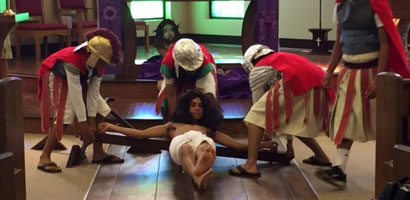 HAYESVILLE — At Immaculate Heart of Mary Mission during Holy Week, teenagers in the parish's religious education program dressed the parts of Roman soldiers, Veronica, Simon, the Weeping Women, Jesus and Mary in going through all 14 Stations of the Cross.
HAYESVILLE — At Immaculate Heart of Mary Mission during Holy Week, teenagers in the parish's religious education program dressed the parts of Roman soldiers, Veronica, Simon, the Weeping Women, Jesus and Mary in going through all 14 Stations of the Cross.
The special service, called the Living Way of the Cross, immersed everyone in the suffering Jesus bore for us. Sister Margarita Castaneda, CND, was instrumental in directing this prayerful event. Pictured is Station 11, after being stripped of his garments, Jesus in nailed to the cross. (Photo by Craig Allen, correspondent)
In the photo gallery below, view photos from the Stations of the Cross presentations by the fifth-graders in faith formation at St. Mark Church in Huntersville as well as by St. Mark School students.
Also included in the photo gallery are Stations of the Cross commemorations from Immaculate Conception Church in Hendersonville; Holy Spirit Church in Denver; Our Lady of the Highways Church in Thomasville; Our Lady of Guadalupe, St. Thomas Aquinas and St. Gabriel churches in Charlotte; Sacred Heart Church in Salisbury, St. Philip the Apostle Church in Statesville; and St. Aloysius Church in Hickory.
— Doreen Sugierski, Craig Allen, Joe Thornton, Romy Machicao, Bill Washington, Jose Sanchez and Jeanine Russell, correspondents; photos also provided by Capuchin Franciscan Father Martin Schratz, Amy Burger, John Cosmas and Connie Ries.
 Holy Thursday: Jesus tells us to love one another because His love dwells in us
Holy Thursday: Jesus tells us to love one another because His love dwells in us
CHARLOTTE — St. Patrick Cathedral was filled nearly to capacity Thursday evening as Bishop Peter Jugis celebrated the Mass of the Lord’s Supper. The liturgy marked the start of the Triduum, the three holy days preceding the Resurrection of the Lord at Easter.
The Mass of the Lord's Supper recalls Jesus' institution of the Eucharist at the Last Supper, His washing the feet of His disciples, His agony in the Garden of Gethsemane, and His betrayal and arrest.
When Jesus washed the feet of the Apostles, it was more than a physical act of humble service, Bishop Jugis noted during his homily. “More importantly,” he said, it was “about an interior washing.”
His disciples were focused on the earthly act, but Jesus was speaking on a heavenly level, he explained.
When Jesus told His disciples that they had been washed, He meant that “they had been cleansed by Jesus’ grace and His love – through the three years that they had been spending with Him, listening to His teaching and observing His miracles. Their hearts were now filled with Christ’s grace and love, which has acted as a purification of them – (it) has washed them clean.
 “He and His teaching have penetrated right into their hearts, and they have been transformed, become true disciples, through this interior washing.”
“He and His teaching have penetrated right into their hearts, and they have been transformed, become true disciples, through this interior washing.”
All of His disciples were graced except for Judas Iscariot, who was soon going to betray the Lord, Bishop Jugis noted. Jesus said as much with His words, “Not all are clean.”
Bishop Jugis also reflected on Jesus’ words to His disciples to “love one another as I have loved you.”
“Why does He say it’s a new commandment? What’s so new about it? After all, you can find that phrase even in the Old Testament law,” he said. “It’s new because you have been washed interiorly with Christ’s love and grace, and Christ is living within you. That’s what’s new!”
“It’s no longer just words: ‘love one another.’ But now, having been washed,” Bishop Jugis continued, Jesus is saying, “‘I am living within you.’ That makes it a new commandment, a new mandate.”
Jesus is instructing us to demonstrate Christian love, not simply human love, to others, he explained.
“That’s the essence of Christianity. It’s not just a religion of words. It’s a religion of a Person. A Person comes to live in your soul. You come to love a Person. You have a relationship with Him – not just with words or commandments, but with Jesus.
“That’s the newness of the new commandment: to love because He is within you.”
Bishop Jugis also reflected on the Holy Thursday liturgy as the institution of the Eucharist and of the priesthood.
Priests perpetuate Jesus’ ministry through the ages, he said, “to continue His interior cleansing of souls that takes place through the apostolic ministry of preaching His Word, teaching His commandments, celebrating the sacraments and shepherding the flock.”
“Where would we be without the ordained ministry?” especially in administering the sacraments of baptism, confession and Holy Communion, he said.
Baptism washes us clean, and the Eucharist continues to wash us with grace, nurturing us and enabling us to grow in holiness, he said.
 “You can’t have a Church without the priesthood and the Eucharist. They are two essential elements that Jesus instituted to make up His Church.”
“You can’t have a Church without the priesthood and the Eucharist. They are two essential elements that Jesus instituted to make up His Church.”
In conclusion, Bishop Jugis touched on the words of Jesus in the Gospel of John: “He loves them to the end.”
Jesus loves us even to the cross, the end, “because that is where the totality of Jesus’ self-giving love is going to be shown,” he said.
Jesus’ suffering and death on the cross is “the exclamation point” of His love for us, a love which was shown earlier at the Last Supper, when He instituted the priesthood and the Eucharist, Bishop Jugis said.
Those words encapsulate “a beautiful teaching in a few short lines from St. John’s Gospel, chapter 13, but so full of grace and meaning and love for each one of us now as we enter into the sacred Triduum.”
At the end of the Holy Thursday Mass, altars in every church were stripped bare, candles and lights were extinguished, and the Blessed Sacrament was transferred to a temporary altar of repose until Easter – outwardly demonstrating the sense of the Church's bereavement during the time of Christ's Passion and burial.
Catholics then spent time in Eucharistic Adoration, recalling Jesus' words to His sleepy disciples in the Garden of Gethsemane, "Could you not keep watch with Me for one hour?"
On Good Friday, no Mass is celebrated.
— Patricia L. Guilfoyle, editor. Photos featuring: Holy Spirit Church in Denver, St. Elizabeth Church in Boone, St. Thomas Aquinas Church in Charlotte, St. Mark Church in Huntersville, St. Ann Church in Charlotte, Sacred Heart Church in Salisbury and St. Gabriel Church in Charlotte. (Photos by Doreen Sugierski, Amber Mellon, Gretchen Filz, Amy Burger, Jose Sanchez, Bill Washington and SueAnn Howell)
Seven Church pilgrimage on Holy Thursday
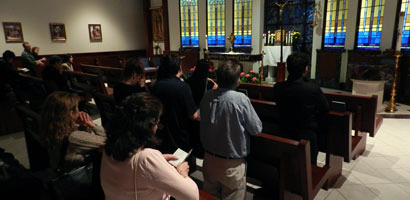 CHARLOTTE — Watch on the Diocese of Charlote's YouTube channel, this short video from Holy Thursday night: The Catholic News Herald's cameras followed correspondent Brandon Berryhill and a group of pilgrims as they made their way to seven churches around the city of Charlotte on Holy Thursday evening, "keeping watch" with Jesus before His coming Passion and death on the Cross. Berryhill said, "Why do we pilgrimage as Catholics? A Russian Orthodox novel 'The Pilgrim's Way' captures it beautifully.
CHARLOTTE — Watch on the Diocese of Charlote's YouTube channel, this short video from Holy Thursday night: The Catholic News Herald's cameras followed correspondent Brandon Berryhill and a group of pilgrims as they made their way to seven churches around the city of Charlotte on Holy Thursday evening, "keeping watch" with Jesus before His coming Passion and death on the Cross. Berryhill said, "Why do we pilgrimage as Catholics? A Russian Orthodox novel 'The Pilgrim's Way' captures it beautifully.
As we journey we experience God's love, providence and mercy to our eventual destination in this life and the next. Hopefully as we journey we discover the truth and fullness of eternity and Our Lord." The "Seven Churches pilgrimage" was first made popular by St. Philip Neri in Rome during the late 1500s. The pilgrimage consisted of visiting seven churches and their altar of repose, reflecting on the seven stops Jesus makes before picking up His cross and making His way to Calvary.
The seven stops were: Jesus in the Garden of Gethsemane (Lk 22:39-46); Jesus bound and taken before Annas (John 18:19-22); Jesus taken before the High Priest, Caiaphas (Mt 26:63-65); Jesus taken before Pilate (John 18:35-37); Jesus taken before Herod (Luke 23:8-9, 11); Jesus taken before Pilate again (Mt 27:22-26); Jesus given the crown of thorns and led to His crucifixion (Mt 27:27-31).
"It was a joyful night as we began with the liturgy of Our Lord's Supper at St. Matthew's in south Charlotte. From there we processed into the gymnasium and began our prayerful journey with Our Lord and Mary as our guide," Berryhill remembered. The pilgrimage then continued to St. Vincent de Paul Church on Park Road, where they were joined by the rest of the pilgrims, including Father Casey Coleman, parochial vicar at St. Vincent de Paul. All 14 pilgrims then went to St. Ann Church, St. Gabriel Church, St. Patrick Cathedral and Our Lady of Guadalupe Church. The seventh and final stop on the pilgrimage was St. Joseph Vietnamese Church, "where we made it exactly at midnight (closing time)," Berryhill said.
"Thanks to a kind parishioner who was closing up, he gave us an additional 20 minutes, fulfilling the expectations I have of the great people of that parish and our diocese as all along our journey the people were a blessing – including others who were enjoying this same pilgrimage from different parishes."
— Rico DeSilva, Catholic News Herald. Photos by Brandon Berryhill, correspondent
Why do we pilgrimage as Catholics?
A Russian Orthodox novel "The Pilgrim's Way" captures it beautifully. As we journey we experience God's love, providence and mercy to our eventual destination in this life and the next. Hopefully as we journey we discover the truth and fullness of eternity and our Lord.
On Holy Thursday as Catholics we did just that as we made a pilgrimage, first made popular by St. Phillip Neri in Rome. This pilgrimage consisted of visiting 7 different churches and their altar of repose reflecting on the 7 stops Jesus makes before picking up his cross and making his way to Calvary.
It was a joyful night as we began with the liturgy of Our Lord's Supper at St. Matthew's in South Charlotte. From there we processed into the gymnasium and began our prayerful journey with our Lord and Mary as our guide.
From there we went to St. Vincent de Paul where Father Casey Coleman and others joined us, continuing we went to St. Ann, St. Gabriel, St. Patrick Cathedral, Our Lady of Guadalupe and finishing at St. Joseph Vietnamese where we made it exactly at midnight, which was closing time.
Thanks to a kind parishioner who was closing up he gave us an additional 20 minutes, fulfilling the expectations I have of the great people of that parish and our diocese as all along our journey the people were a blessing including others who were enjoying this same pilgrimage from different parishes.
May God continue to bless our diocese and may we continue our pilgrim's path to our Lord through the many great experiences we can have right here in our own backyard.
— Brandon Berryhill
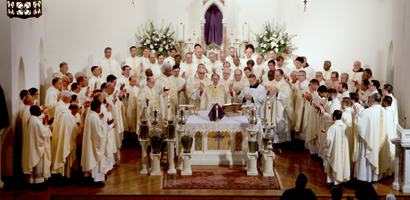
CHARLOTTE — Bishop Peter Jugis took special care during this Jubilee Year of Mercy in the Church to emphasize unity during his homily at the annual Chrism Mass at St. Patrick Cathedral. More than 90 priests from around the Diocese of Charlotte attended the Mass on a fine spring day, renewing their priestly promises to Holy Mother Church and their bishop.
Bishop Jugis addressed his brother priests during his remarks, reminding them that there is unity in Christ.
“This coming together as brother priests at the Chrism Mass especially demonstrates in a very visible way the unity of the priesthood in Christ. No matter where we serve in the diocese, wherever we exercise our priestly ministry in many different locations, when we come to this Chrism Mass, we see again what we knew all along – even though we may be separated geographically by the distance of miles – we see once again made manifest that we are all brothers in one priesthood and are united as one,” he reminded them.
Bishop Jugis stressed to them, as Jesus did to His disciples that, “‘You are all brothers!’ How true this is of the priesthood…What is it that unites us as brothers? The grace of the sacrament of holy orders. There are nearly 100 men here today who go by the same name, 'alter Christus.' We all have the same name. How’s that for unity?
“Our love for Jesus Christ unites us as brothers, our love for the priesthood unites us as brothers. Our love for the Church unites us as brothers. Our love for the work of salvation unites us as brothers. Our love for each other – our love for each other – unites us as brothers. ‘You are all brothers,' Jesus tells us.”
Bishop Jugis addressed how "our old enemy" original sin has left divisive tendencies in the human heart, a tendency to separate from one another.
“The remedy we know for all of those tendencies that original sin has left behind in us, the remedy is love. There can be no true unity without unconditional mutual love, and the readiness to serve each other generously and an ability to forgive up to seventy times seven.”
He explained that priests are all brothers in the priesthood because they are all brothers of Christ first and foremost.
“What a great name for a religious order. Brothers of Christ. And in fact it is the name of a religious order. It is a description of the order of the priesthood.”
Bishop Jugis emphasized that every day priests pray to remain deeply united to Jesus when they celebrate Mass, and especially before they receive Holy Communion, praying to be always faithful to the commandments and to never be separated from Christ.
“He is the source of our unity, our brother Christ. It is a very special relationship we have with the Lord to not only call Him Master and Teacher, Savior, Redeemer, but our brother in the priesthood.”
Before renewing their priestly promises, Bishop Jugis recalled that he and the priests gathered exercise their ministry in a divided, quarrelsome American society, but the Chrism Mass manifests what is always present among them – that although the society is quarrelsome and divided, he and his brother priests see unity in Christ the High Priest as His brother priests.
Concelebrating the Chrism Mass were Benedictine Abbot Placid Solari of Belmont Abbey; Monsignor Mauricio West, vicar general and chancellor of the diocese; Father John Putnam, judicial vicar of the diocese; and 97 more diocesan and religious order priests who gathered around the altar for the Liturgy of the Eucharist.
All the priests also stood during the blessing of the sacred chrism with hands outstretched, joining with Bishop Jugis in prayer as he performed the blessing rite.
The oils blessed during the chrism Mass are used in the sacraments of baptism, confirmation, anointing of the sick, as well as for ordination of priests and the consecration of churches.
Bishop Jugis stirred balsam into the chrism to give it a sweet perfume and breathed the "breath of the Holy Spirit" over the chrism.
In his final remarks before the conclusion of the Chrism Mass, Bishop Jugis shared that there is an increased interest among young people in the diocese for the priesthood and religious life, and he encouraged the priests and all gathered to promote vocations.
“The college seminary is our response to increased interest in that age group. I ask you to please continue to talk about the priesthood and the consecrated life to the young people in your faith formation classes and in your youth ministry programs, because that personal contact makes all the difference when a young person is considering special service to the Church,” he concluded.
After Mass, deacons divided the blessed oils into smaller oil stocks that will be distributed to all 92 parishes and missions across the diocese for use in sacramental celebrations throughout the upcoming year.
-- SueAnn Howell, senior reporter
VIDEO: St. Matthew Church celebrates Polish Palm Sunday Mass
CHARLOTTE — Watch this short video about a Palm Sunday Polish Mass celebrated March 20 at St. Matthew Church in Charlotte.
Father Andrzej Jaczewski from the Diocese of Siedlce, Poland, offered the Mass. The event was a culmination of a Polish Lenten retreat led by Father Jaczewski and held at that parish March 16-18.
Children from the Polish community wearing their national Polish custom dress led the procession carrying the palms.
Close to 300 members from the Polish community in the Charlotte region attended the liturgy.
—Rico De Silva, Catholic News Herald
Draw closer to Jesus this Holy Week, Bishop Jugis preaches on Palm Sunday
 CHARLOTTE — Holy Week gives us the opportunity to draw nearer to Jesus Christ and His love for us, Bishop Peter Jugis preached at Palm Sunday Mass March 20.
CHARLOTTE — Holy Week gives us the opportunity to draw nearer to Jesus Christ and His love for us, Bishop Peter Jugis preached at Palm Sunday Mass March 20.
The Palm, or Passion, Sunday Mass, with its palm-waving procession into church and the proclamation of the Passion gospel, is like “a retreat which the Church gives to us – an opportunity for a time away, to draw closer to Jesus,” Bishop Jugis said in his homily. “He wants us spiritually to be with Him, participating with Him as He is undergoing this ordeal – an ordeal, by the way, which He freely chooses. He wants us to go along with Him, because He wants us to be with Him,” he said.
Several hundred of people attended the Palm Sunday liturgy at St. Patrick Cathedral with the bishop, processing through the main door at the start of Mass. The main door of the cathedral, one of three pilgrimage sites in the Diocese of Charlotte for the Extraordinary Jubilee Year of Mercy, was decorated with palm fronds for the start of Holy Week.
In his homily, Bishop Jugis also explained why we kneel during the gospel reading on Palm Sunday. “At no other gospel, during the entire course of the year, do we kneel,” he noted.
We kneel at the moment recounting Jesus’ death on the cross, he explained, “to imagine that we ourselves are there, at His crucifixion … kneeling at the foot of the cross.
“We are begging for forgiveness of our sins, and maybe weeping interiorly for the ways we have so often offended the Lord, who has just suffered and died for us.”
Bishop Jugis continued, “Remember, all of this takes place because Jesus loves you.
 “In His betrayal and arrest in the Garden of Gethsemane, He allowed all that to happen because of His love for you. At His scourging, and then being mocked at the high priest’s house, He allowed all of that to happen because He loves you. At His trial before the Sanhedrin and then being yanked and sent over to Pontius Pilate, and then yanked from there by Pontius Pilate and sent over to King Herod, and then sent back to Pontius Pilate – back and forth, all of that humiliation – He underwent for love of you. His way of the cross and then crucifixion, with three hours of agony upon the cross, and finally His death, He chose as His own special way of showing His love for you.”
“In His betrayal and arrest in the Garden of Gethsemane, He allowed all that to happen because of His love for you. At His scourging, and then being mocked at the high priest’s house, He allowed all of that to happen because He loves you. At His trial before the Sanhedrin and then being yanked and sent over to Pontius Pilate, and then yanked from there by Pontius Pilate and sent over to King Herod, and then sent back to Pontius Pilate – back and forth, all of that humiliation – He underwent for love of you. His way of the cross and then crucifixion, with three hours of agony upon the cross, and finally His death, He chose as His own special way of showing His love for you.”
Jesus Himself said it with His dying words, “Father, forgive them, for they do not know what they do.” His suffering and death is all for the forgiveness of our sins, Bishop Jugis explained.
“As we enter now into this celebration of Holy Week, let us open our hearts to Jesus, and let us live in His love,” he prayed in conclusion, and let that love continue to transform us, so that we become more like Christ.
— Patricia L. Guilfoyle, editor
PHOTO GALLERY: Palm Sunday
Palm Sunday begins the start of Holy Week. Parishioners across the Diocese of Charlotte took part in processions for the start of the Palm Sunday liturgy March 20. Pictured are photos from St. Patrick Cathedral and St. Ann Church in Charlotte, Divine Redeemer Church in Boonville, St. Mary Help of Christians Church in Shelby, and Holy Spirit Church in Denver. (Photos by Patricia Guilfoyle, SueAnn Howell, Sergio Lopez, Giuliana Polinari Riley and Doreen Sugierski | Catholic News Herald)


